Here’s a 20 second video, giving an impressionistic picture of the blizzard hitting NYC today. I created it from a single photo that I put thru a series of progressive transformations.
13 Ways of Looking at a Redtail
I never much liked Wally Stevens’ poetry, but, hell, I’m not above stealing a good title!
Walking in Riverside Park yesterday I sited a redtail, and snapped a photo of her (him? them?). Interestingly, New York has one of the highest densities of raptors in the US. Lots of squirrels and rats to eat, I guess. Anyway, here are 13 ways of looking at that redtail…
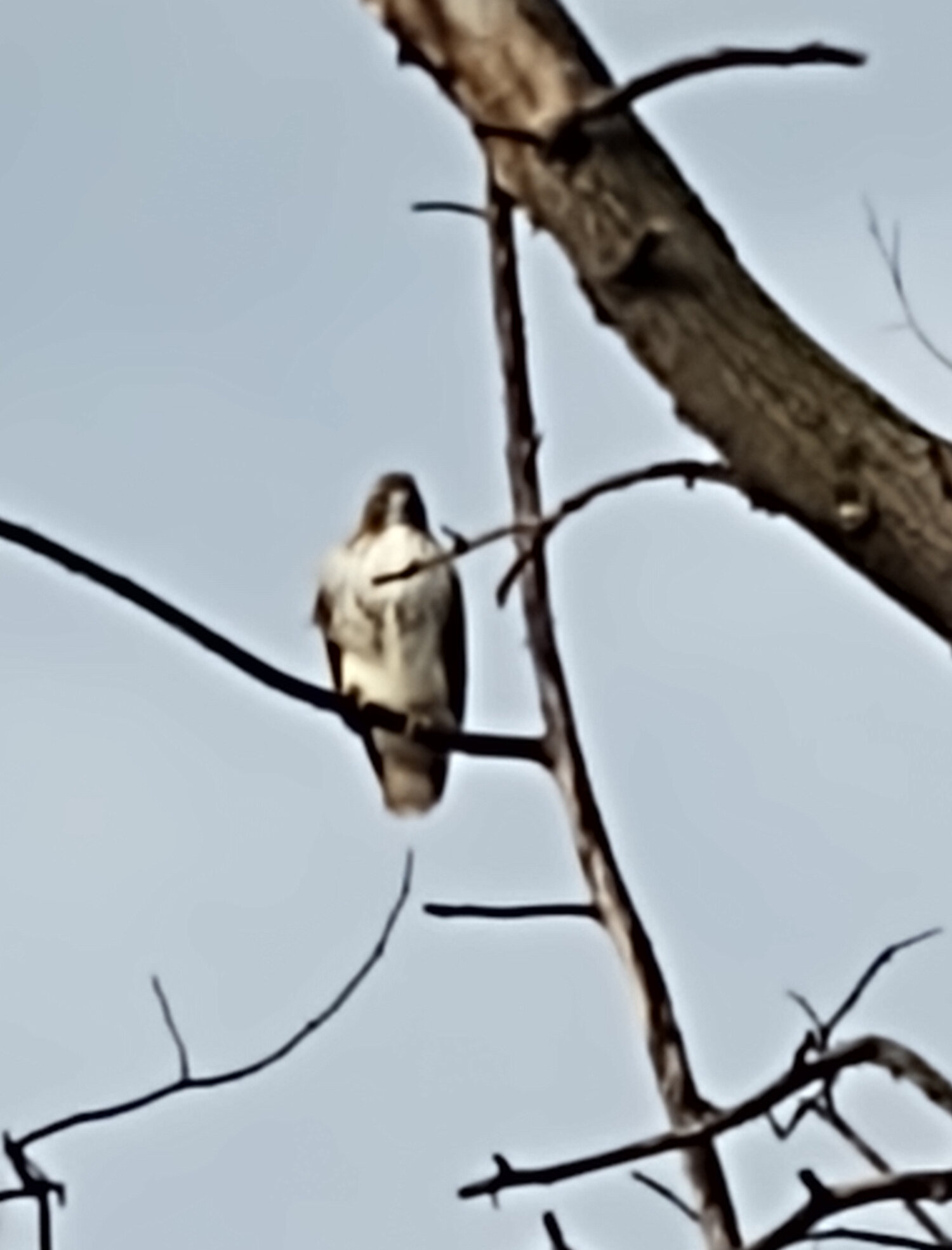
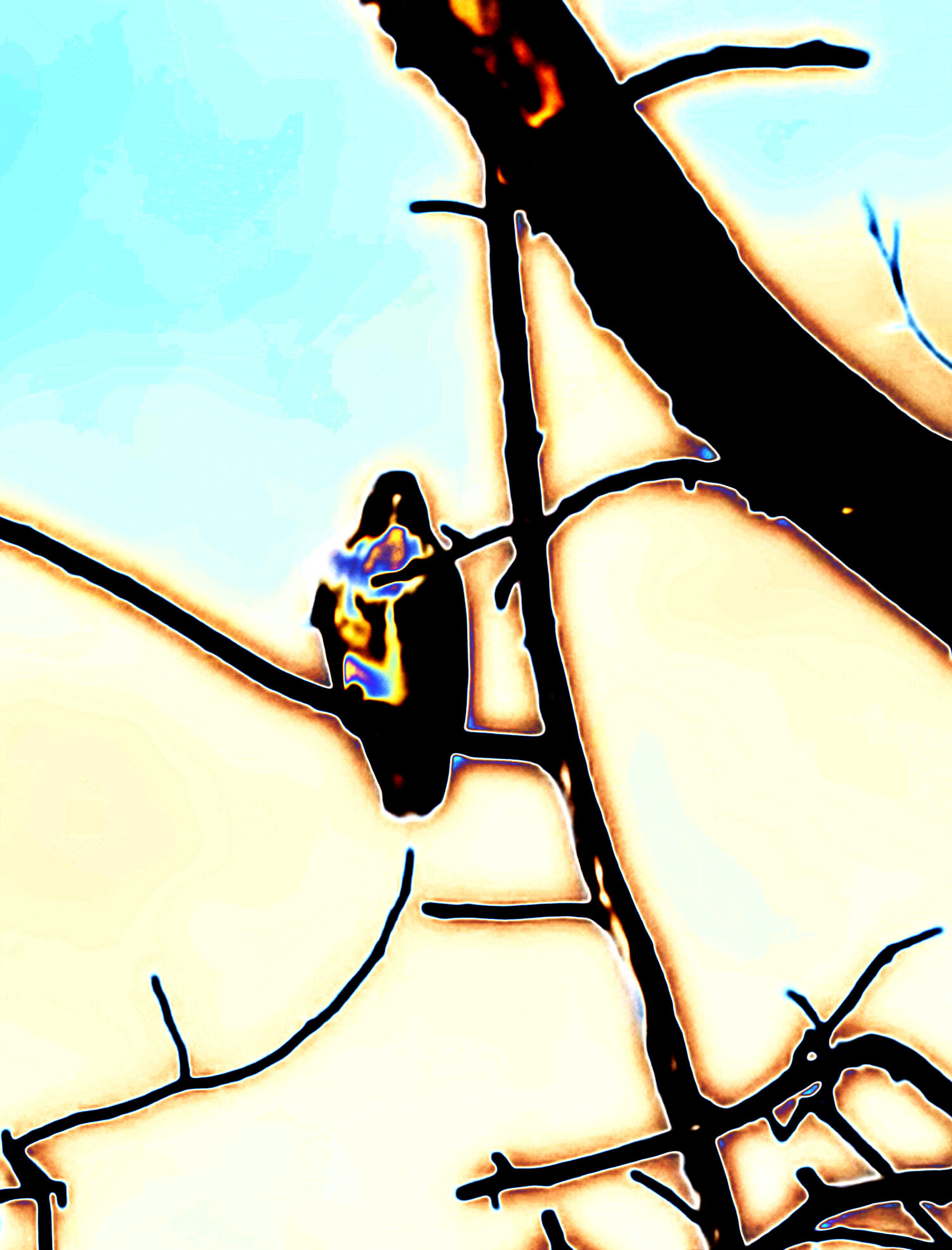
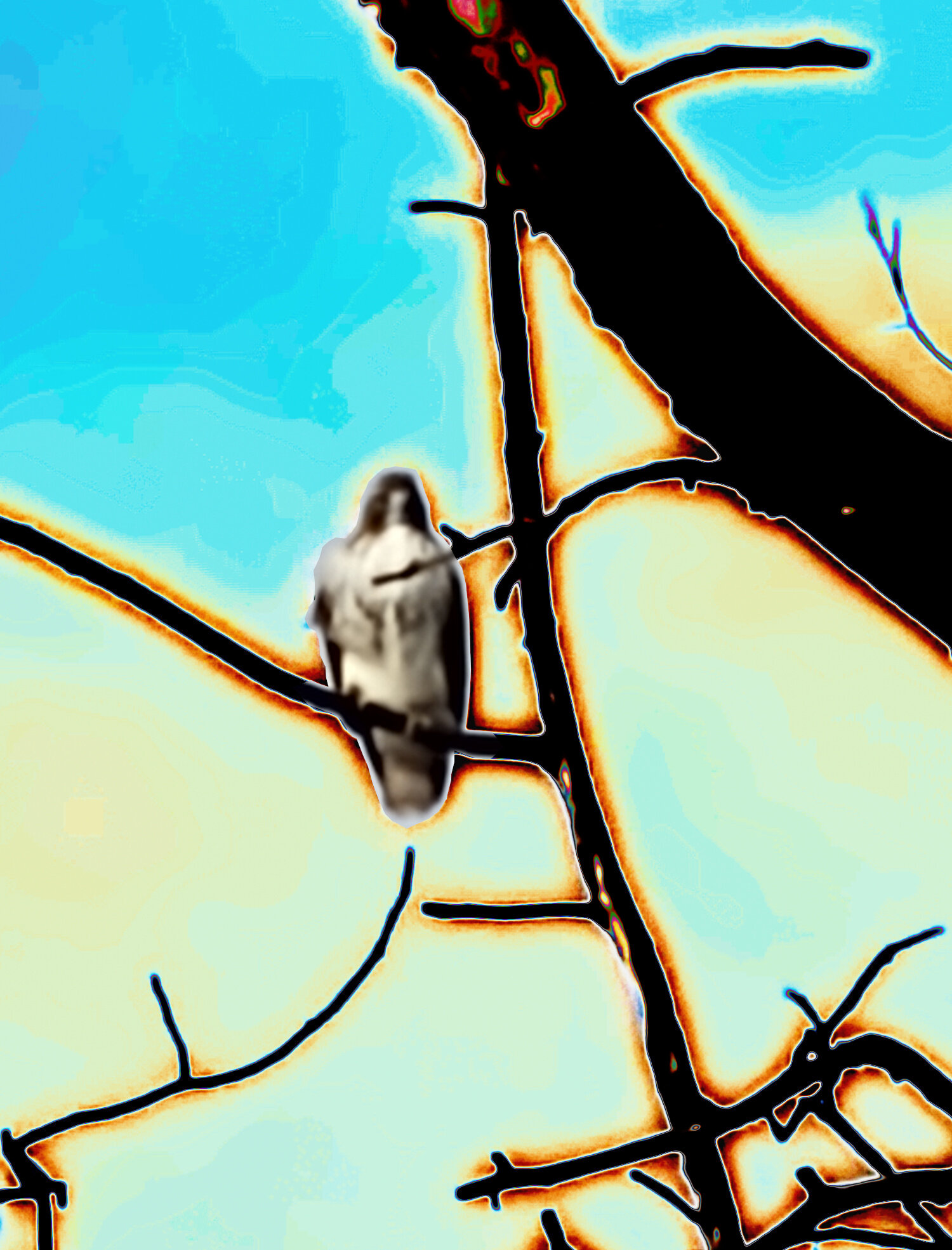
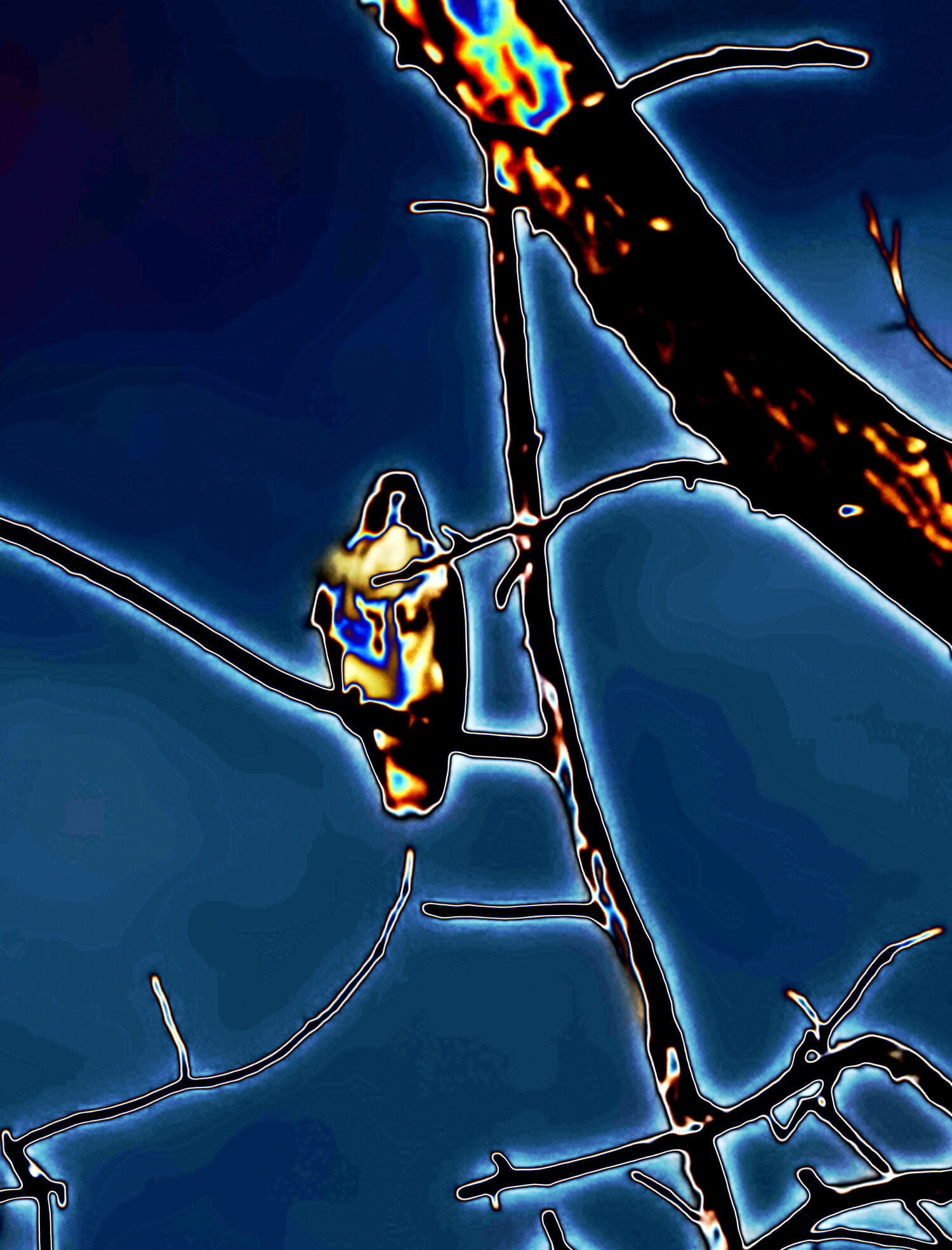
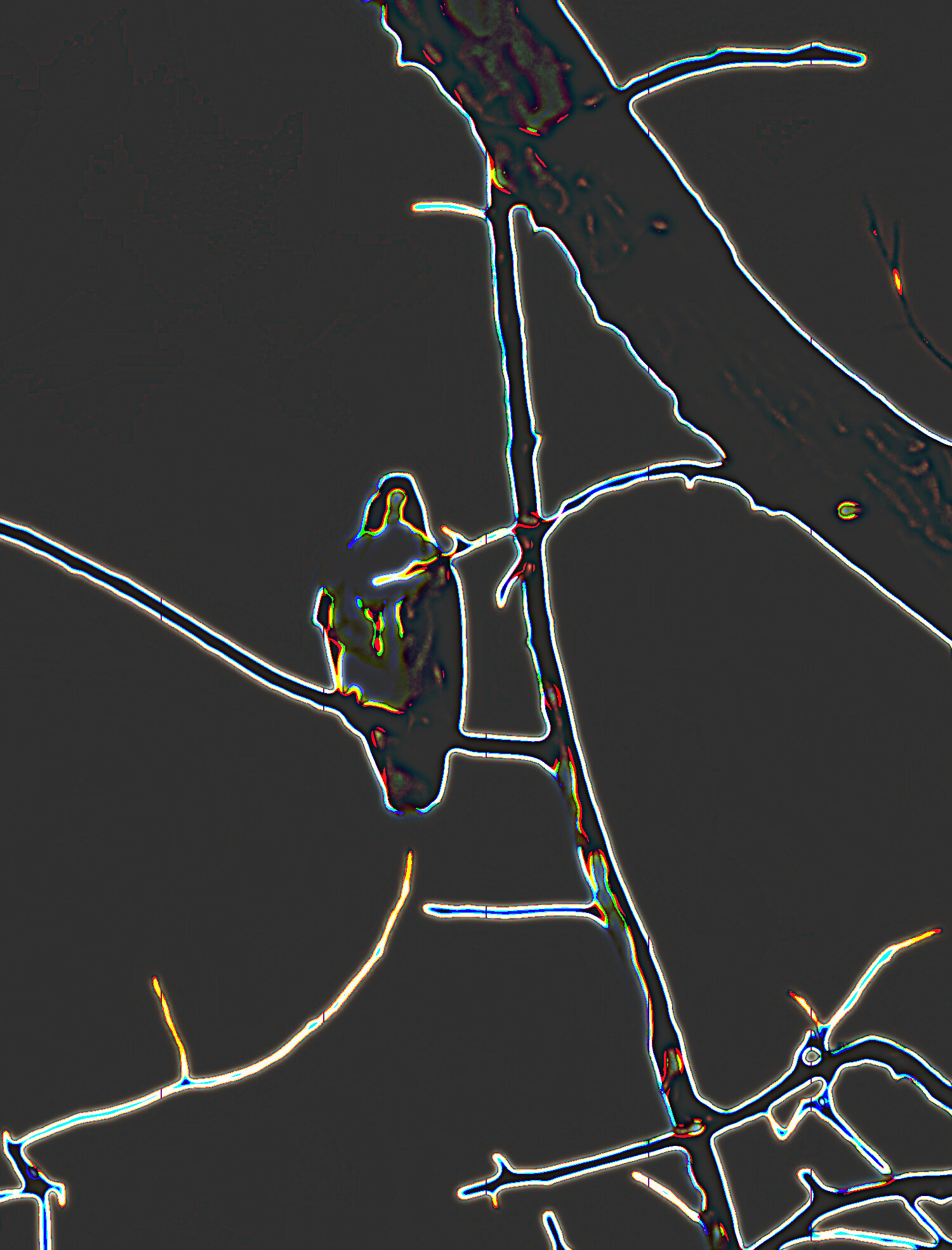
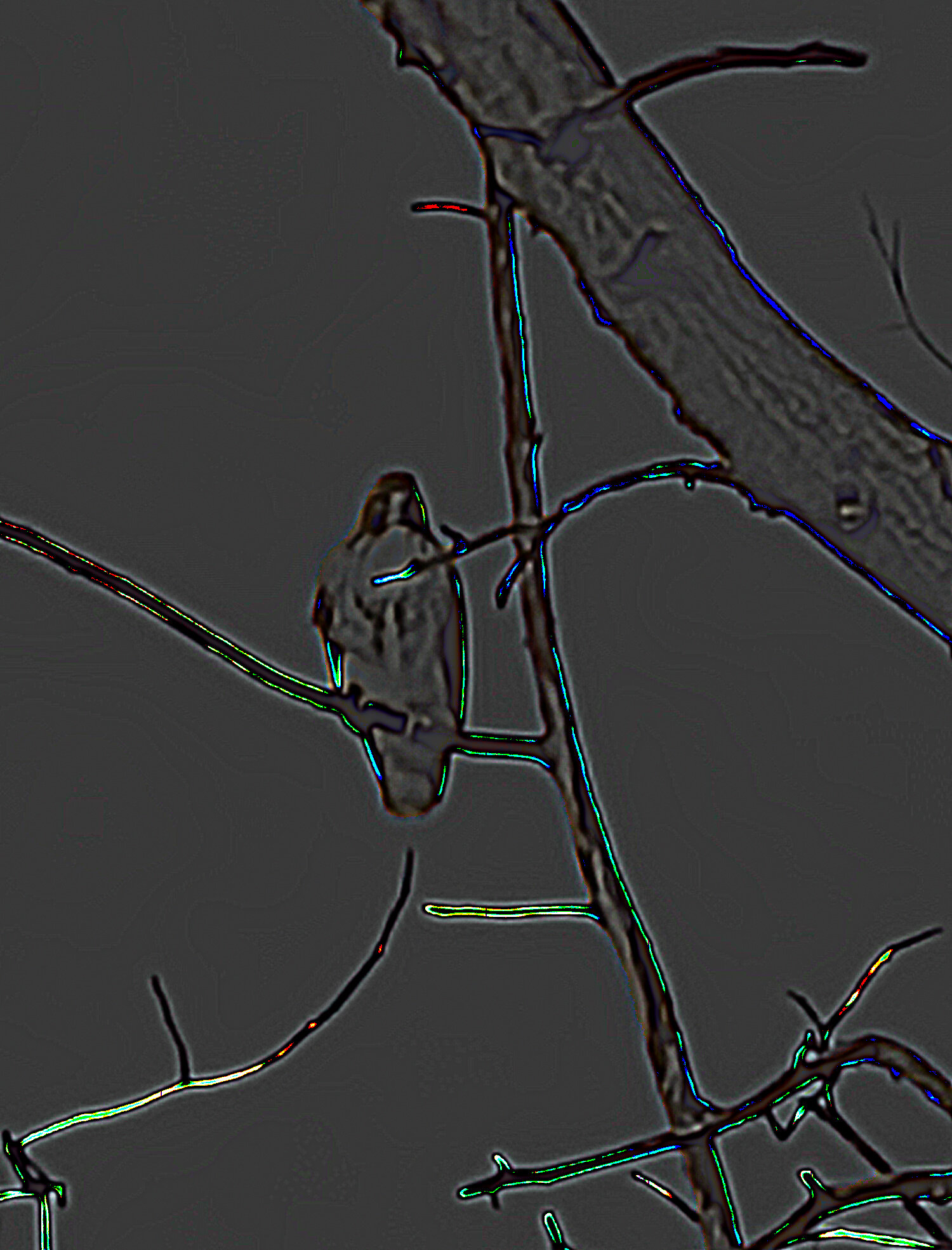
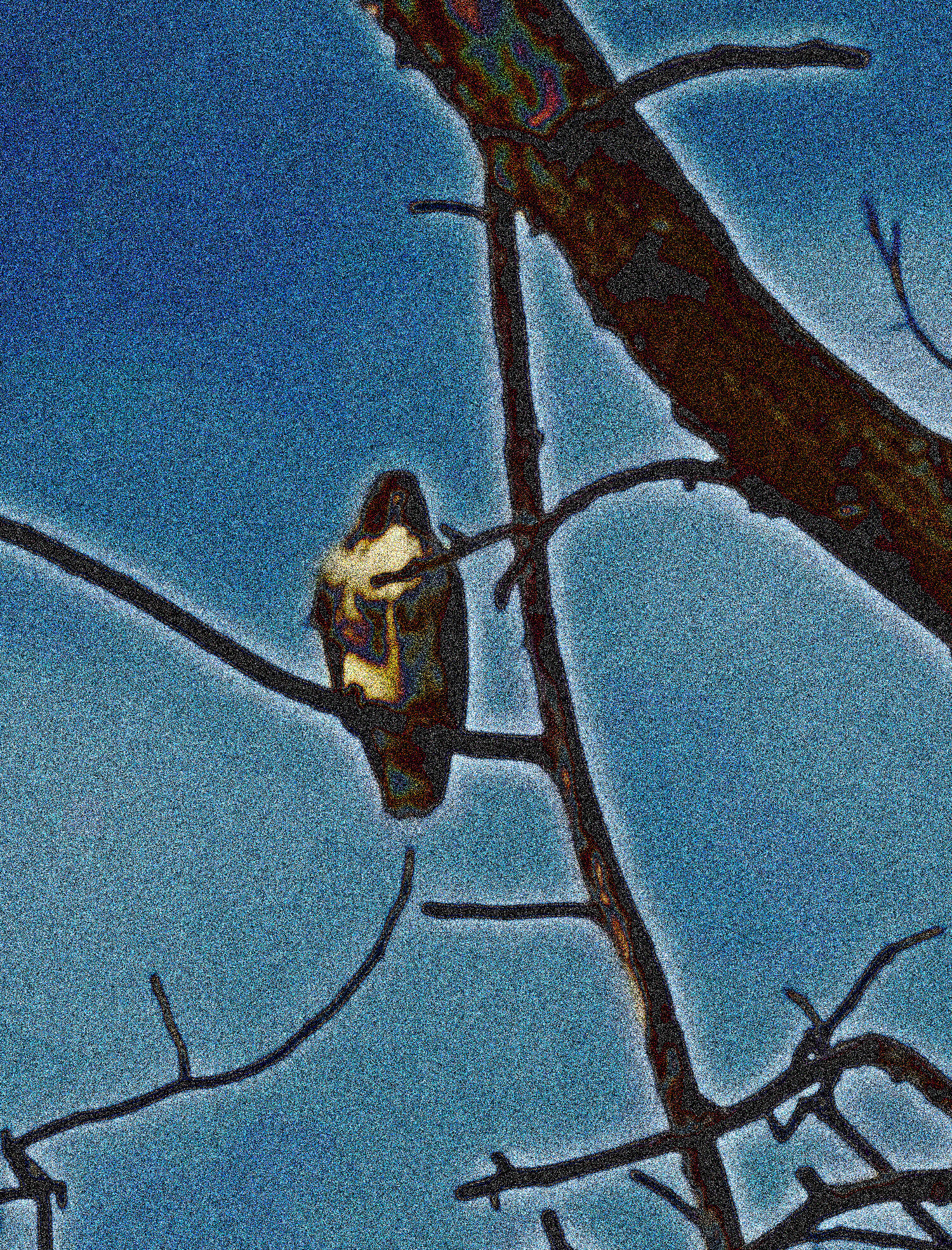
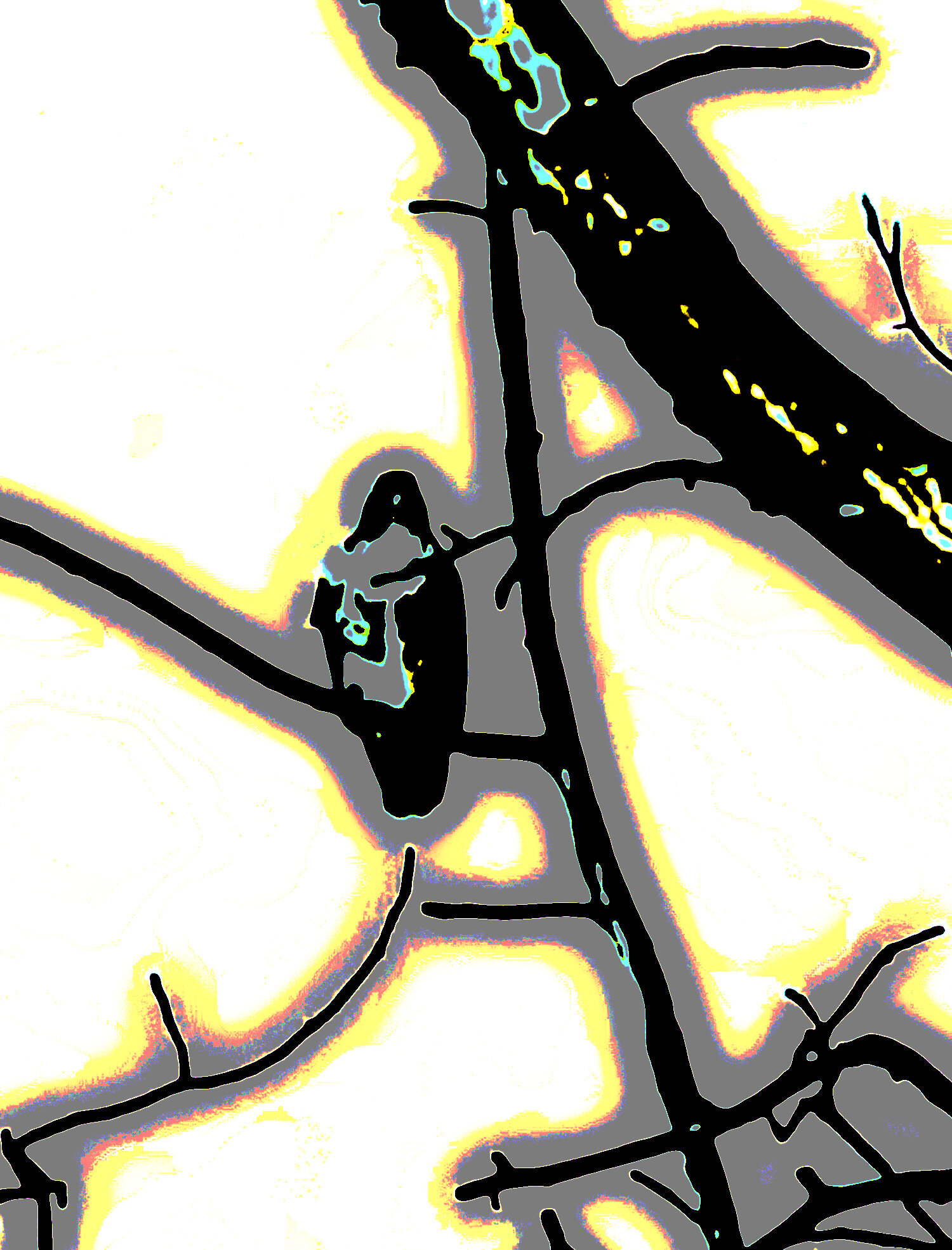
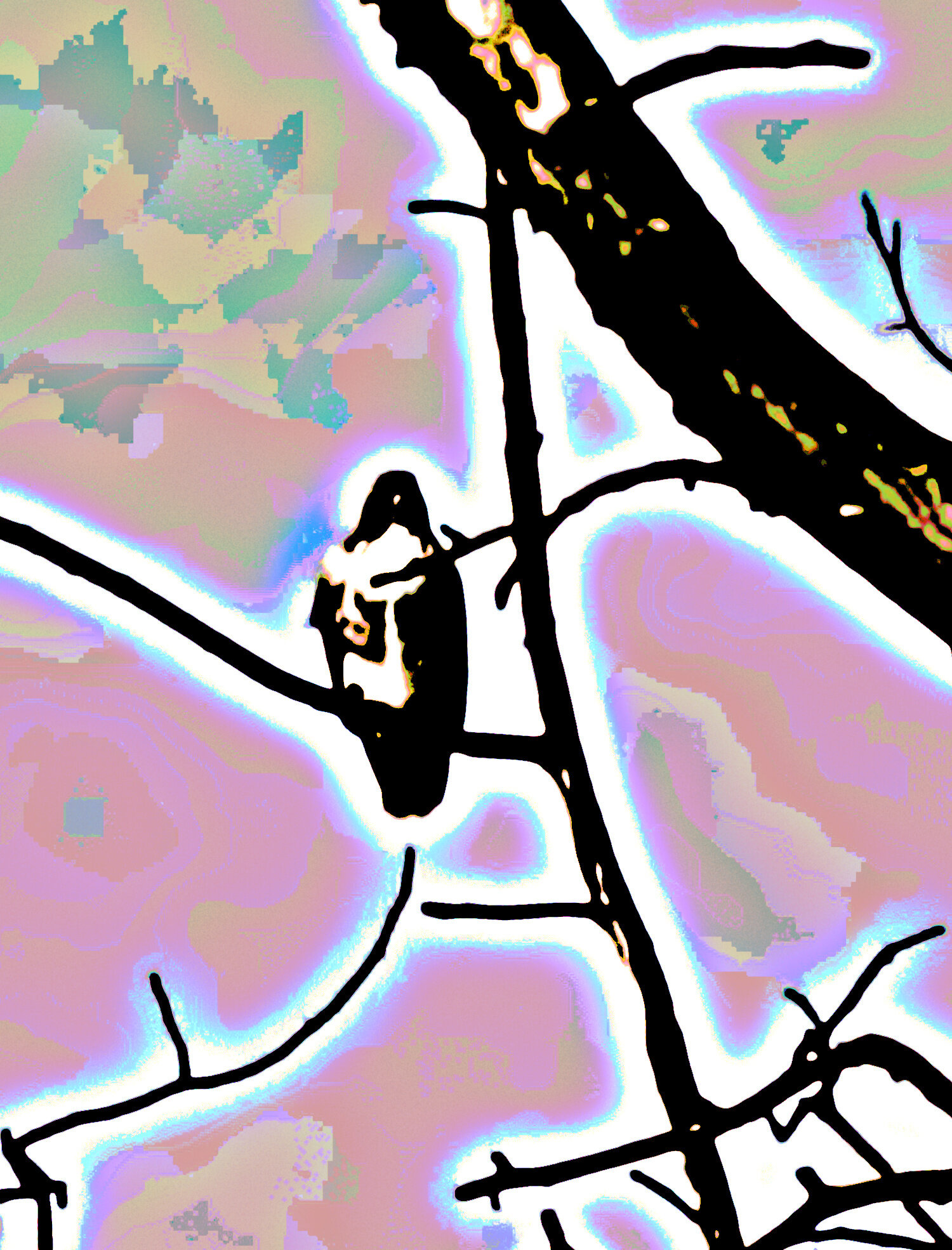
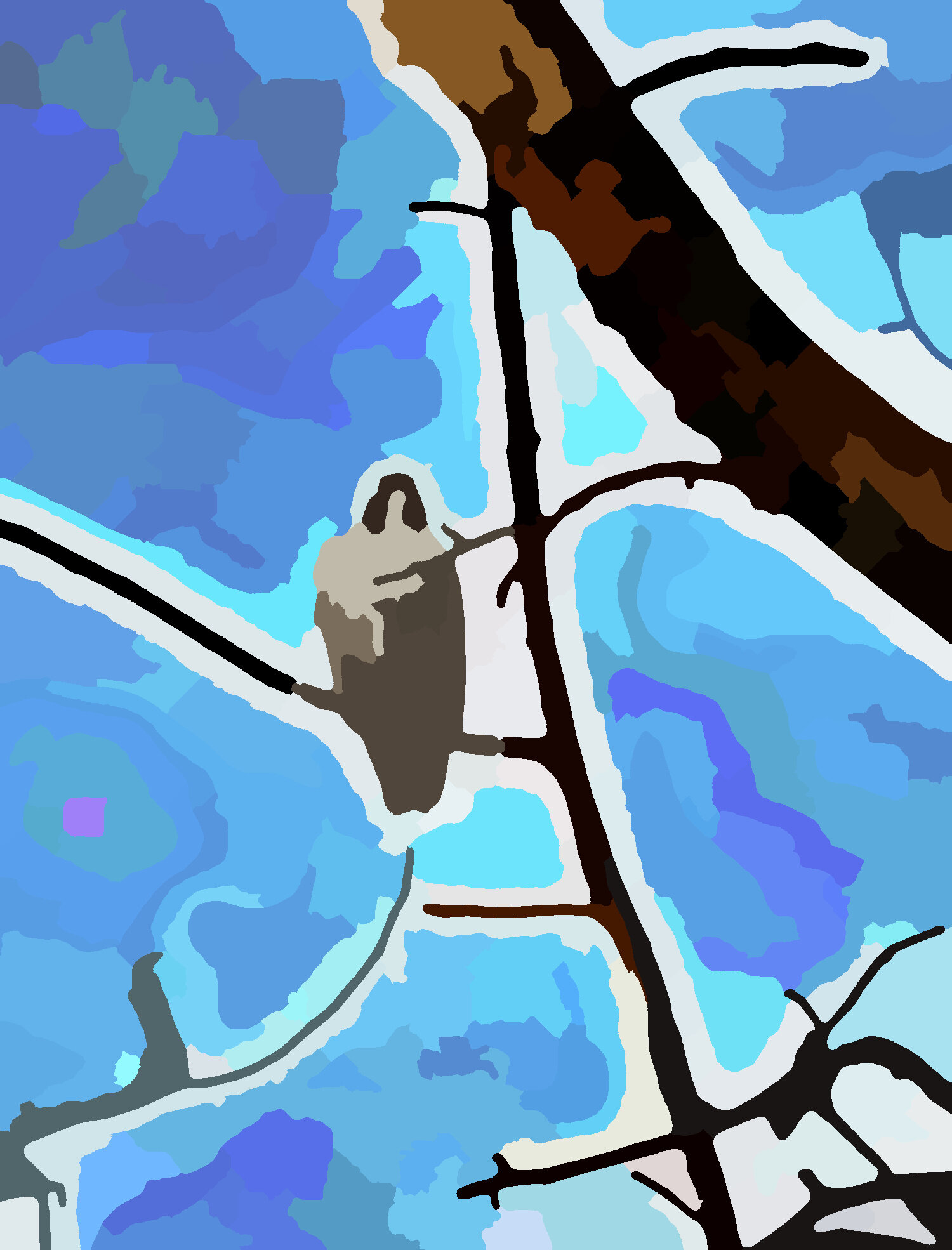
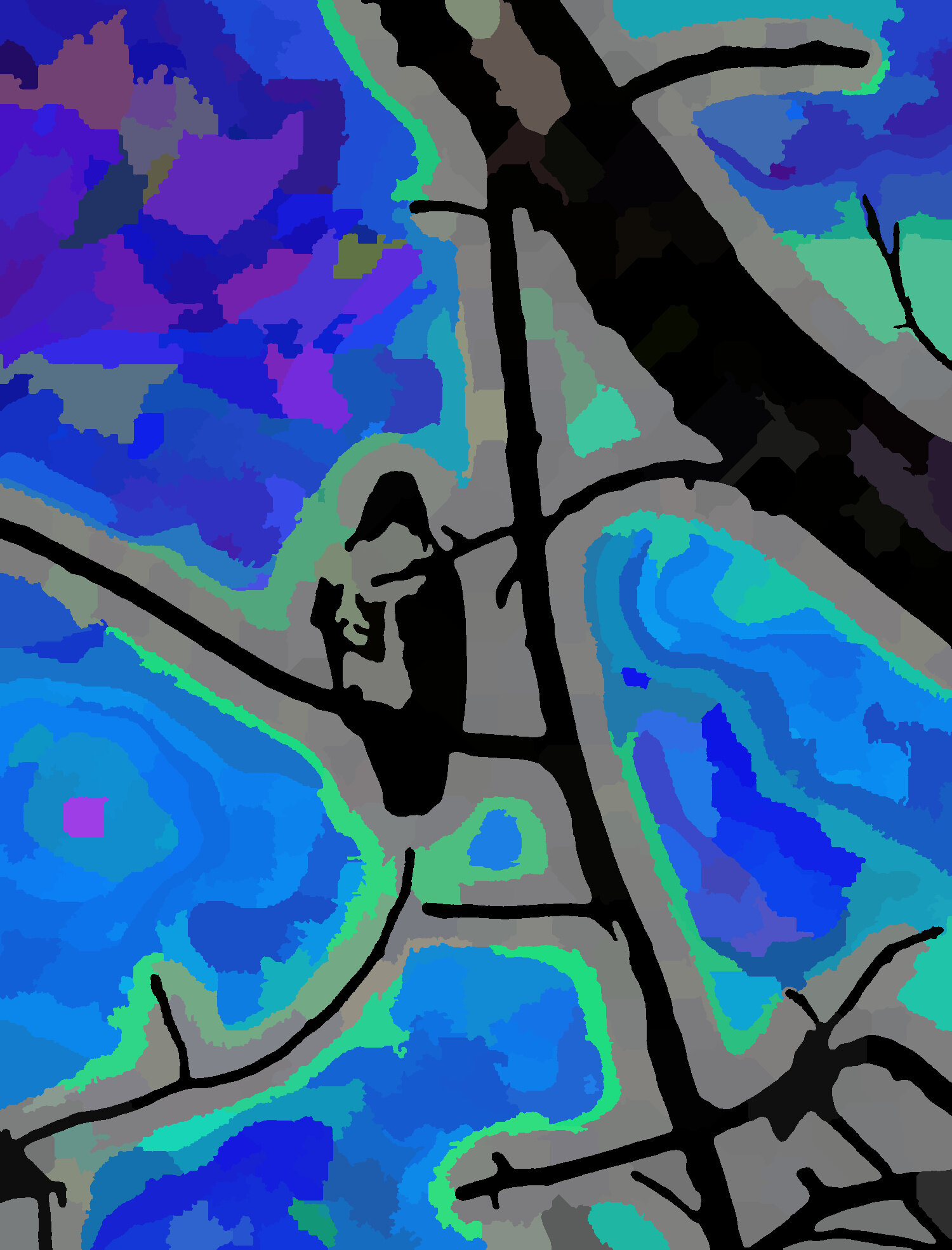
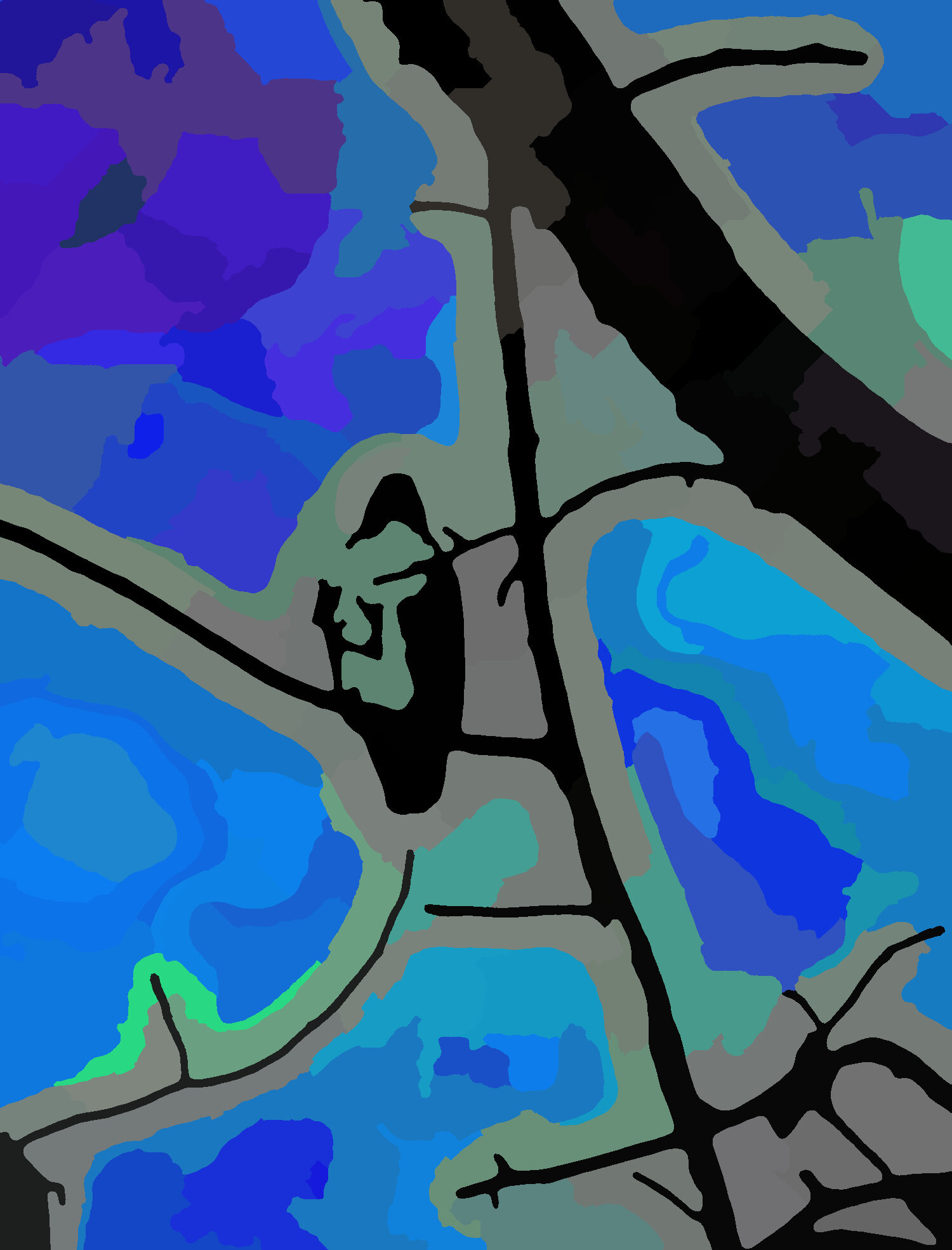
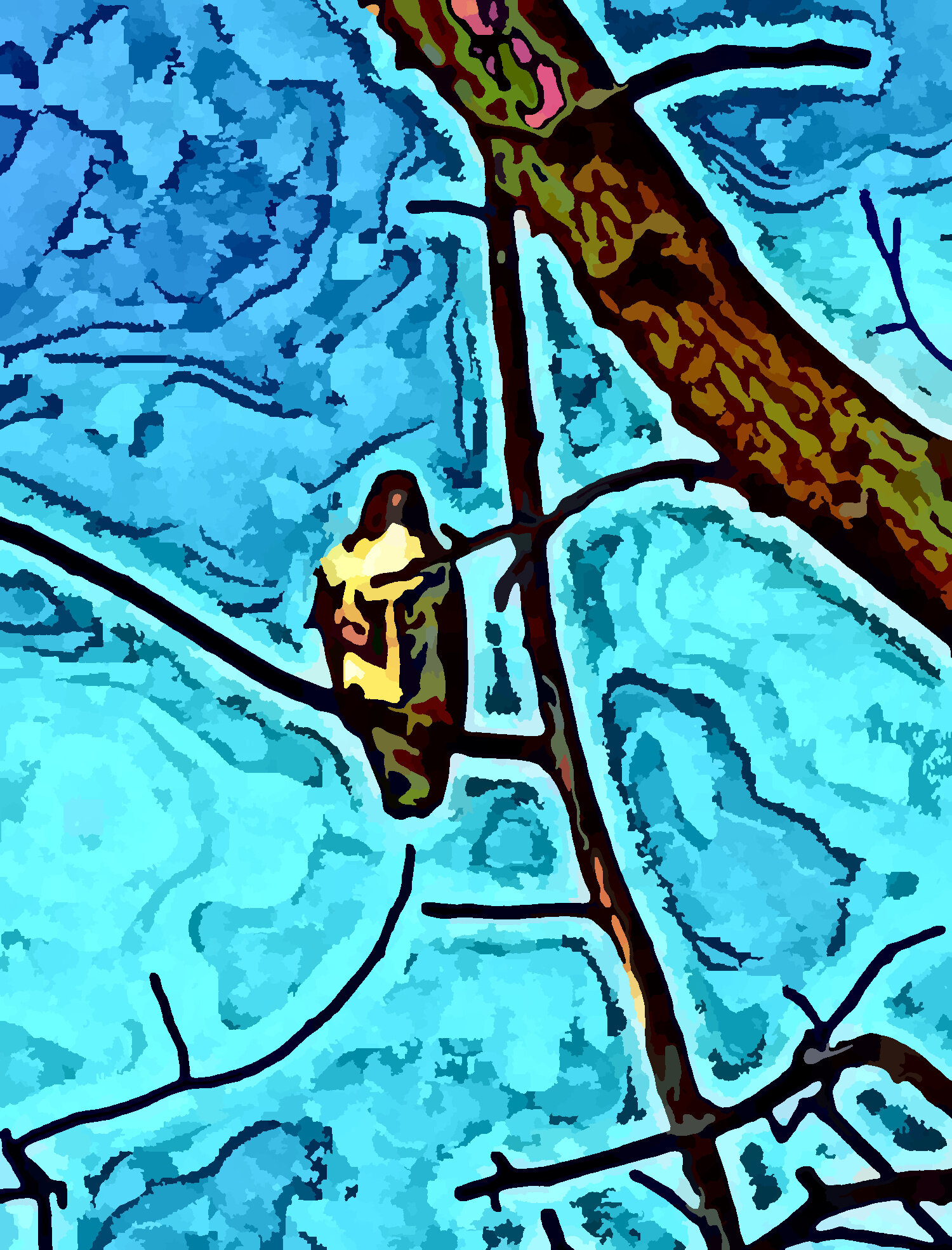
A portrait study
I was skyping the other day and I guess the person onscreen was in a bright light: his face was totally washed out. I took a screen shot, which turned out to have a strong blue shading, and from that I worked up this series of transformations. FYI, they are not presented here in the order in which they were produced. This is not a chronological development of the image, but I did try to present a sort of visual narrative in this ordering.
Always glad to get your feedback, critical or otherwise…
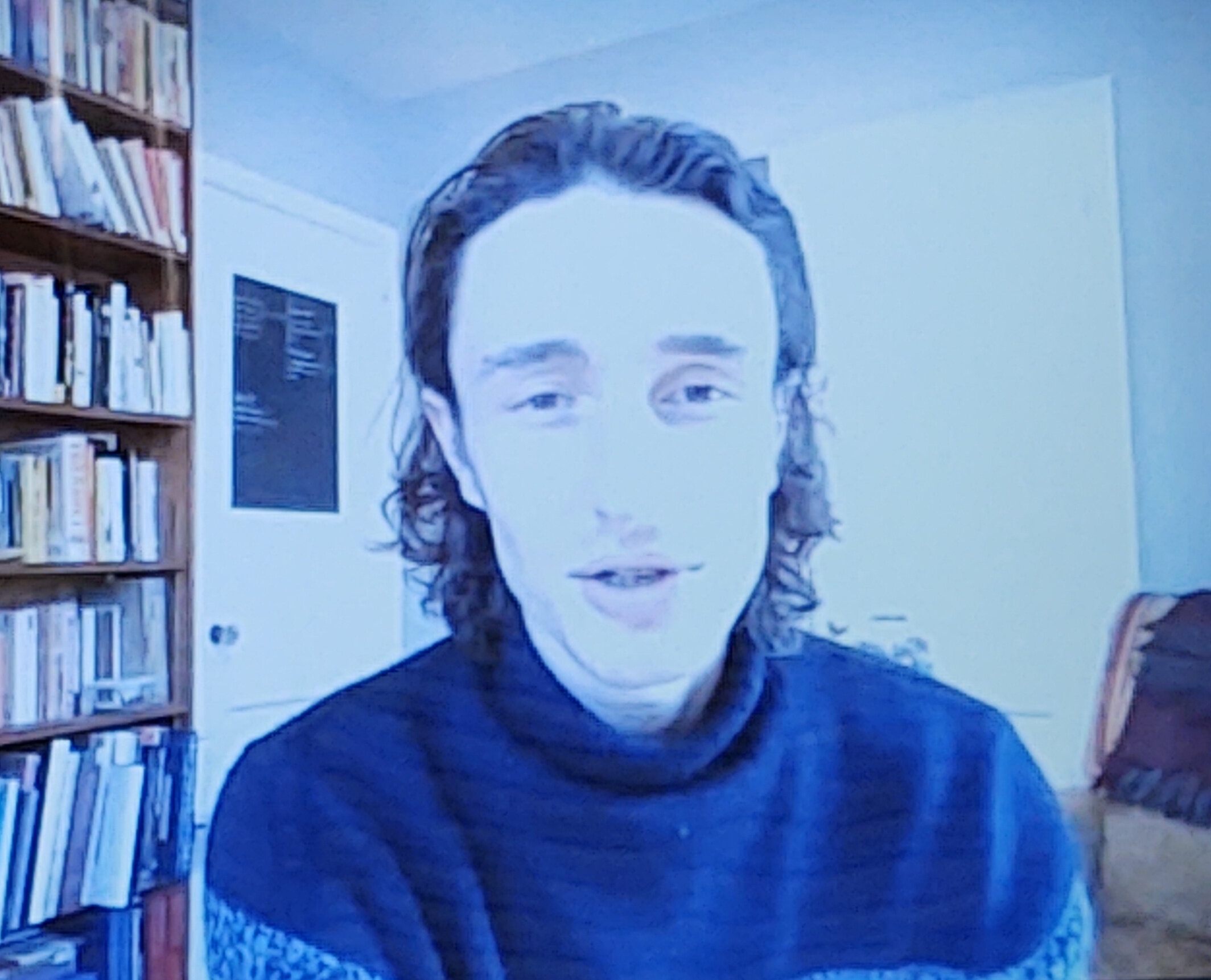
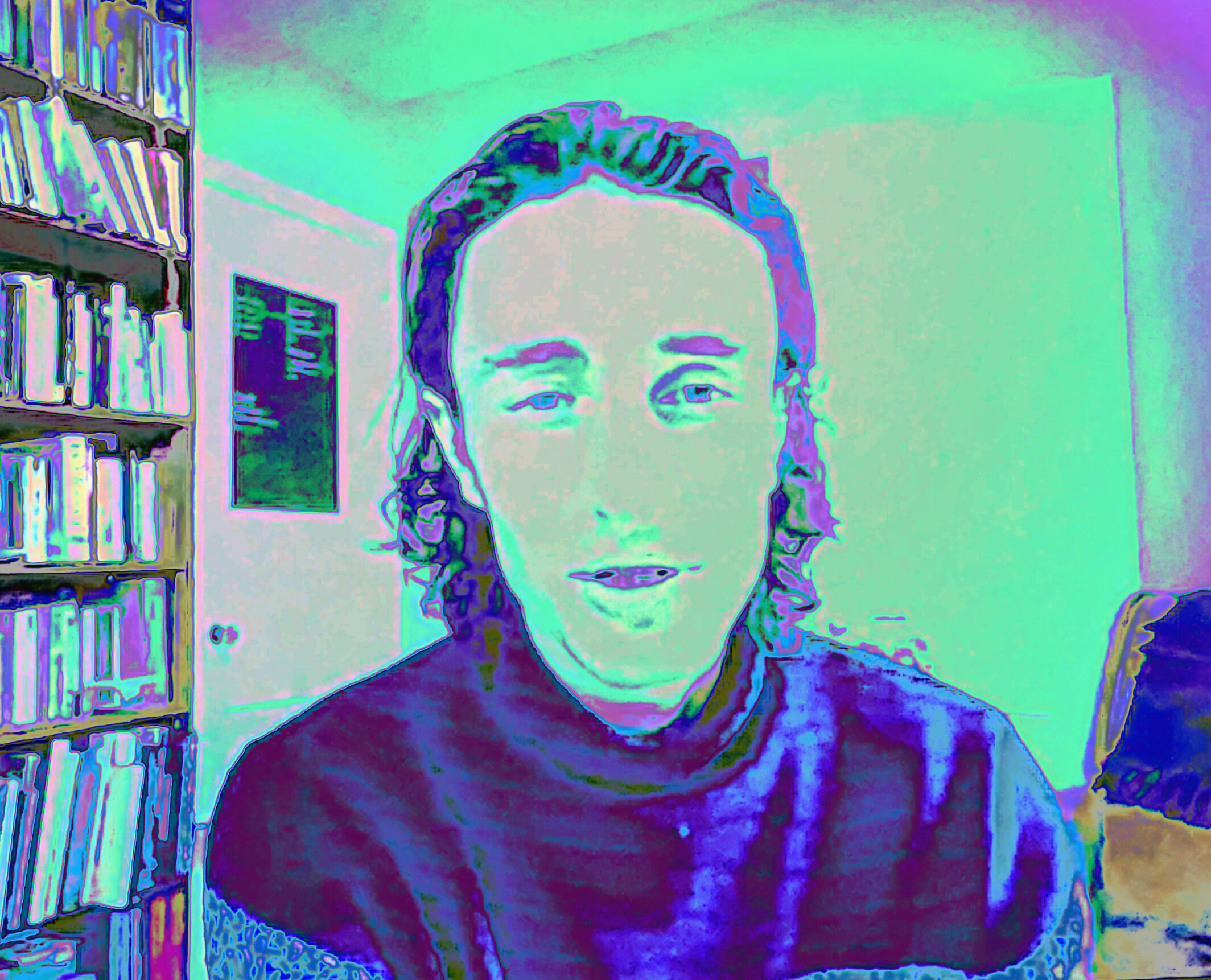
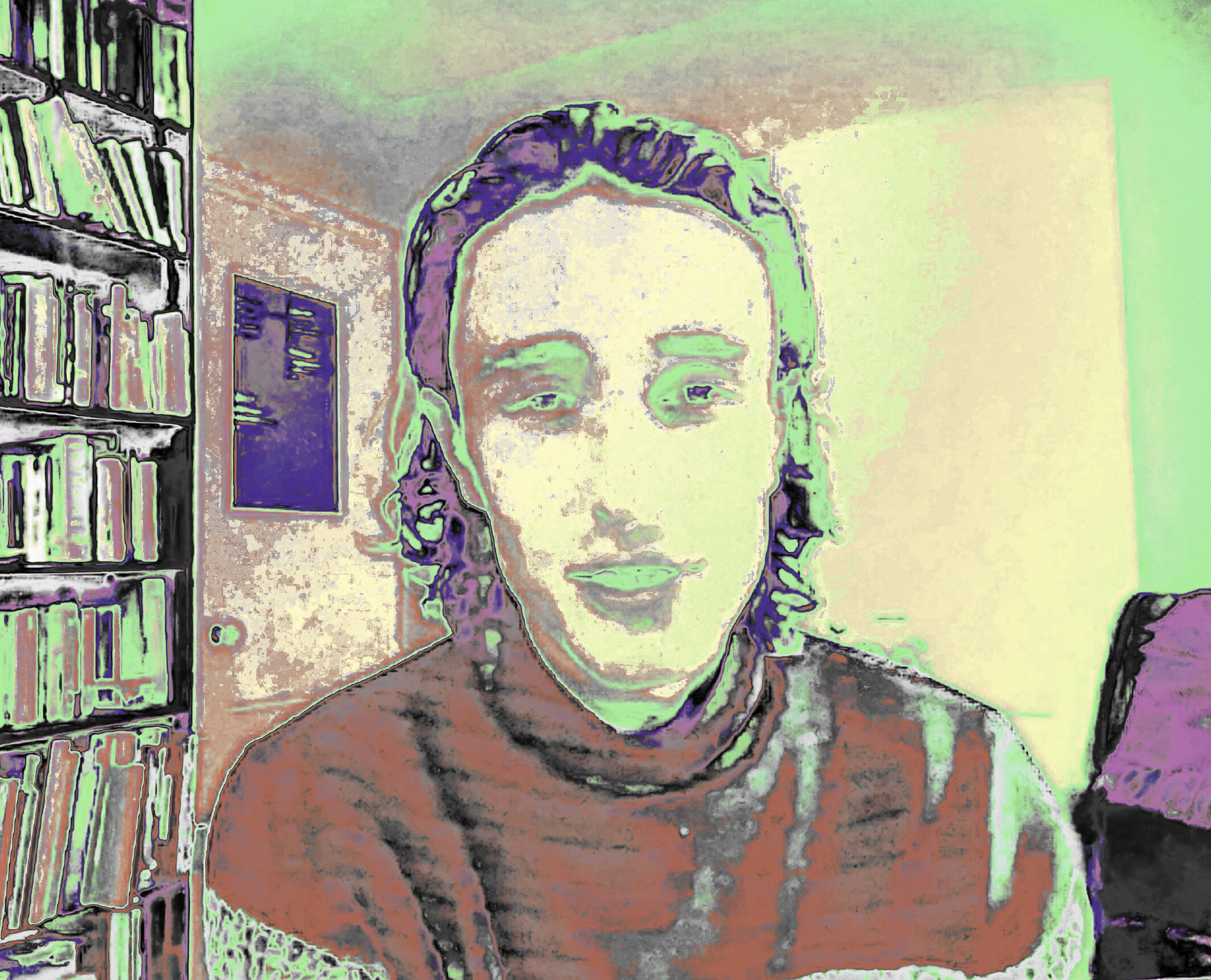
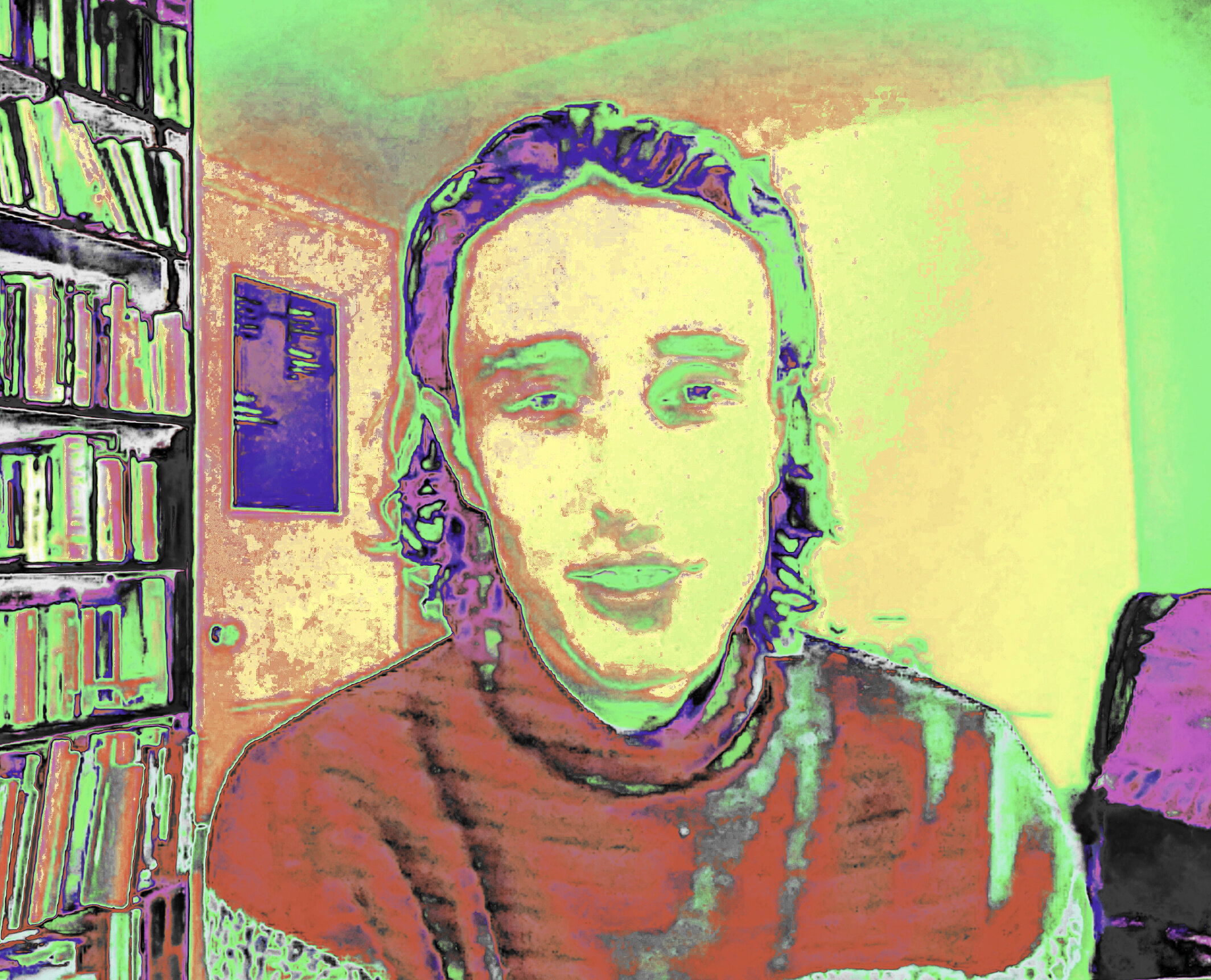
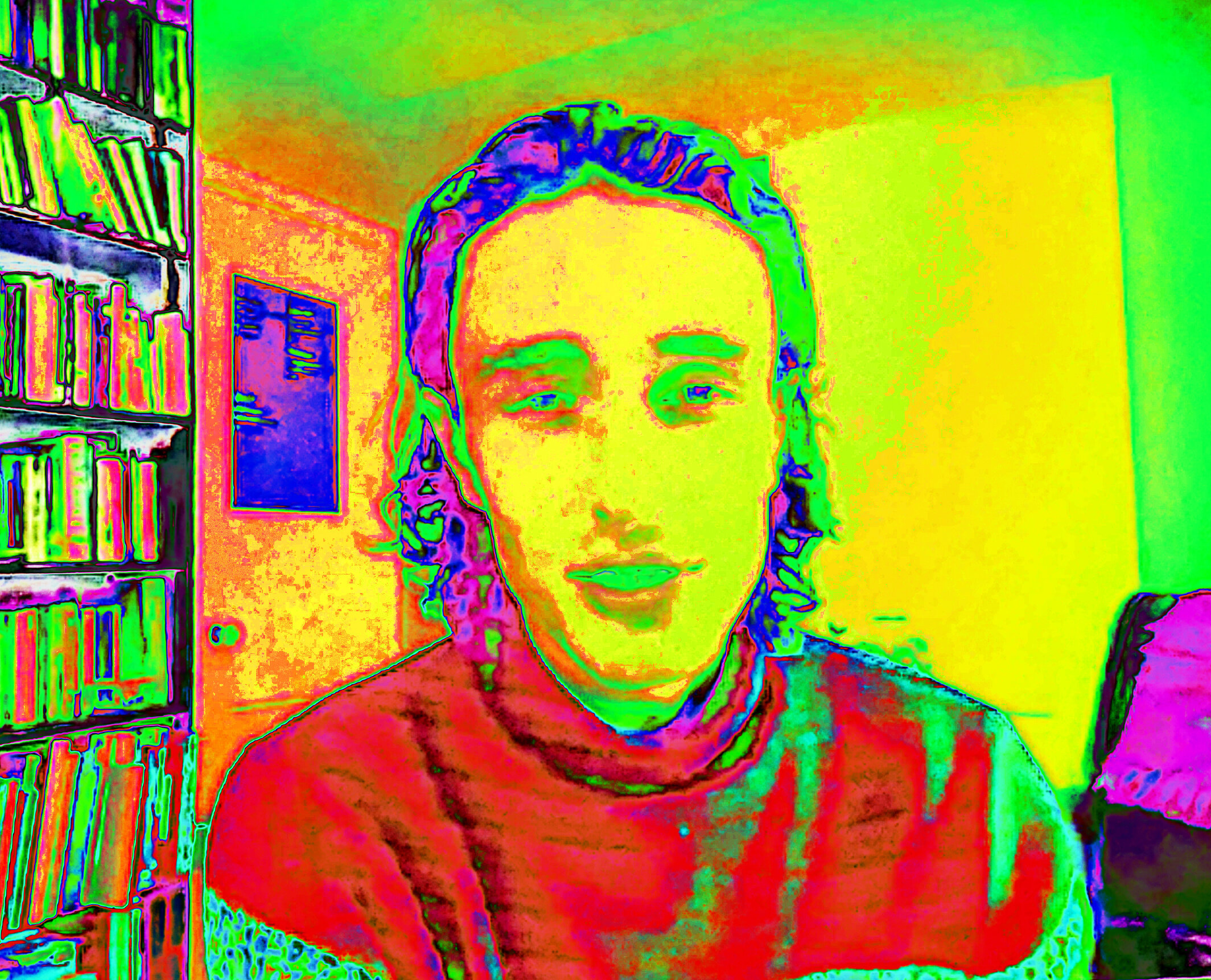
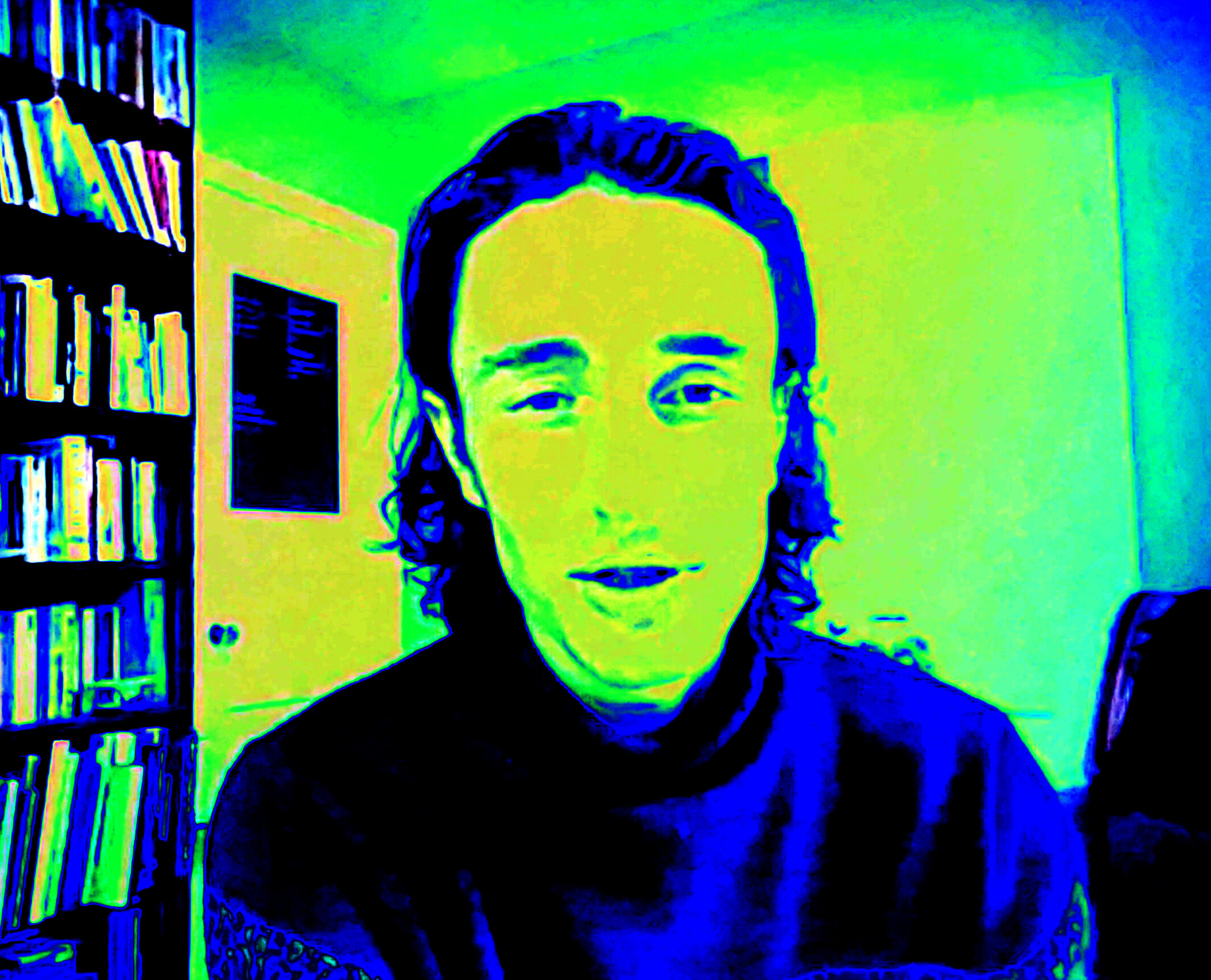
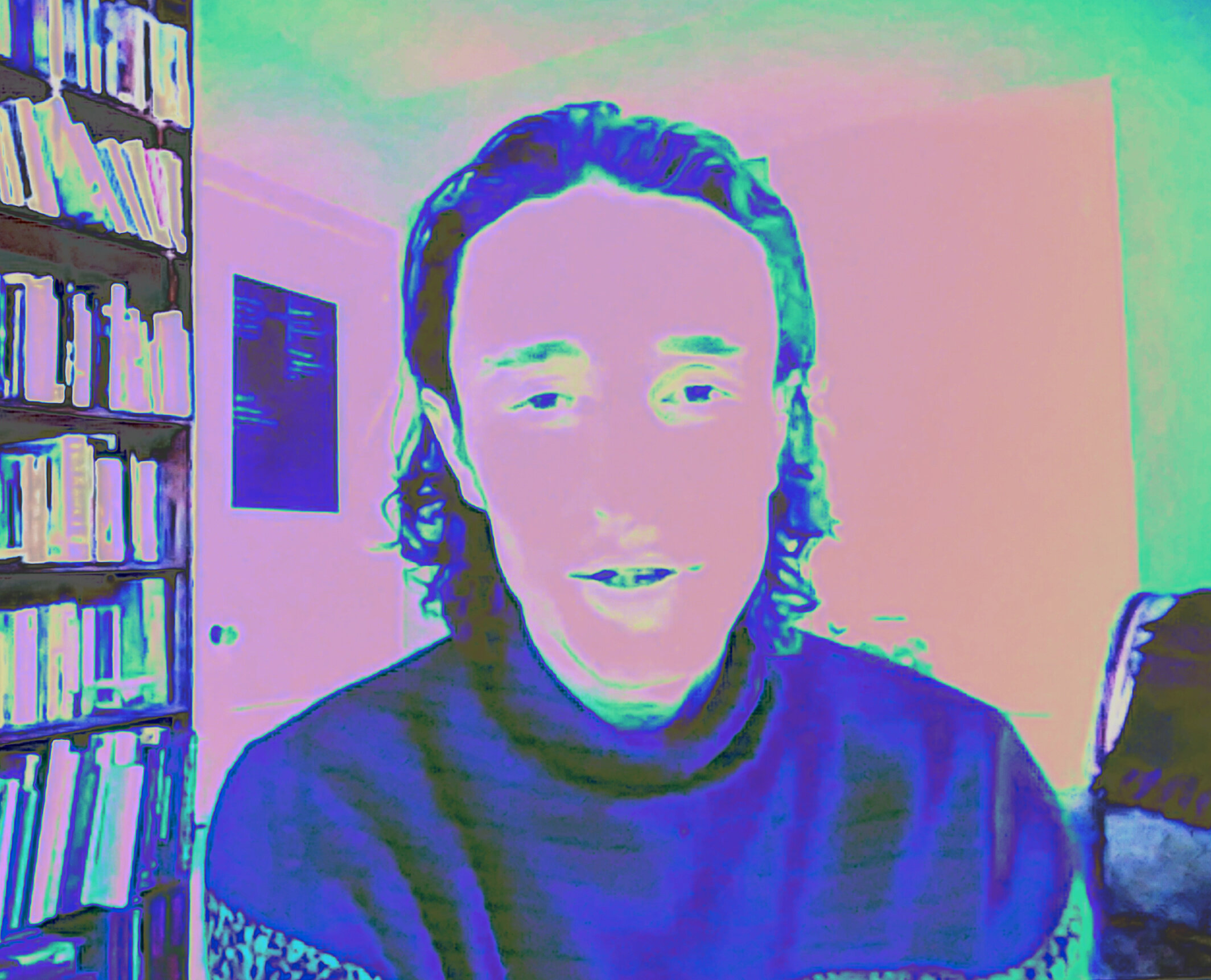
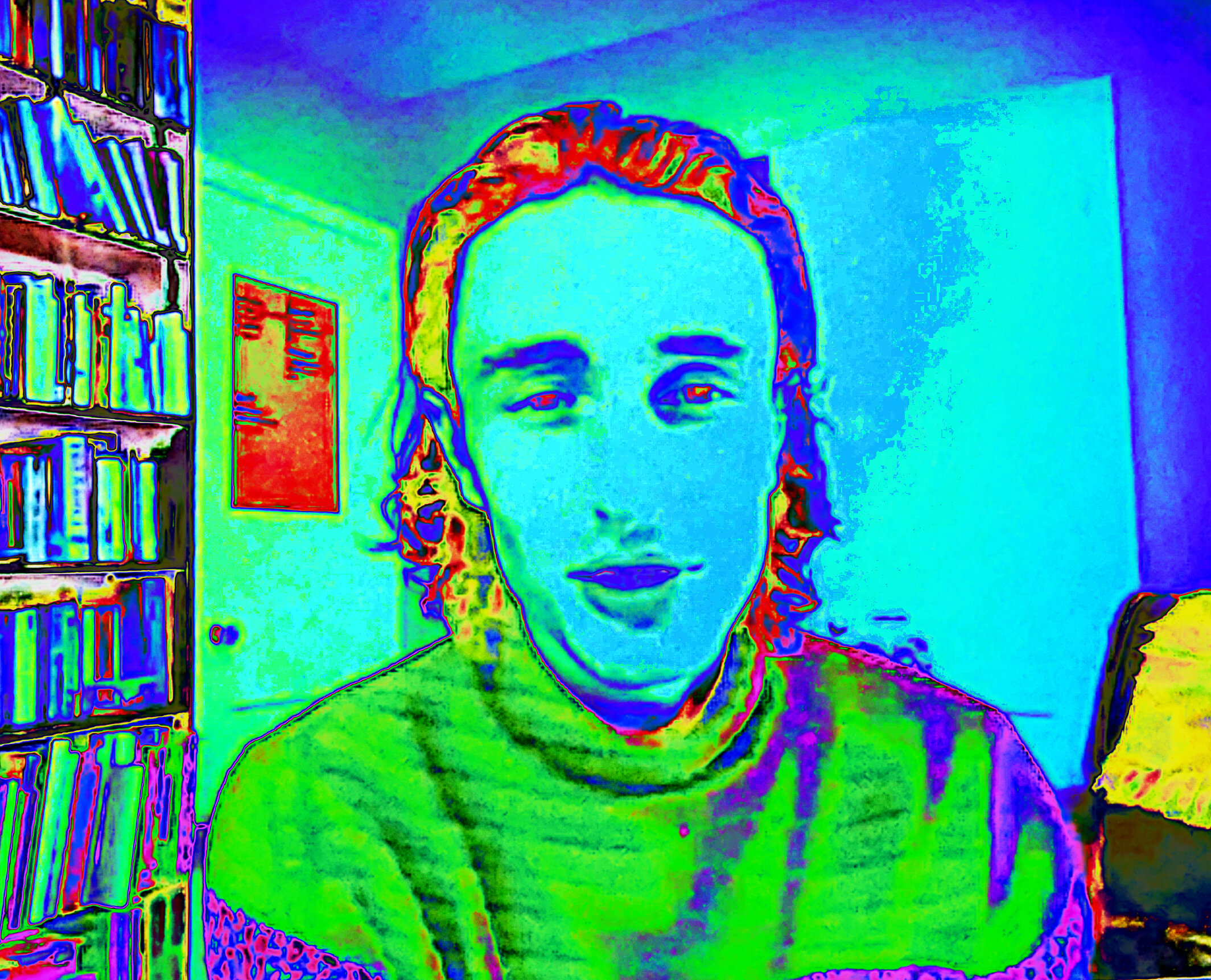
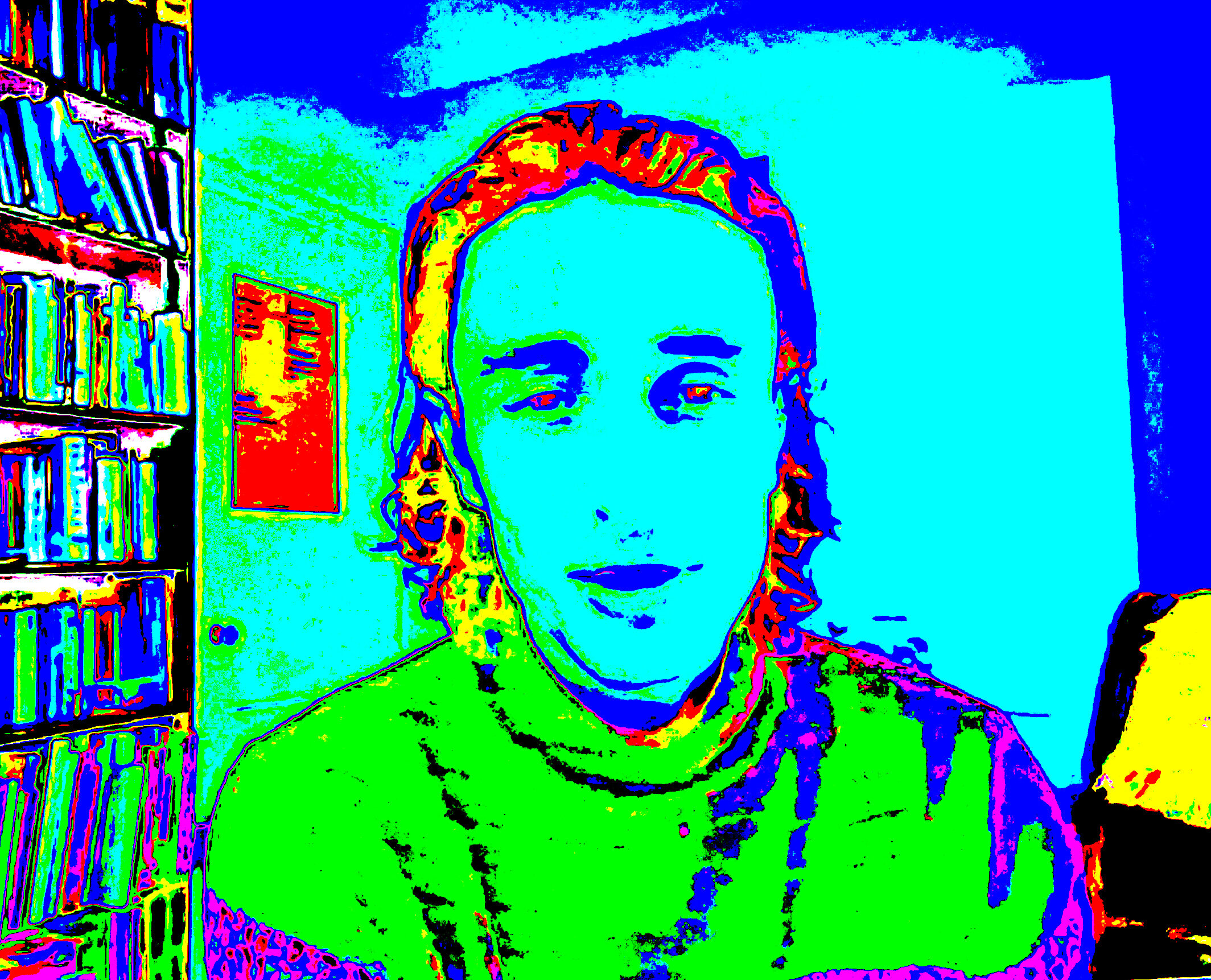
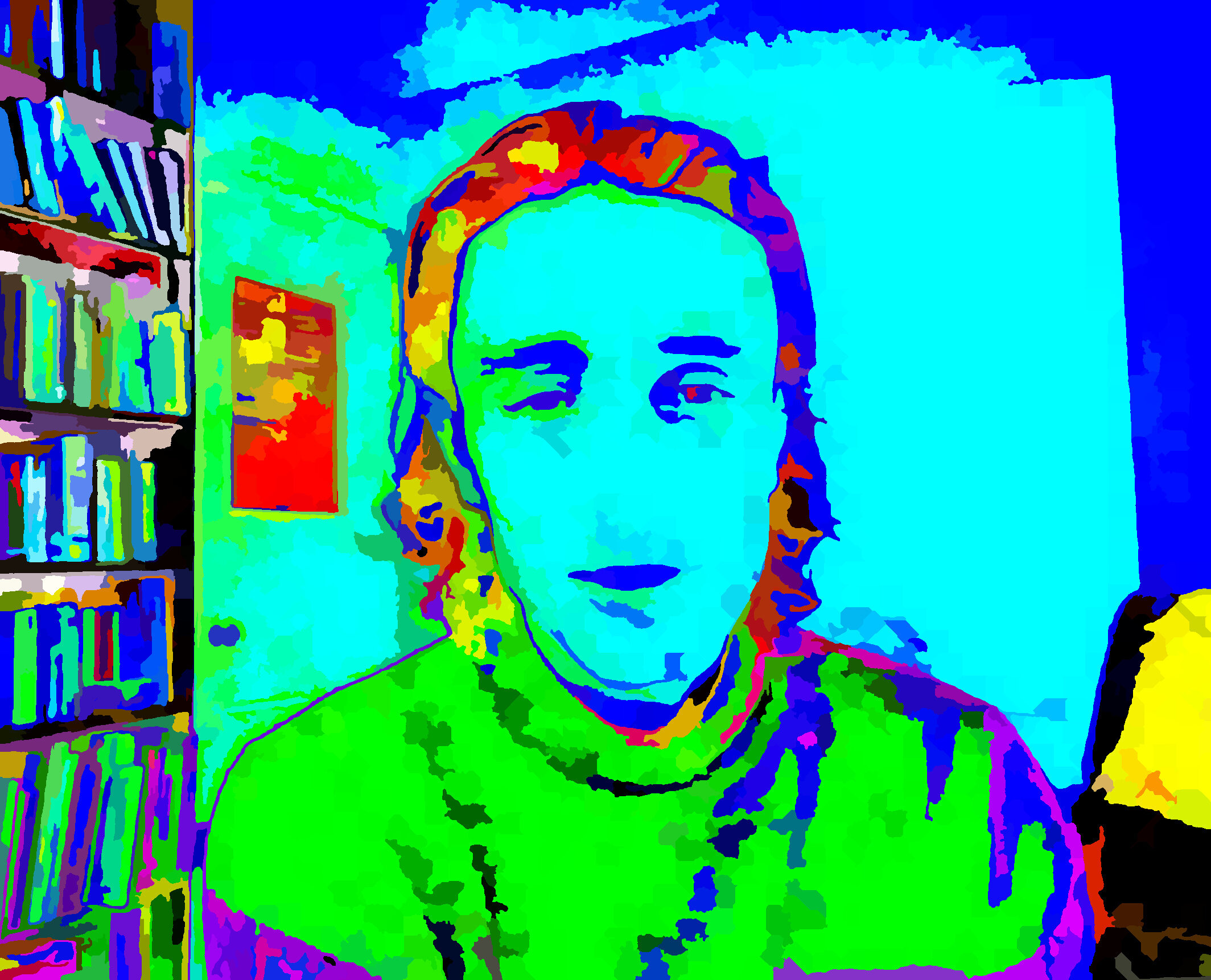
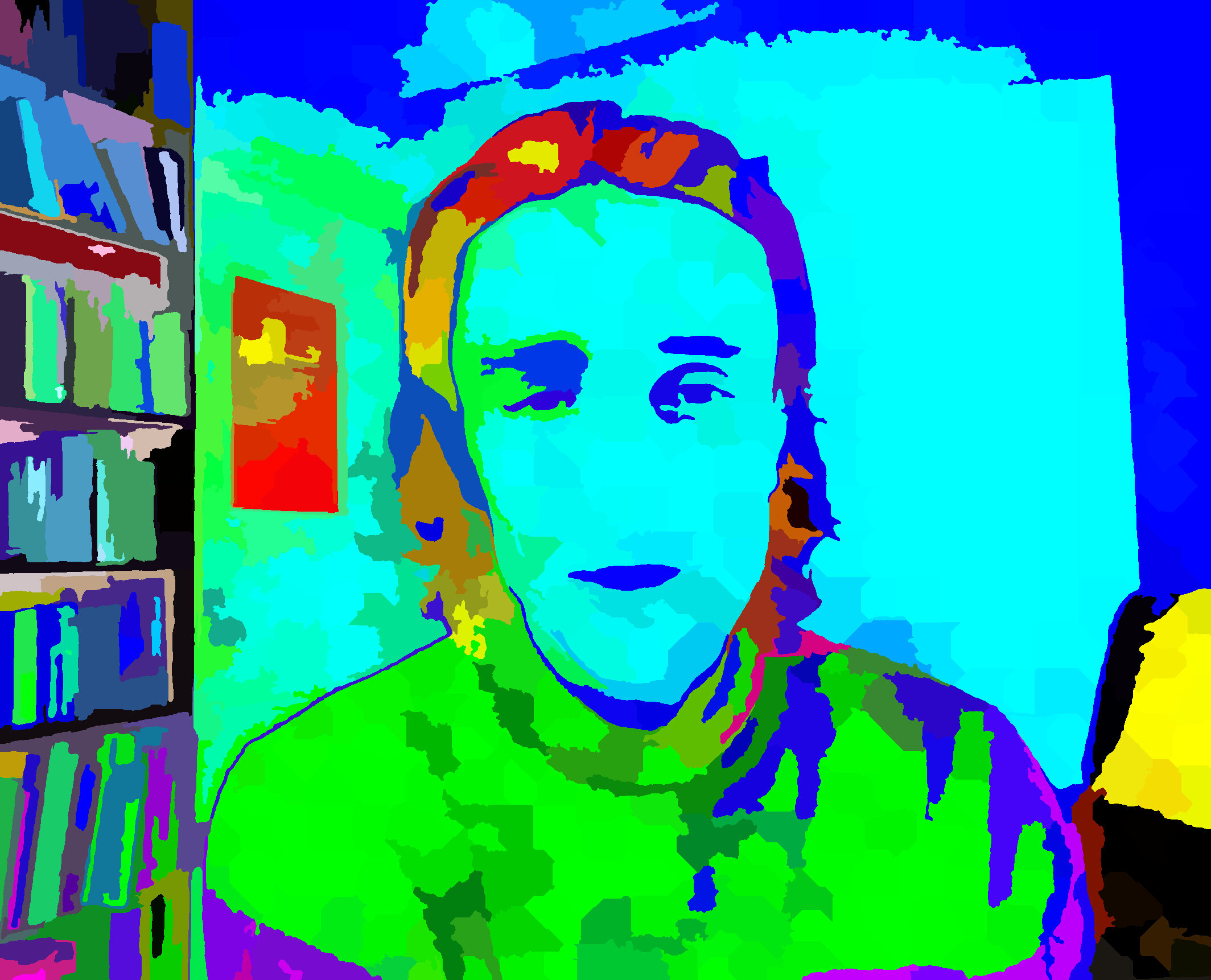
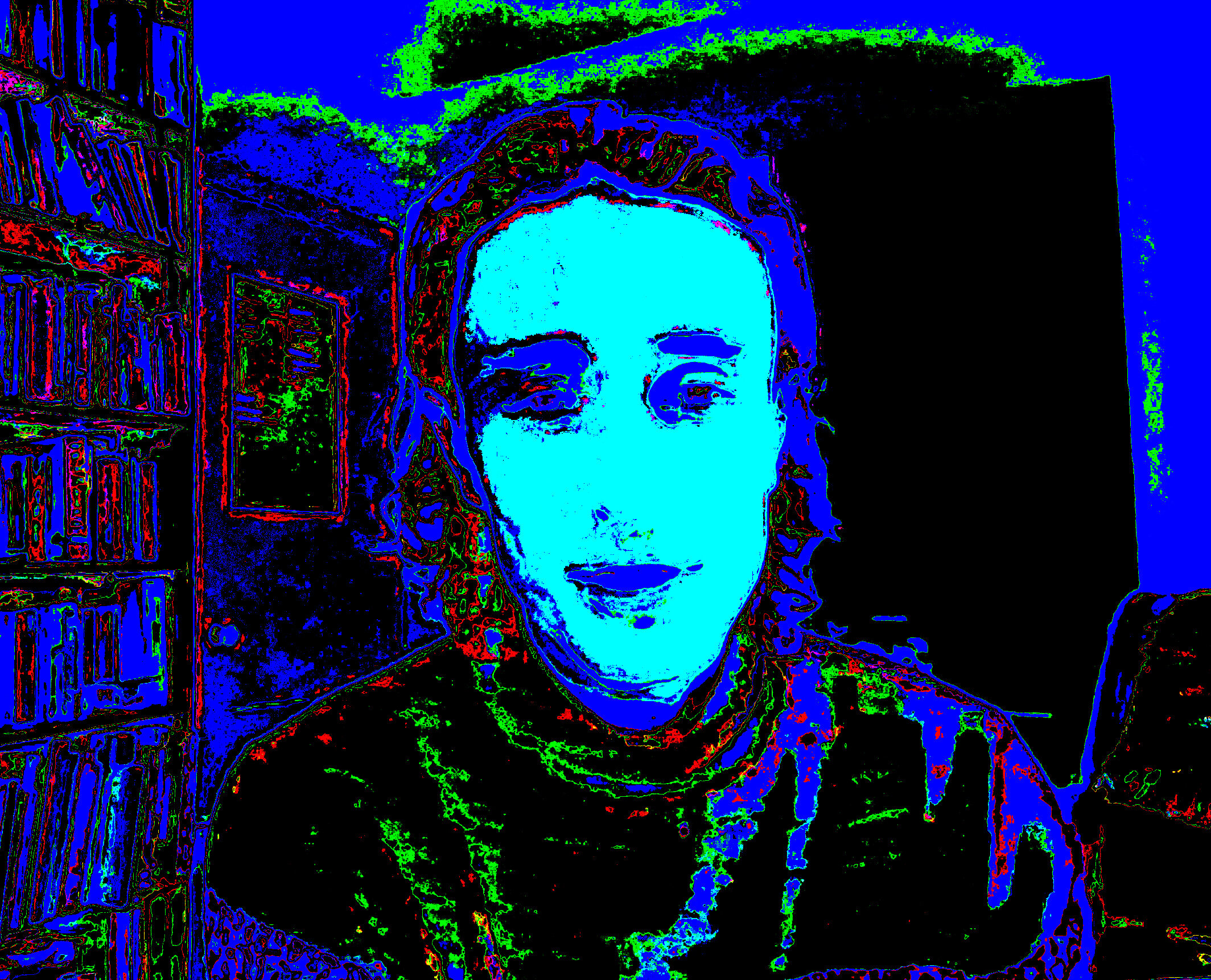
Meanwhile, back on the farm...
Dang, all my posts this year have been so heady, you might surmise that all I did was sit around and think abstractly. Foo!! I not only like to philosophize with a hammer (to quote my good friend Fred), I like working with concrete concrete, and lumbering around lumber yards.
Here’s a project I worked on in that sweaty covid summer that seems so long ago, in preparation for converting an existing shed into a tiny house. I needed a new shed for all the junk in the existing one! (Dammit, too much stuff!!) We had a neglected little section of the side yard in which we had considered planting a fruit tree, but it probably didn’t get enough sun, so I had the bright idea of putting a new shed there. The rest of this shaggy dog’s tail can be gathered from the following slideshow (sideshow?):

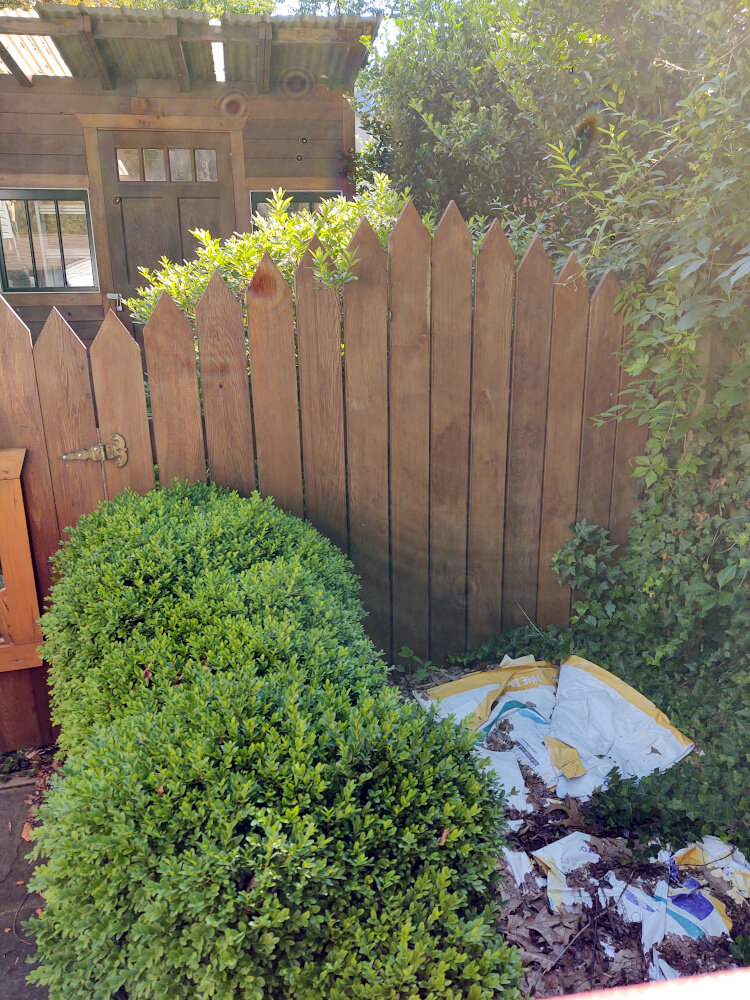

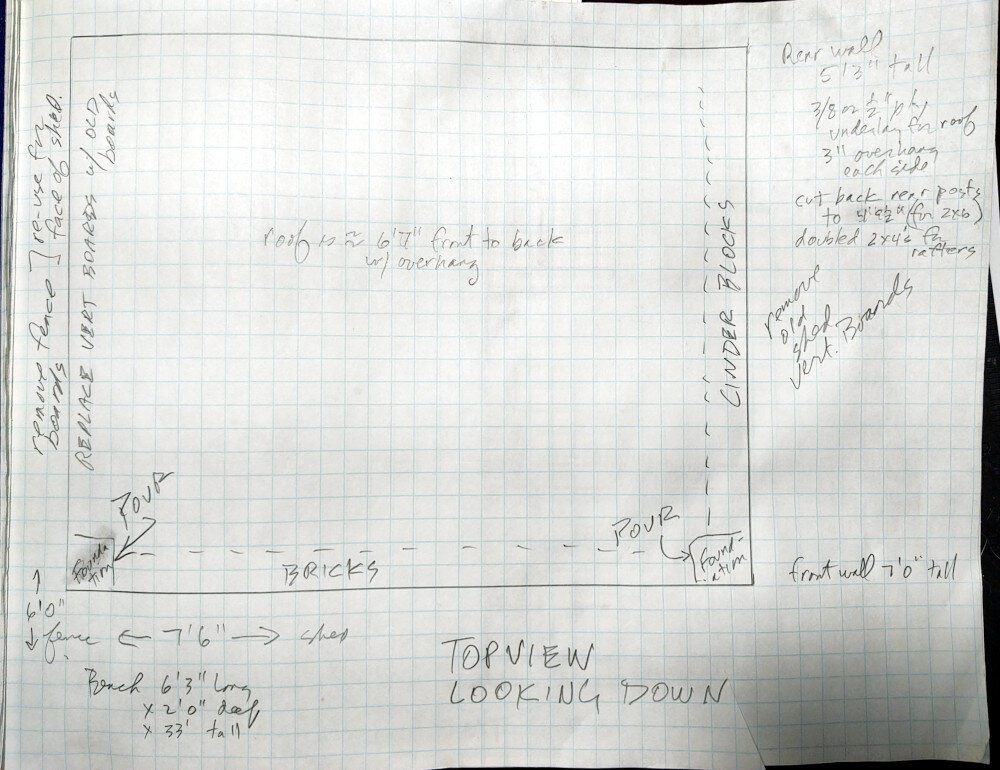












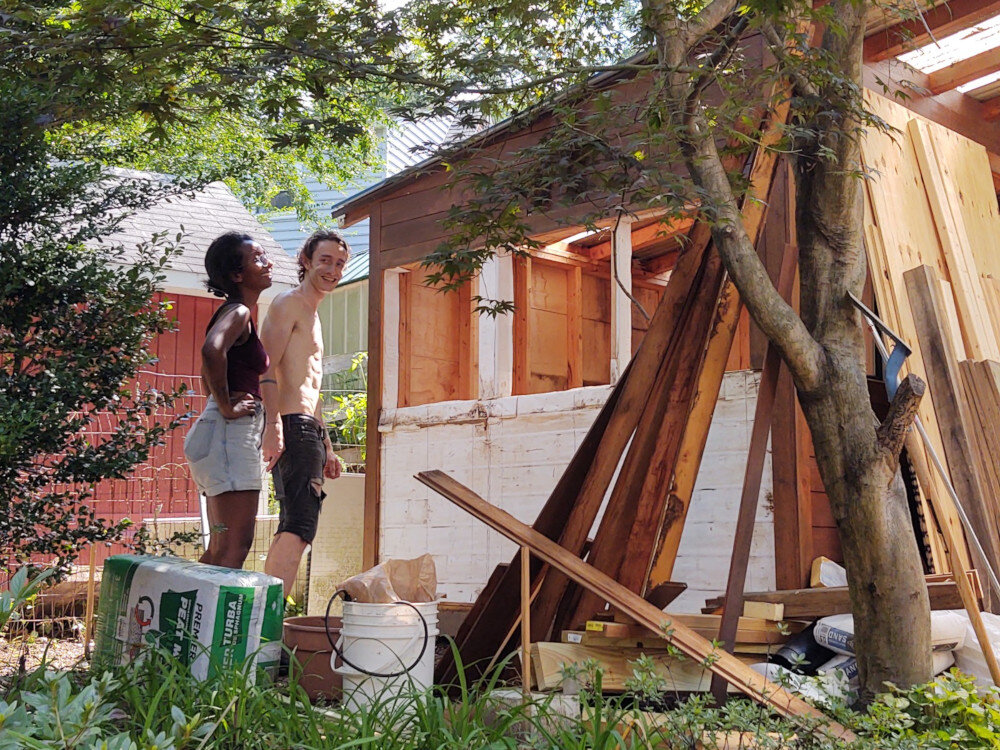
Lost book by Abarbanel, 3
The following lines are an excerpt from a book within a book: a lost mystical text on meditation within The Atternen Juez Talen. In this scene the storyline is intended to act as a guided meditation, leading the spiritual explorer on an elevated path thru a troubled psychological landscape. The endpoint aspires to a state of greater clarity, undistorted by the mostly unconscious conceptual aberrations and emotional whirlpools that shape our thinking.
The scene takes as its starting point a midrash about Rabbi Yossi (ben Halafta), who turns aside one night while walking in the vicinity of Jerusalem, to pray in a ruins. He is referred to as ‘Prophet’ in the monologue below. The scene also has another important literary referent: Shelley's brilliant poem The Triumph of Life, which to my eyes is among the greatest pieces of literature ever written. Thanks, Percy. You are ever an inspiration.
This, the "old English" version in prose:
Inside the darkness I see a face, wrinkled like one who the years deform, haggard, unkempt, mournful with dread. His voice intones like the joyless dead.
"I once ruled the heavenly spheres with grandeur such as none can compare. 'Pharaoh' they whispered, them bowed low, and those who knew me trembled in fear. I, even I, was punished severe by that Hebrew Lor whose power I dared. Look ye, now at my opulent home where lapis and gold once tiled the rooms, now rubble of mudbrick, a putrid tomb. Prophet, what further ruin do you vent on one who never learnt to repent?"
Lost book by Abarbanel, 2
Continuing the topic begun in my October 8, 2020 post, here’s an excerpt from the Kabbalistic book Abarbanel and his 2 secretaries are compiling. I present first the prose translation into Old English (what you probably think of as ‘normal’ English), and then the original original version in poetry:
Ole Eenglish proze verzhen:
In that same year in Yavne I heard Shimon ben Zoma leyn a drash in the week of V’Yishlakh. He taught:
Let us walk in Yaakov’s steps. Seeing the brutes and the blades and the blood [around him], he lifted himself from cushion and tent and set out down the rocky road to find that vaunted holy home. Lain his head on the crusty earth, Kedusha’s rolling thru his mind to crack the klipas worrying(? whirling) him. Down the angel minyans came. Took his hand and up they went. There, Shekhina like a dancing flame, hot and shapely, is waiting for him. Seven levels of kippurim to open the first fold of the tent and remove the embroidered garment of her. And seven more for the second fold and the deeper desires awoken in him. Now Shekhina urges him on, to tend the flock that it increase; be it strong, be it fecund. And so a vast and devoted host informed the will of Yaakov. He wanted to return to the Adam world with all this holy host of the Lor, to bring atonements to the waiting world. He descends to the river’s edge, three finger widths from the Camp of the Lor. There Adam confronted him and wrestled him into a human shell, that the host of angel messengers could pour thru the body of his soul – Ma’aseh Merkava – and enter the vacuous Adam realms to work redeemings into us.
The errijjennel verzhen az powessee:
In them same yeerz in Yovnuh I heerz
Shemone ben Zomuh laen on a drush
In the week a Vuh’Yishlukh*. He tot:
* week wen Berraysheet/Jen 32:4-36:43 iz red
Let us wok in Yuh’Uhkoevz steps.
Seeyen the bruten the bladen the blud,
He liffen himselv frum koushennes tent
An set owt down the rokkee ro
Tu fien that vonted holee ho*.
* eka d’omray: home
Laen iz hed on the krustee erth,
Keddueshuhz* rolen thru iz mien
* holenessez; holeyes praerz
Tu krak the klepuhz werlen him.
Down the aenjel minyenz kum,
Touk iz han an up than gon.
Thaer, Shekhenuh, dansen flame,
Hottes shaepleez waten fer him.
Sevven levvelz a keporreem*
* uttoenmenz
Tu open the fers foelen the tens
An remmuve the broiderd garmen uv her.
An sevven mor fer the sekken foel
An the deepes dezziyerz a woken him.
Now Shekhenuhz erj him on
Tu tend the flok that it in krees;
Be it streng, an be fekkunt.
An so a vas devvoten hoes
In formen in tens a Yuh’Ukkoev
A wonten rettern tu Addum werlz
With awl this holee hoesten the Lor,
Tu breeng a toenz tu the watee werlz.
Dessendes him tu this rivverree ej,
Three feenger withs frum the kampen the Lor.
Thaer Addum kunfrunten him
An ressel him tu a hyumen shel,
That the hoes (uv a) aenjel messejjerz
Kan por thru the boddeyen iz seel --
Muh’uhsay maerkuvvuh --
An enter the vakyuwes Addum relmz
Tu werk reddeemenz* intu us.
* ennummeez uv the Juwen reed this az “red demenz”
New additions to my Abstract Expressionist series
I continue to experiment with electronic transformations of abstract forms. Here is a series I recently produced.
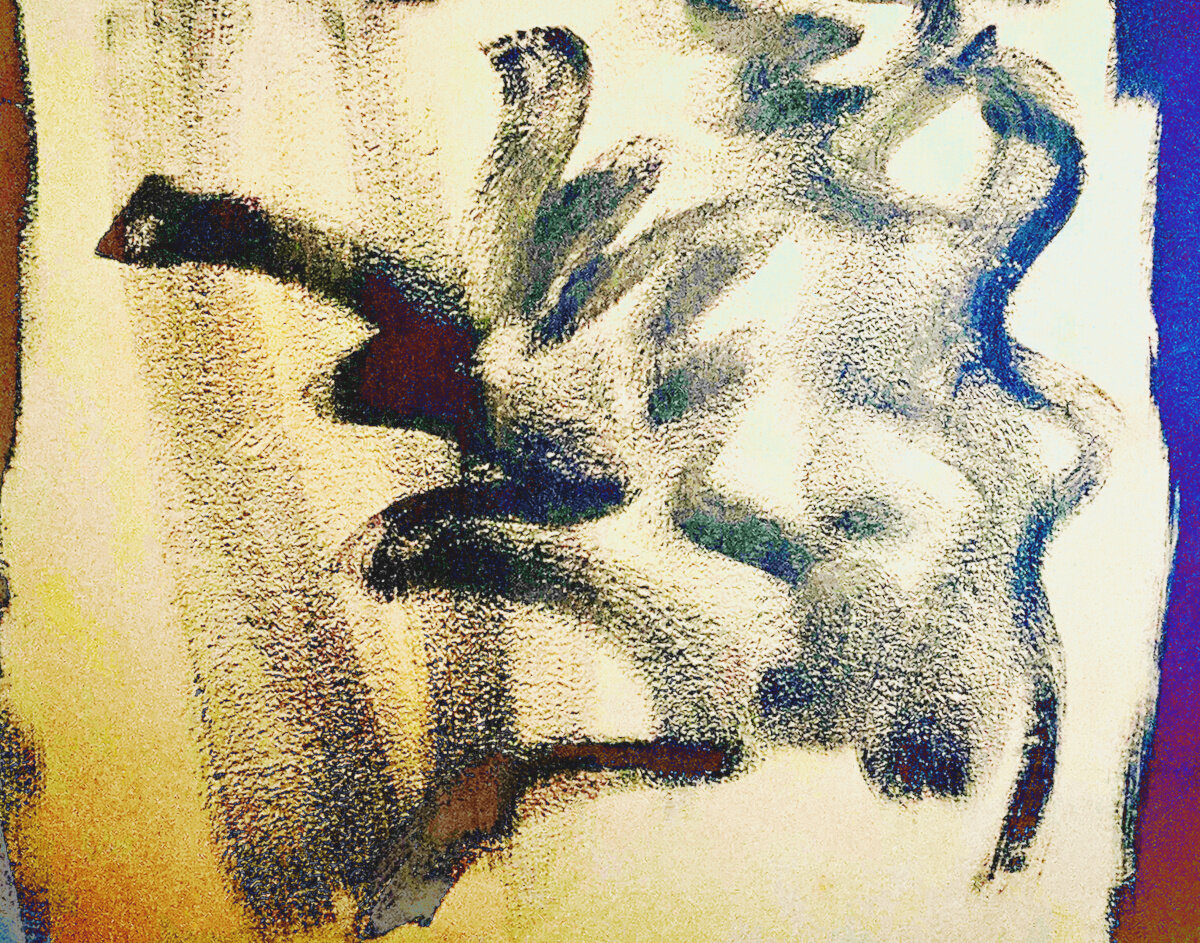
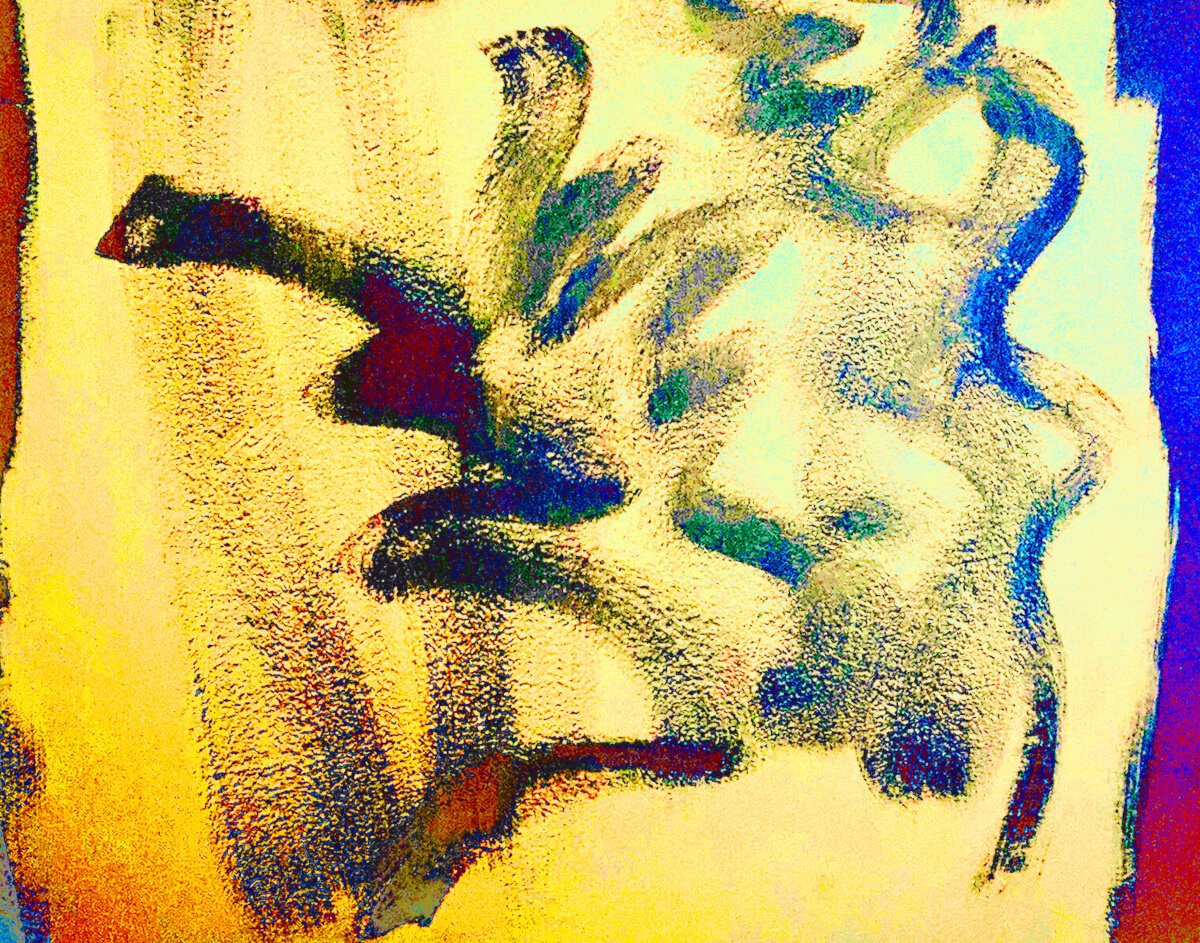
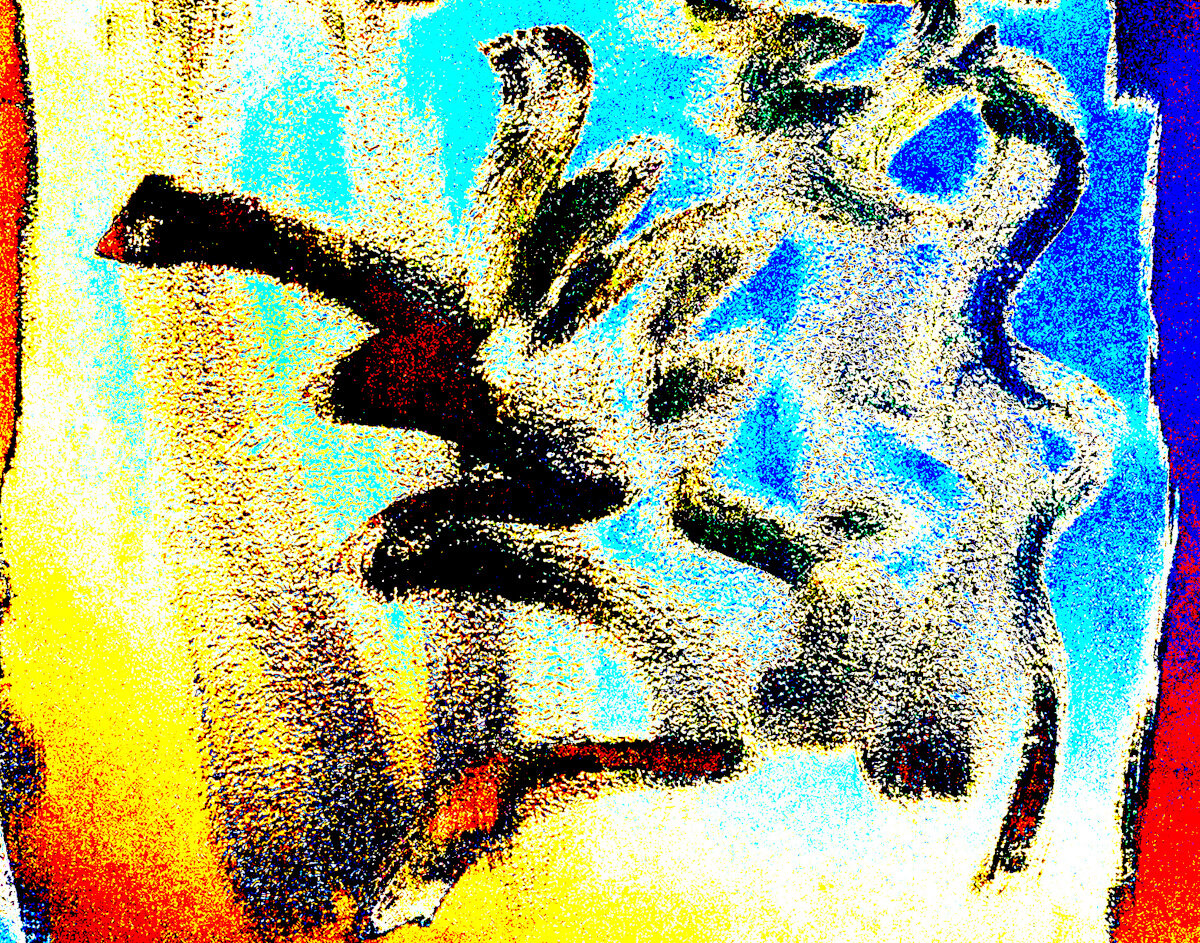
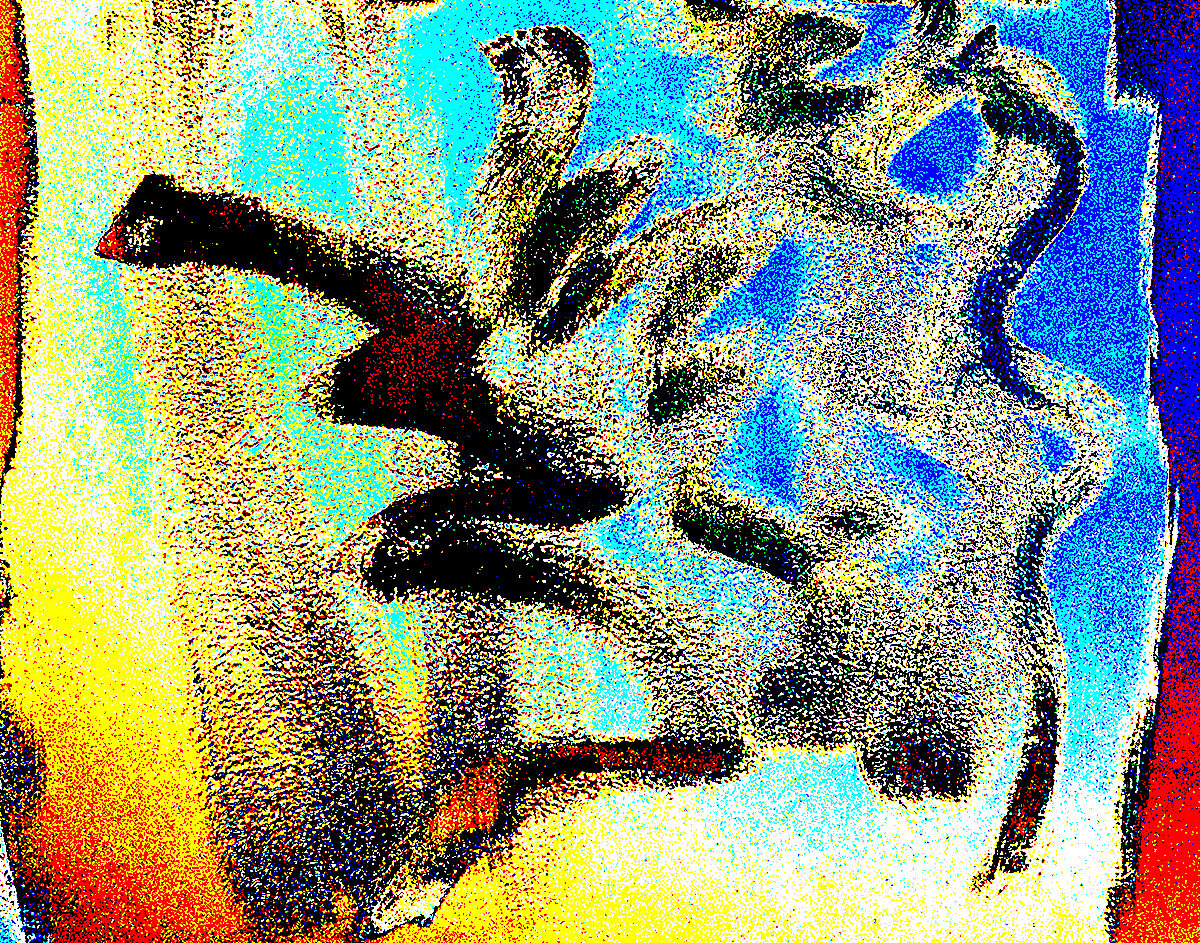
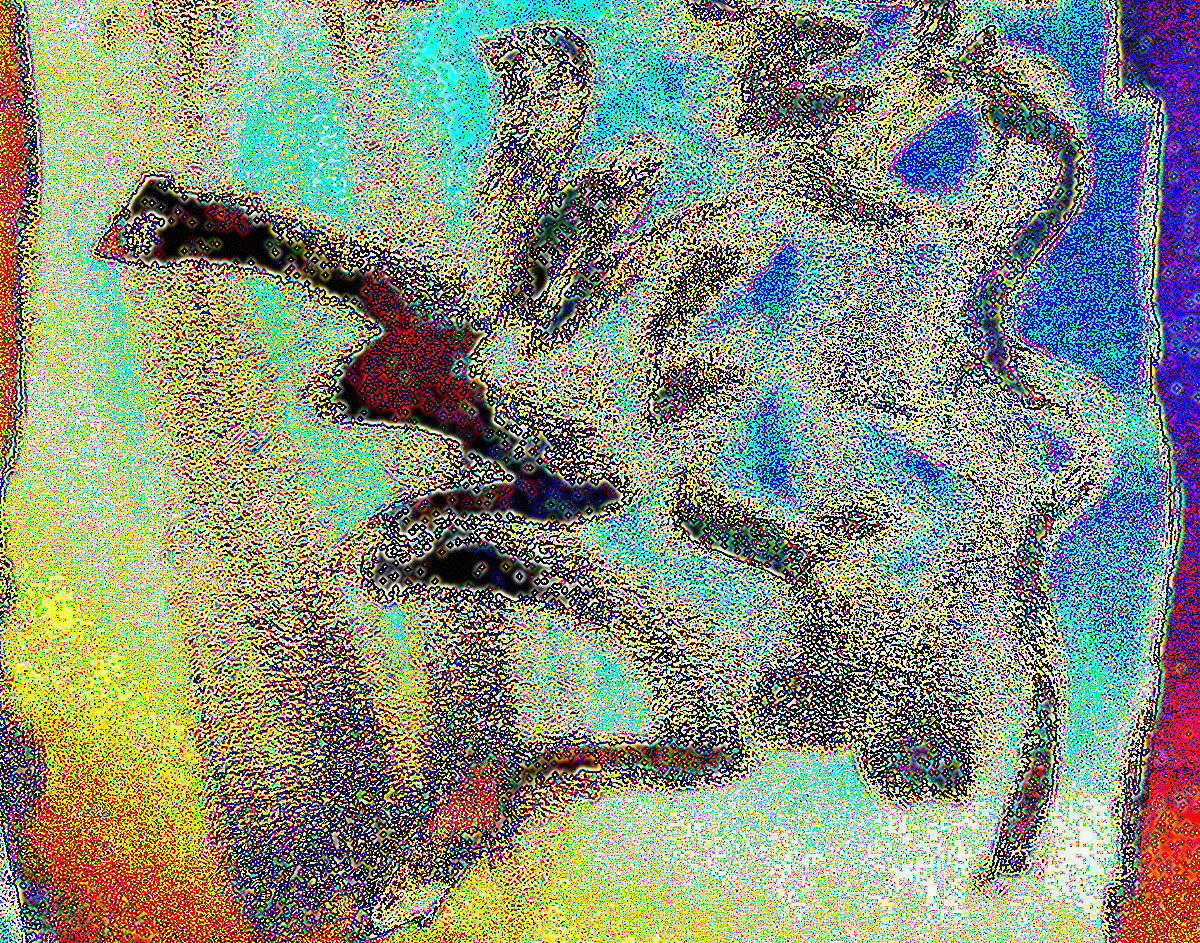
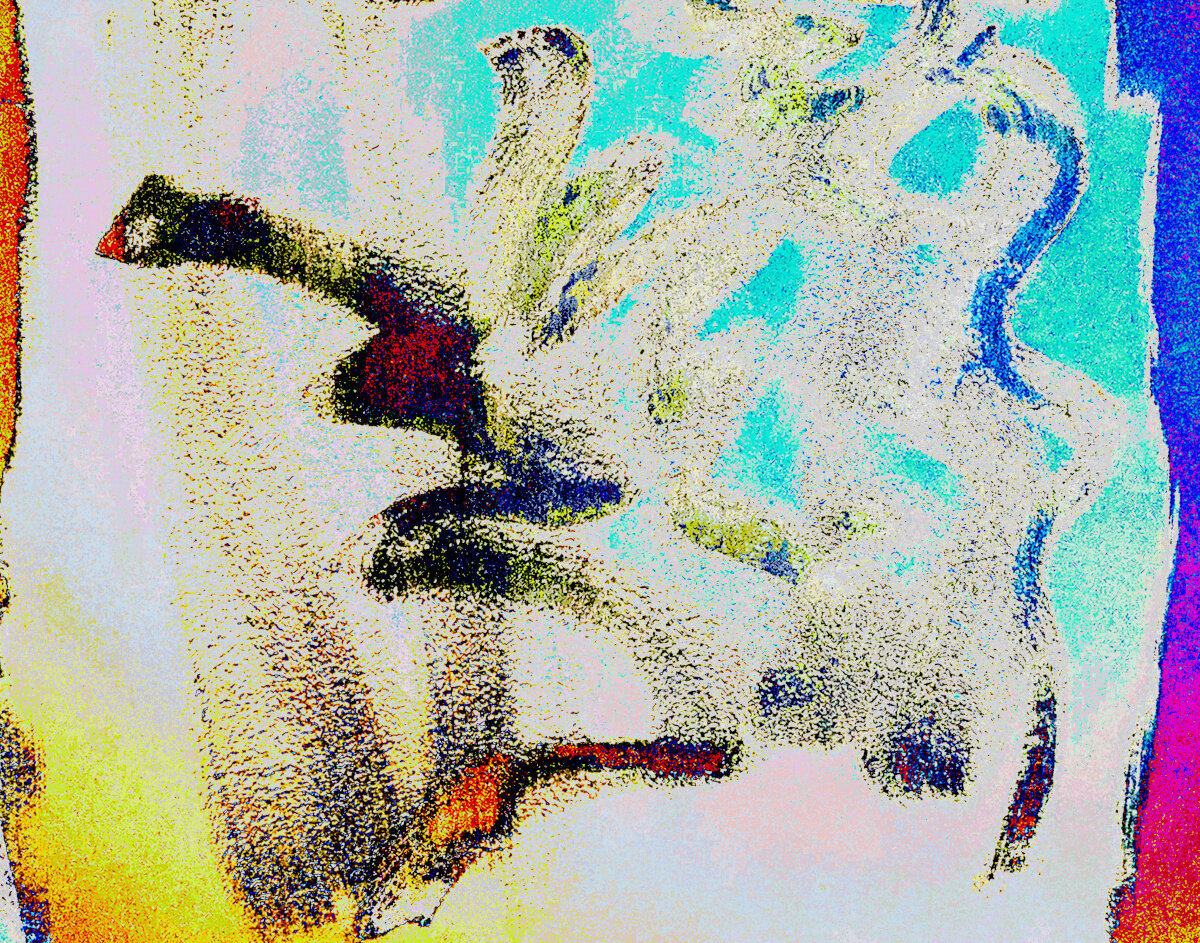
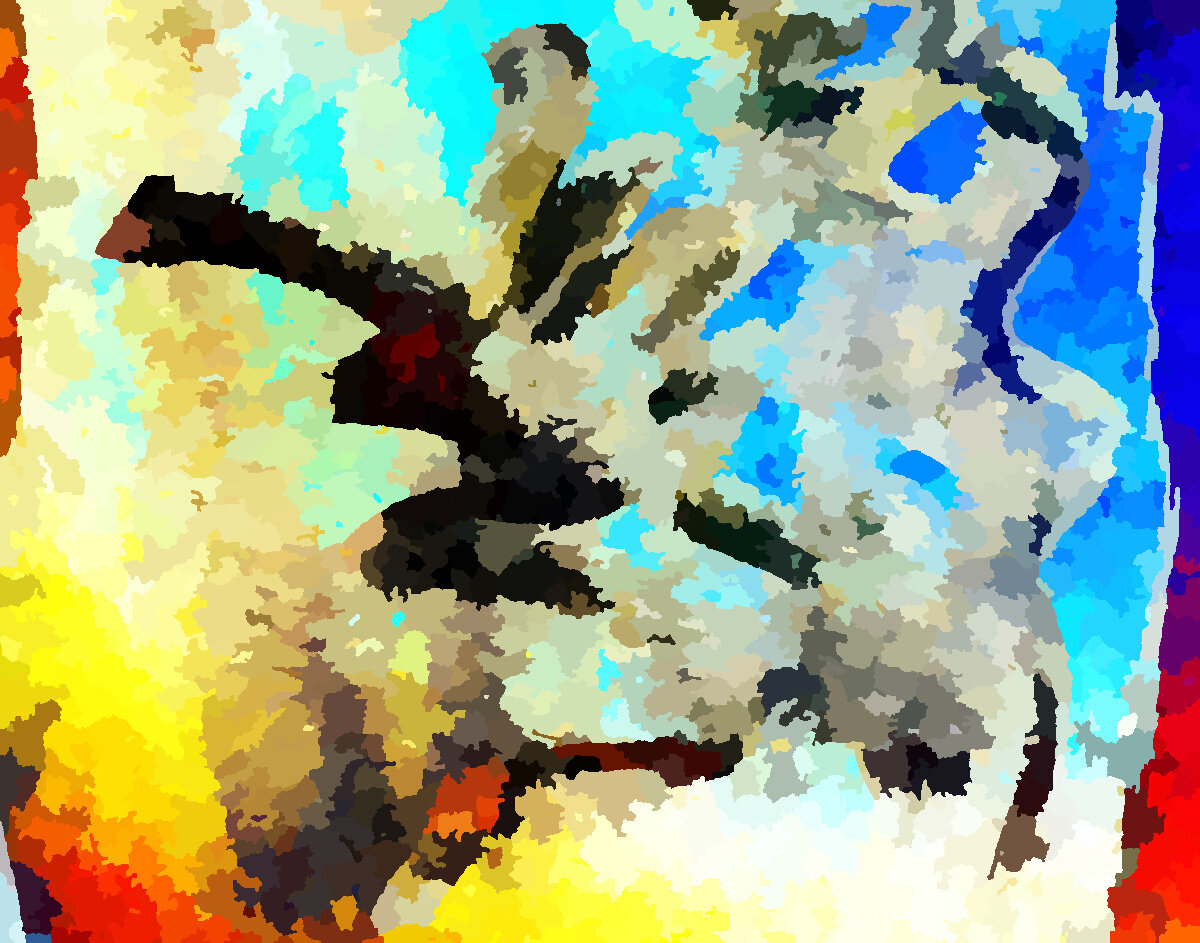
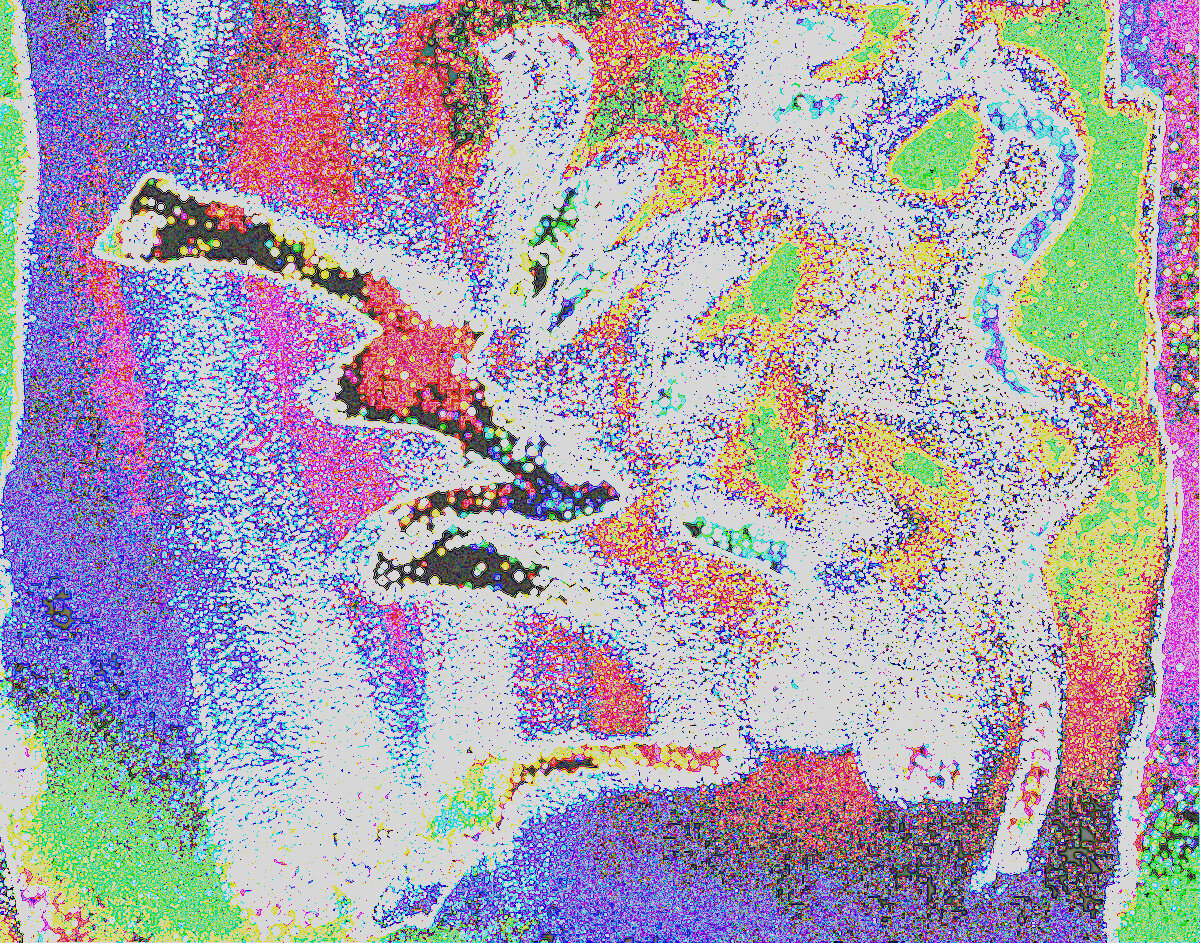
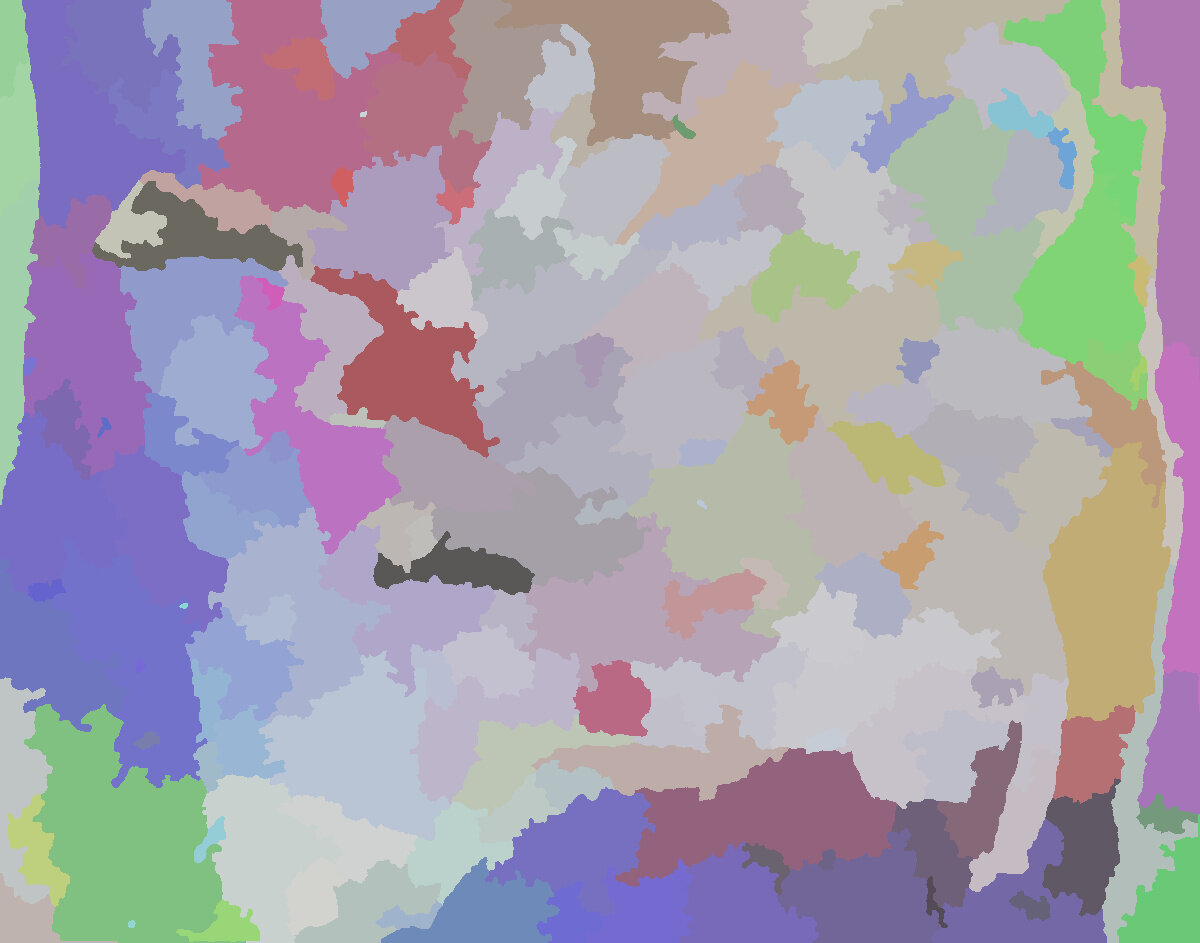
Megillat Esther: a golden drinking vessel
This 16 second video shows the development of an illumination for the Megillat Esther Josh and I are producing. Here’s the text of the video’s voice-over:
This illumination is based on a golden drinking vessel from the Achaemenid period. Conceivably, Xerxes, Achashverosh, could have used this vessel during the festivities described in the Book of Esther. I produced the image using gold leaf and water color.
Lost book by Isaac Abarbanel
My current work on The Atternen Juez Talen is taking place in Portugal and Spain in the years leading up to 1492, a momentous and disastrous year.
The Eternal Jew has become the secretary to the treasurer of Portugal, Don Isaac Abarbanel. Outside his work for the government, Don Isaac, the Eternal Jew, and Batkol (the Eternal Jew’s wife) are compiling notes on making spiritual ascents into the upper spheres of the soul.
Their researches try to create a map, to lay out the stages/levels of the soul ( what we might now call the unconscious, or in Jungian terms, the collective unconscious) and how those stages will be experienced — what will be seen, what will be felt, how to proceed, how to know where you are, and how to know where to go from where you are. You might call it ‘existential Kabbalah.’
Unfortunately, with the death of King Alfonso V, the new king, John II, is obsessed with consolidating his power over the independent princes of the kingdom. This leads to a blood bath, and Don Isaac and his retinue must flee to Castile (in modern-day Spain). Don Isaac decides to abandon his researches. Deeply disappointed, the Eternal Jew transcribes what notes they have, hoping at a later time they’ll be able to return to the project.
What follows is the introduction to the section entitled The Ladder of Ascents. Below, I present first the metaEnglish version in poetry, and then the “old English” (what you call modern English) translation in prose.
Now, I bin sor let down by this.
Shor fowndatenz kum beffor
Ubsservuttorreez on an upper dek,
But awlso shor, wen the hyumen seel
Be klaruffiez ennuf tu see
Beyon theze opake ellummenz,
An withowt unseen an distorten feelz,
Then perhaps theze noets that we kumpile
On hiten sens an speret ussents
May be uv yuse tu the arkutteks
Uv nu naeshenz an enliten seelz,
Tu aenjelfoke a nokken ar dor.
Aenjelfoke waeten on us tu urrize.
Theze noets then, may thay serv the Lor.
~~~~~~~~
Now, I been sore let down by this. Sure, foundations come before observatories on upper decks, but also, sure, when the human soul is clarified enough to see beyond these opaque elements, and without unseen and distorting feelings, then perhaps these notes that we compiled on heightened senses and spiritual ascents may be of use to the architects of new nations and enlightened souls, and to the angelfolk that knock at our door. Angelfolk waitin’ on us to arise. These notes, then, may they serve the Lor.
Shana Tova 5781: excerpts from life and imagination
Looking critically at myself (these Days of Awe and ow and ecch, and all), I believe the best part of me is my poetry. As a person, as a husband, father, saba, I don't come close to what I may be capable of. But, perhaps, in my poetry I come close, or closer.
Thus I post this excerpt from The Atternen Juez Talen, modified a bit, to try to express my thoughts, grasp the moment, send you Shana Tova greetings, and maybe even lift you a few degrees in the process...
The first light of the new rising sun and Nancy and I, chewing the facts...
Just like any old morning talk before Rosh Hashana and its stairways to heaven where the Judge is waiting to thin the flock.
The seventh month and the first of the year. That’s Jewish time: all relative! And all relative the way we see things; backwards, twisted, turned upside down. Looking up to heaven, and it turns out we're looking down into the pit of ourselves. Imagine.
And there, Divine Being. Imagine! And there, you, and you're not saying, 'cut me a break' or 'this is all a crock' or 'save the religious crap for some other fool'. There you are, saying ‘Hineni’, 'Here I am.' And there your Divine Being is, saying, 'That's not all of you. Stop hiding and show me more!'
Shock and awe. Now the holiness of the day like a mountain hangs over your head. “Will you be My partner or not?” says your Divine Being, and who isn’t ready to faint?
The book of all we say and think, of all we did, and all we didn’t do; the book we wrote with our own hands and spoke with our own mouths; that book! It reads itself back to us while our Divine Being is looking right there into the pit and piteousness of us. Who will stand there and still have faith and not just run, all trauma, away?
The Divine Being of all the worlds is standing before your face and turning your page.
Days of Awe.
May your pages be many, full of wonders, and may they be turned gently.
With love and awe,
Studies of a painted room
The other night, standing in my study looking into the dining room where Nancy was working, I saw a strange thing: the walls, tho all painted the same color, were all different shades. I pulled out my camera and took a picture to verify that I wasn’t in an altered state. The camera saw it my way too. So I decided to run the camera image thru some altered states, and here’s what emerged:
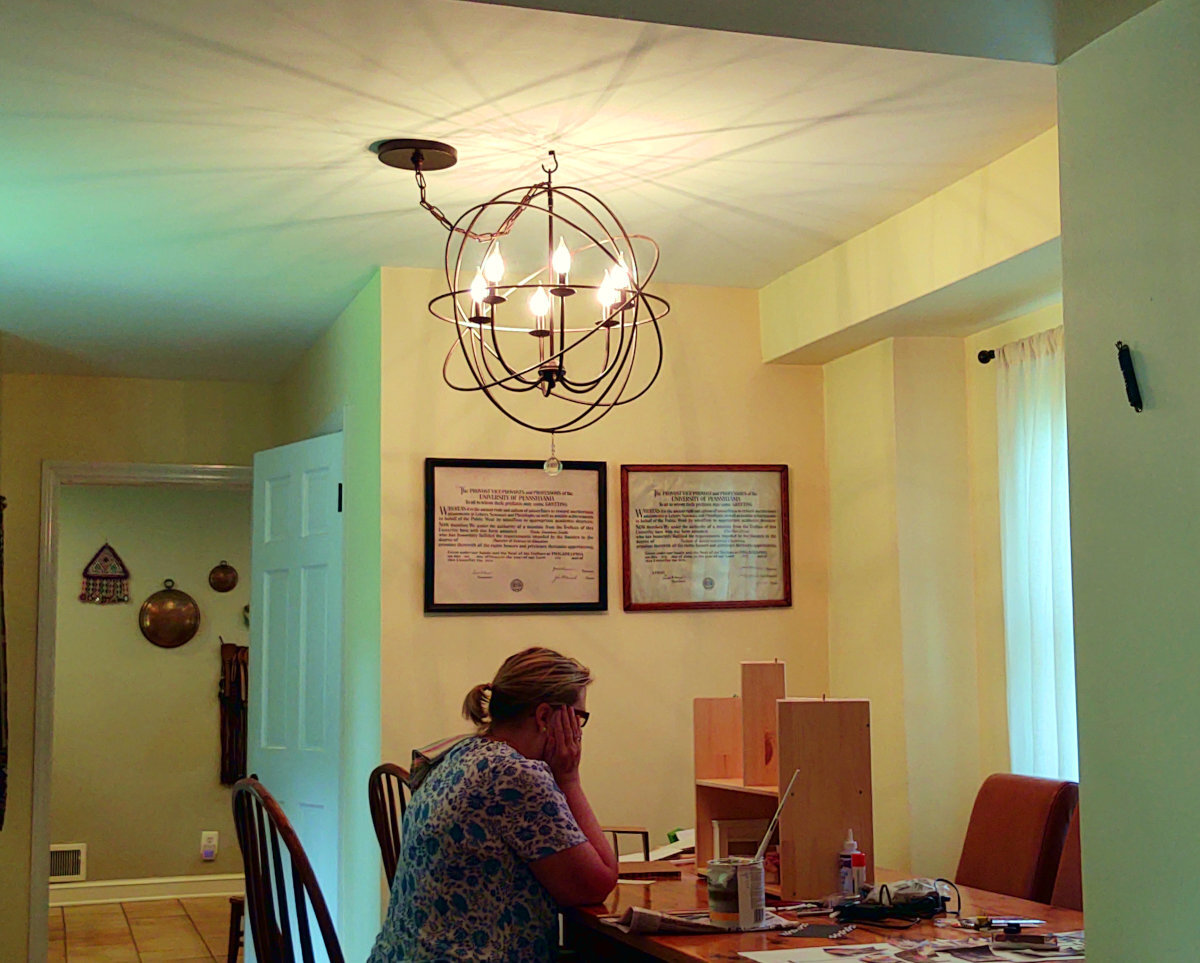

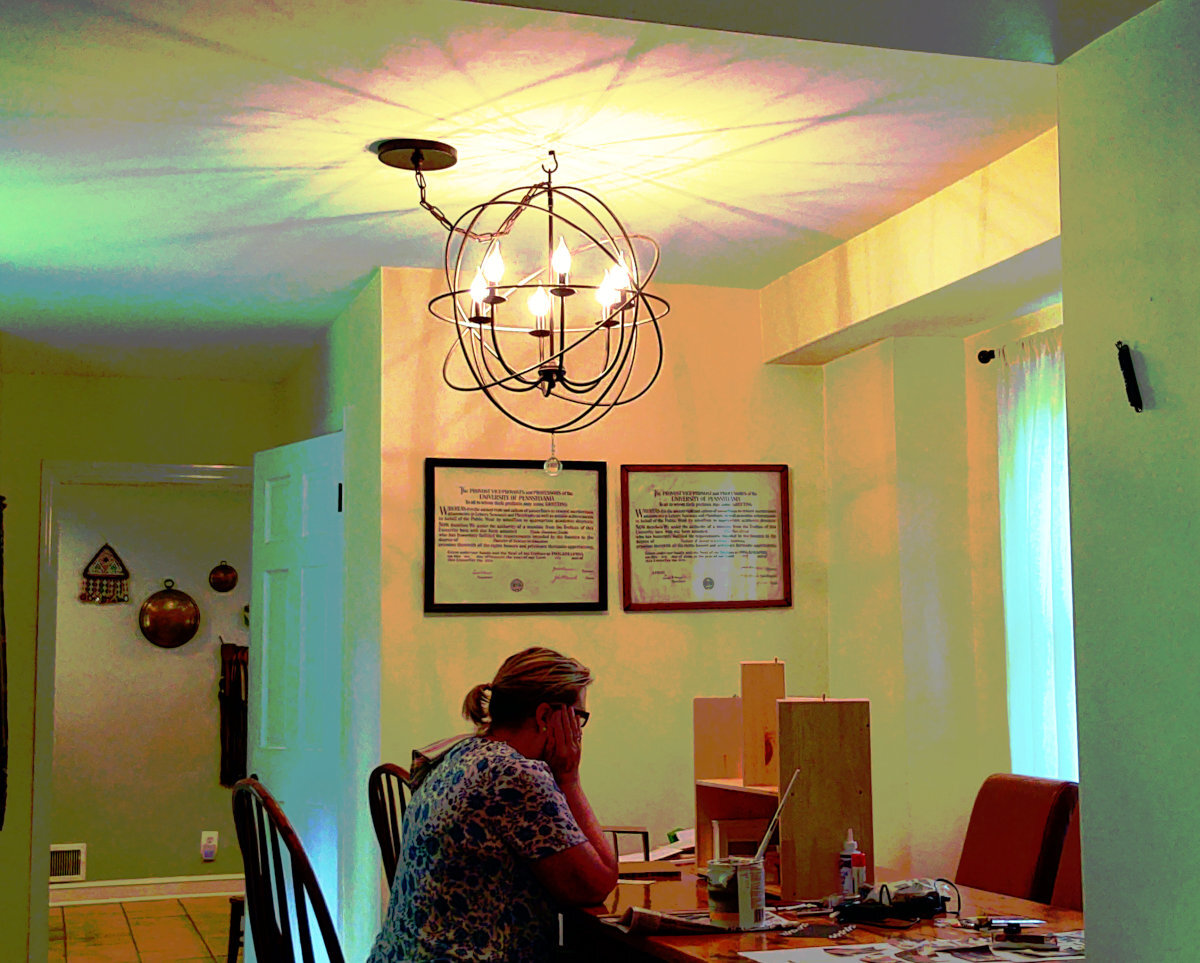
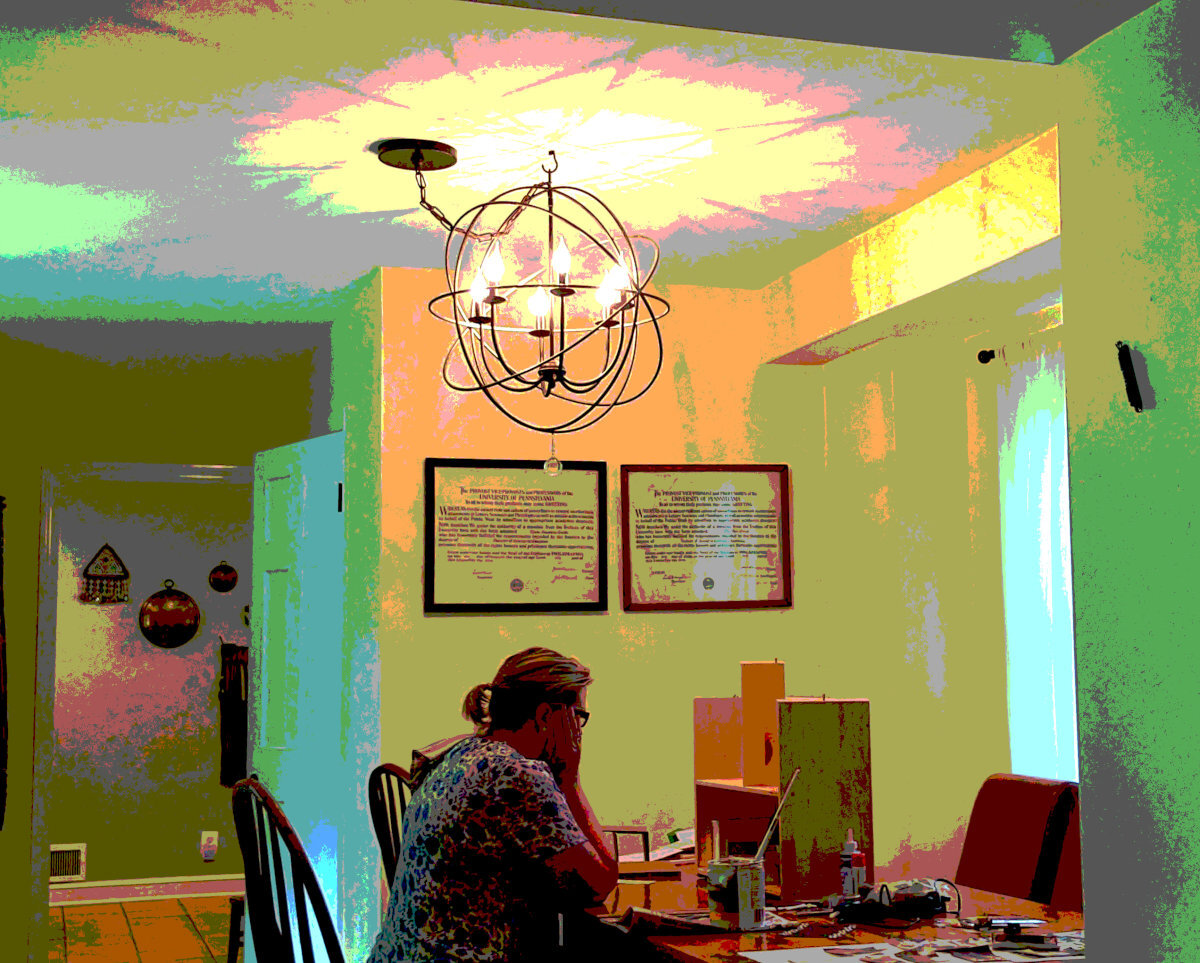
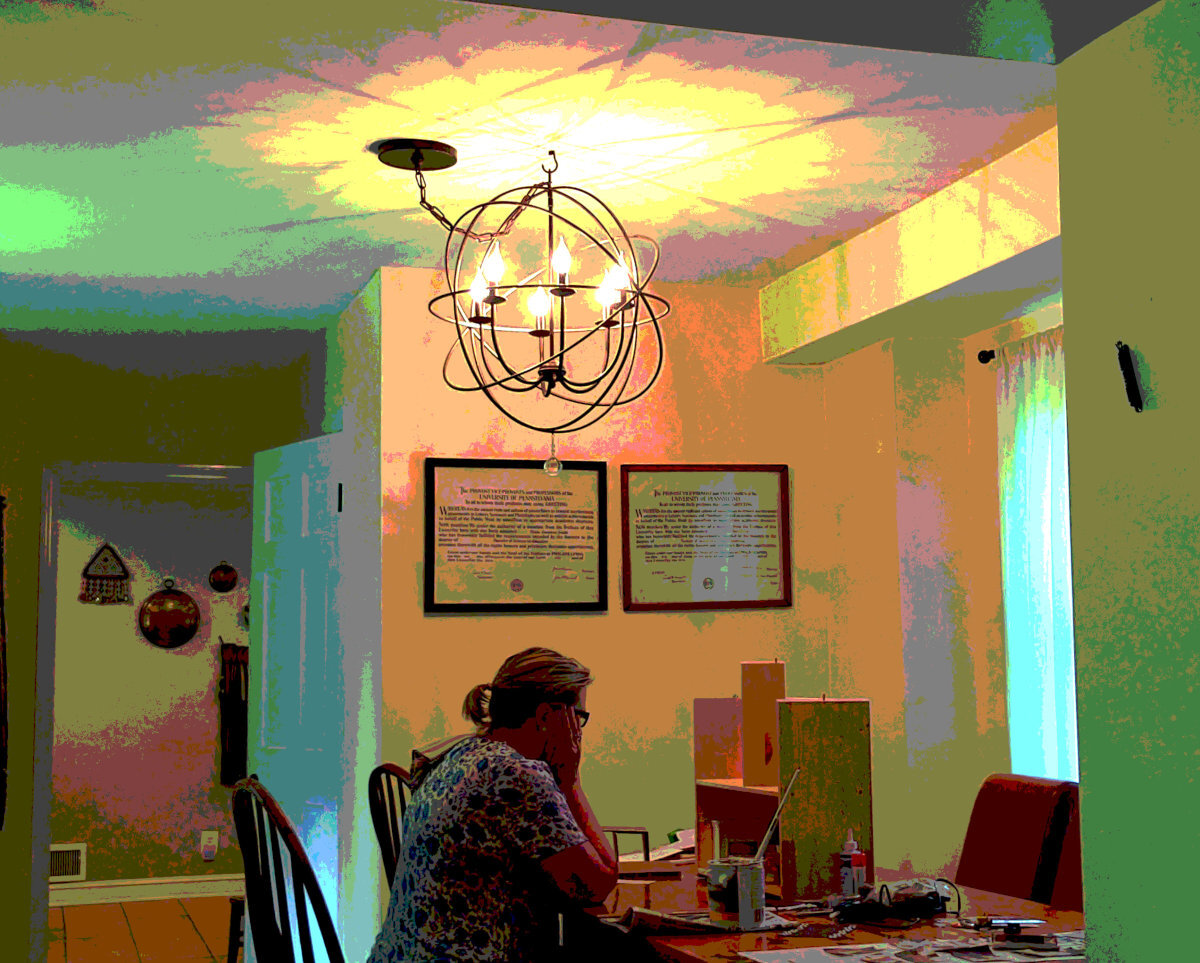
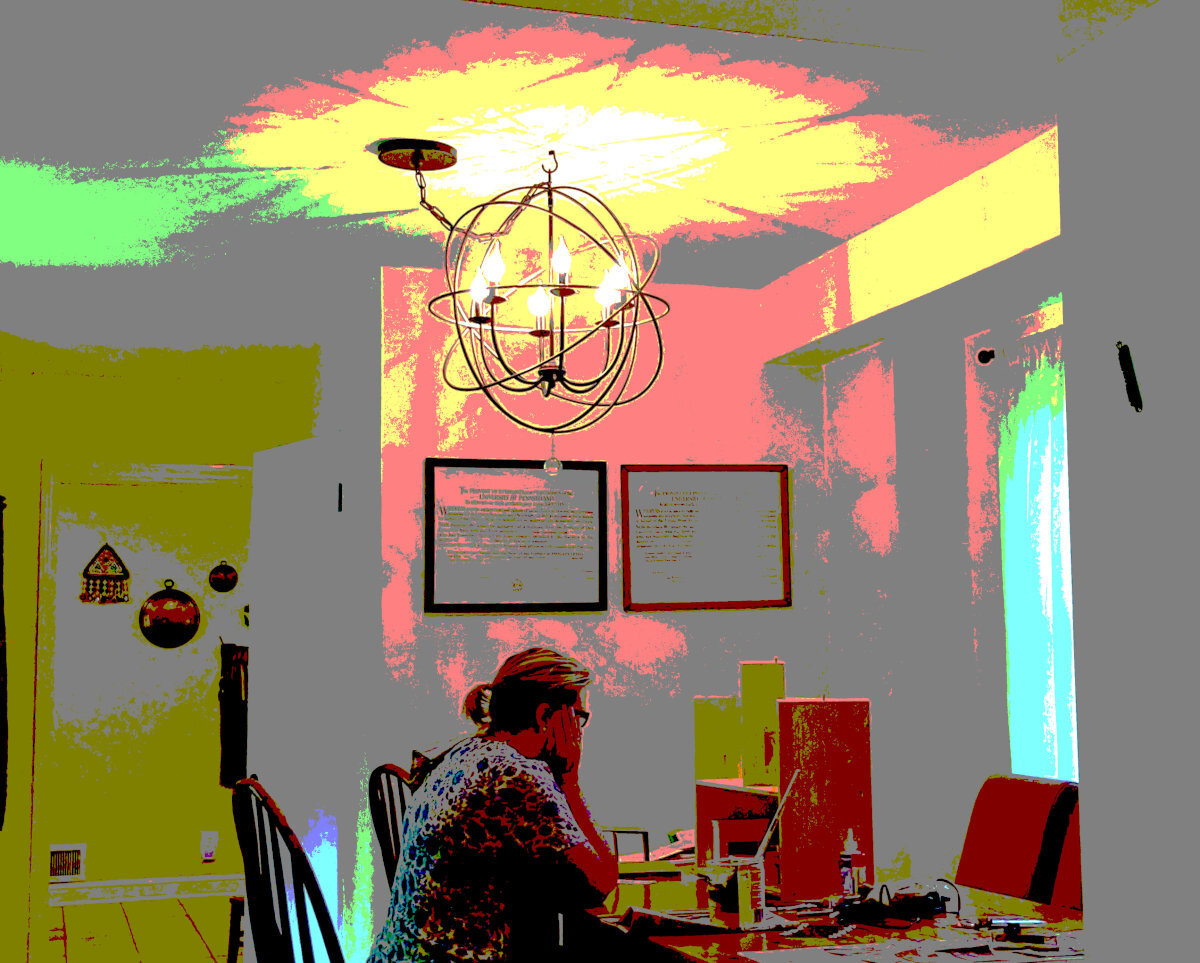
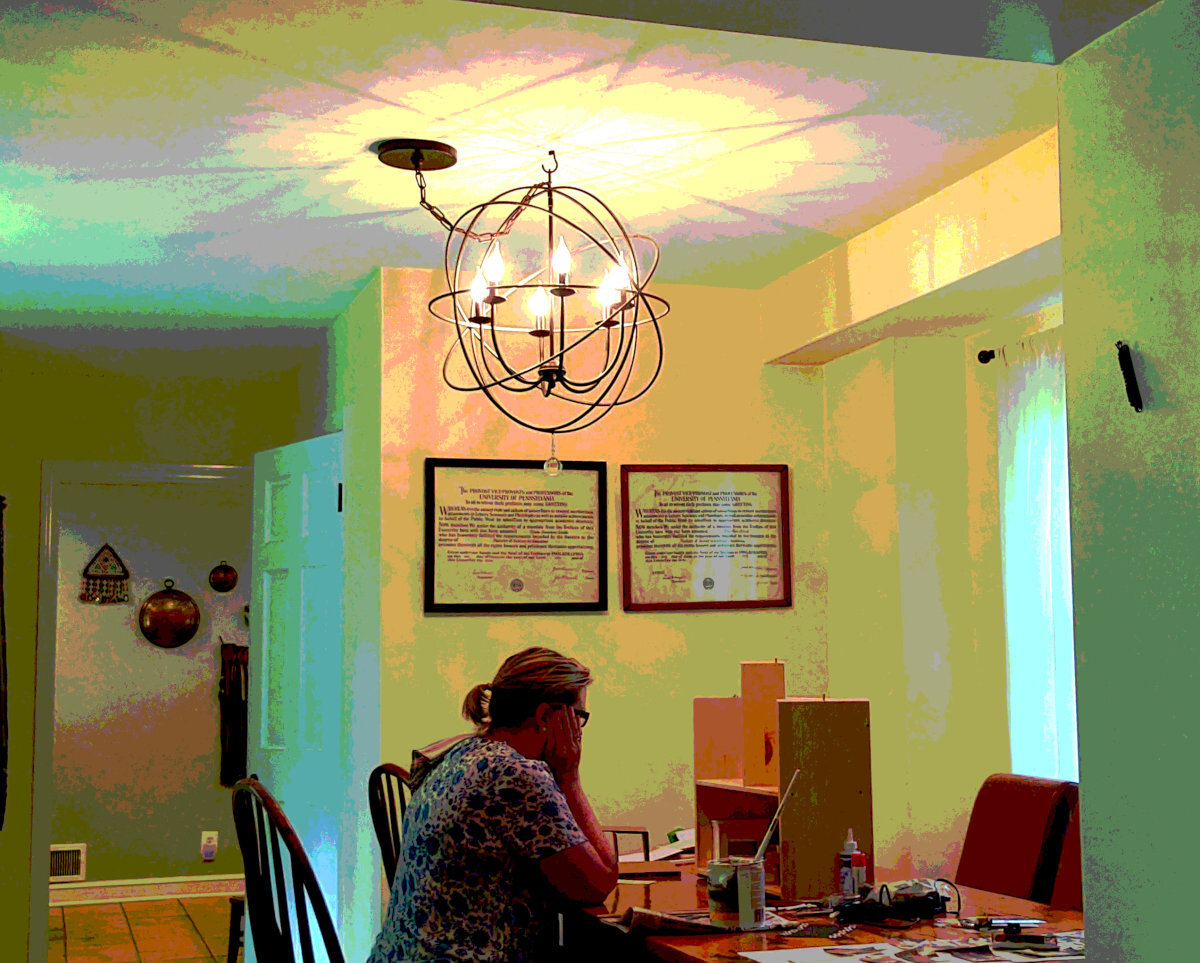
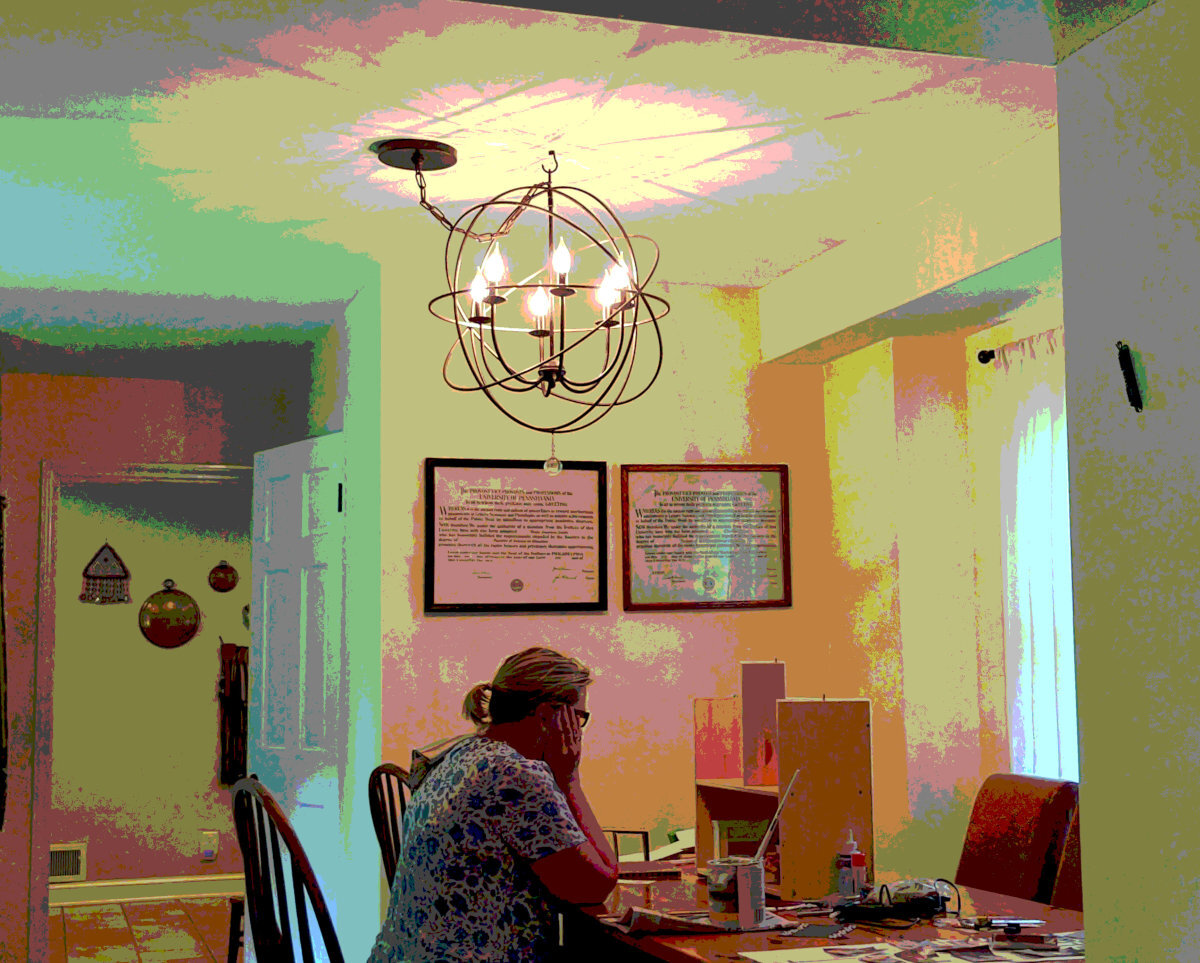

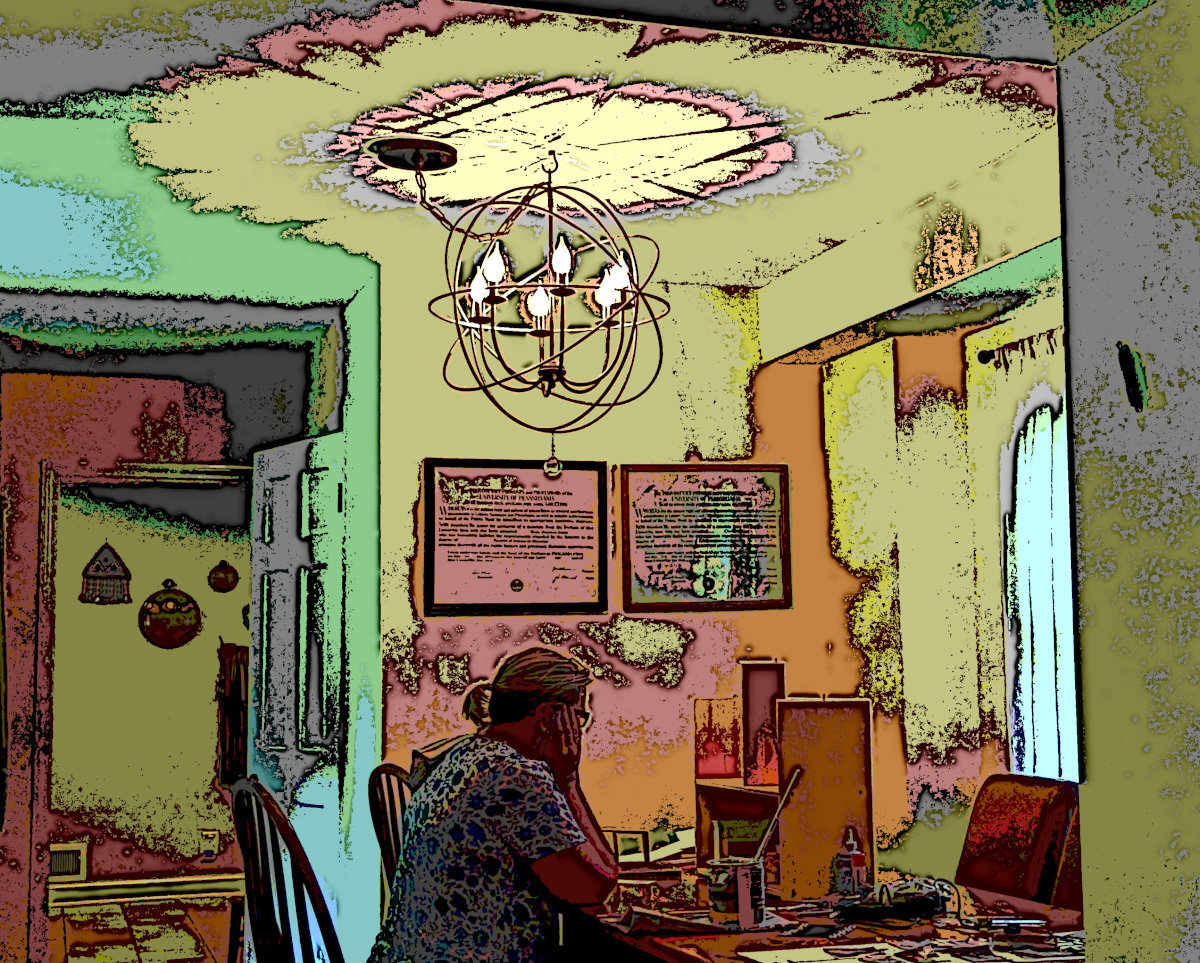
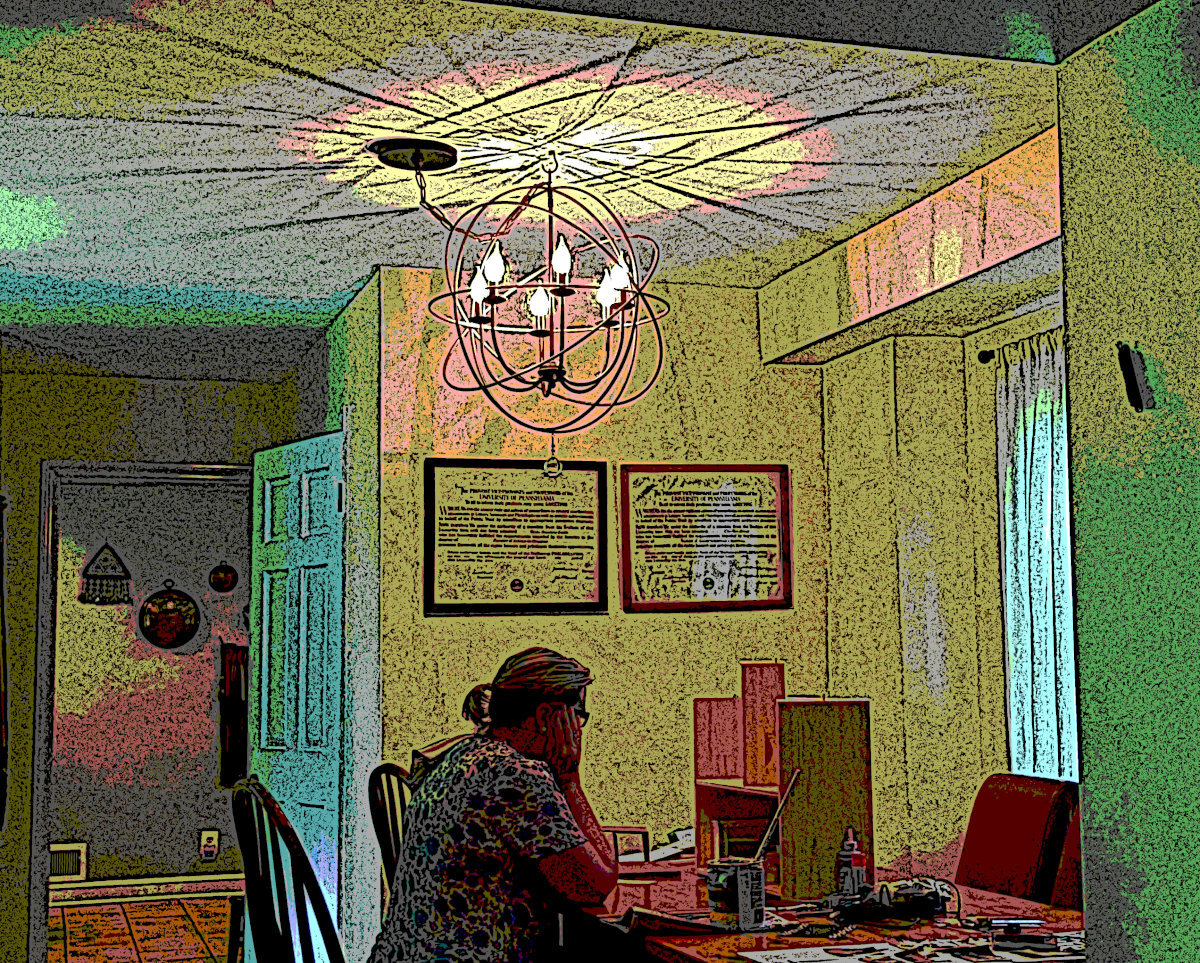
Further Notes on Human Evolution, part 2
Continuing where I left off from my previous post…
… Still, we can glimpse that direction and purpose, using our own direction and purpose to guide our imagination. But more importantly, by seeing purpose and direction in evolution -- as in our own lives -- we can begin to positively effect our own evolution towards a better future, one that I am inclined to imagine would be more peaceful, respectful, balanced, and healthy than the present state of our species and its civilization.
Perhaps predator humans at the crest of local power and wealth waves might prefer to imagine a feudal, slave society that serves them and them alone, but I’d like to point out that human development clearly shows that predator species and predator individuals will be extincted (found less fit) more rapidly than other, less predatorial types. The saber-toothed tiger, the lion, the modern tiger, the cougar, the wolverine and so many other predators are targeted first by humans seeking to build a place for themselves. This is true for the most aggressive humans as well. Nature may create predators but it does not love them. And human nature has a particular antipathy for predatorial types.
Thus I speak of our species emerging into the “teenage” years of its life span, and the implications that has for us human children as we begin to grasp and manage our purpose, meaning, and direction, that is, as we begin to move towards greater maturity.
Like all growth in a population, some individuals will begin to mature a little sooner than others. Some individuals (we often call them prophets, sages, geniuses) speak to and for our future with guiding principles and values. Particularly meaningful to me are teachings that promote one law for all people alike, and for taking care of the needy and most vulnerable in society. Our prophets and geniuses are not perfect, and they may also say many things that are still embedded in adolescent thinking. But they have seen a glimmering of the future, and that can inspire and guide us.
Others speak forcefully and with great popularity, and yet they speak from the moral and social ignorance of our species’ prepubescence. They are fearful of people and ideas that they don’t know (xenophobic); predatorial towards those that are different or weaker (bigoted); certain of their knowledge, though it is profoundly limited (fundamentalist, authoritarian); without regard for or awareness of their impact on the world around them (anti-environmentalist); and/or concerned only with matters of status (idol worshiping). These are people on the back edge of the evolutionary wave, and yet they are often the people whose voices are the loudest or most popular.
One’s status in society is not a measure of one’s moral and spiritual growth. Indeed “high status” may be a measure of a person’s lack of growth, showing s/he is mired in the dogpack values of ego, aggression, vanity, and consumption. The same is true for those obsessed with power. Often very backwards in their moral and social values, those who seek political power are often among the people most resistant to societal growth, and most opposed to implementing legal and structural changes to facilitate unbiased justice, equal opportunity, and a sense of economic security which will enhance creativity and accelerate our intellectual, moral, and spiritual development.
The dogpack mind is very powerful in our psyche, and very essential. But I believe our evolutionary growth allows for the possibility of diminishing its most destructive aspects, such as unrestrained aggression and fear, while enhancing the dogpack virtues of social responsibility and semi-egalitarian authority structures. Individual commitment to that kind of evolutionary growth is a first step in its manifestation.
Further Notes on Human Evolution
Here’s the opening paragraphs to a short essay that continues to develop the logic of a critique of pure randomness in evolution. My thesis: evolution is purposeful and directed, altho we have extremely limited access to what that purpose and direction is.
~~~~~~~~~
As I have suggested elsewhere, we humans are entering our teenage years as a species. In the last 5000 years, in this dawning of “civilization,” we have grown from adolescents, perhaps about 10 years old, to young teenagers, say 13 years old (by way of comparing species-time to individual-time).
We have grown from an innocent but raw and unmediated selfishness, guided by a “dogpack mind” that Darwinians have enshrined as ‘survival of the fittest,’ towards an emerging “teenage” sense of the value of other, and of community, while still gripped by the dogpack mind that drives us towards all kinds of self-serving bigotries and forms of violence.
But let me step back for a moment, to make clear my context.
What is meant by this term ‘survival of the fittest?’ It is generally interpreted as meaning that life and its evolution is changing randomly, that is, without specific purpose and without intended or even definable direction, serving temporary imbalances in nature. Fitness is just a way of describing temporary species survival. Is a lion more fit than a sparrow? Is an oak more fit than a fern or moss or algae? Such an understanding of evolution implies very specifically that the process is godless. Evolution has no purpose or direction. It only serves temporary states of ‘fitness.’
Now, it is conceivable that the universe is purposeless and directionless, but I don’t believe that it is. In fact, I don’t believe that anyone, literally anyone, believes that it is! In our heart of hearts we all believe that there is meaning and purpose in our lives. We also believe there is purpose in our collective lives, as well, although we may bitterly disagree on what that meaning and purpose is. As a species we humans are utterly absorbed in and devoted to matters of purpose and direction. Indeed, the loss of hope in the purposefulness of our lives drives us to suicide. But even suicidal actions that address such a state are in themselves a desperate grasping at meaning, at purpose, in which the suicidal individual can at least direct one last act towards rejecting their hopelessness and helplessness.
And if we human beings are so driven, so utterly absorbed in the idea of meaning, purpose, direction, is this then a species-wide delusion?
I believe not. The very term ‘evolution’ inherently involves direction, and our obsession with exploring our evolution is a function of the purposefulness that shapes our every thought. The ideology of randomness in evolution is the real delusion! It is a positivist reduction and simplification, and while false, it does serve the purpose of helping us collect data with, perhaps, a little less emotional and ideological baggage. In this way it can be seen as having some value, even though it is neither truthful nor accurate in its understanding.
That said, we must be very careful not to assume what we mere humans, a genomic wavelet hurtling forward on the vast tidal wave of life-evolution, have any but the dimmest understanding of the direction and greater purpose of evolution. Indeed, the universe, and the purpose that drives it is arguably something like a quarter-billion times vaster and more enduring than the flickering space-time of our individual lives (assuming the universe is 13.7 billion years old).
Still, we can glimpse that direction and purpose, using our own direction and purpose to guide our imagination….
Eternal Jew: scenes in Majorca
Our hero has been involved in map-making, a profession surprisingly dominated by Jews in the 100 years before Columbus. These maps were fundamental to the European expeditions around the Cape of Good Hope to India and then to the New World. He is now in Palma, Majorca, arguably the capital of map-making in the mid fifteenth century.
Here’s a prose excerpt, followed by the original poetry in its altered English:
And in them days, Aragon’s noose was squeezin’ tighter on the church’s lands, trying to choke out heresy, and alternate readings of their bible tales, and personal knowledge of God in the world. And as for pagans, Muslims, and Jews, a sword was pressin’ against our necks. Hard to breathe; harder to move. Like we fell into a vortex of hell in Dante’s tale of hopeless souls; trying to find a reliable map out of these hell-lands coiled in hate.
But forgive. I’m rushin’ ahead of myself. I still must describe the secret lives hidin’ inside of Palma’s walls. And Batkol insists that I reveal the book she writ in Genoa.
Like I says, that priest hustled us thru private courtyards and mazy ways an into a house with nary a knock. Expectin’ a parlor, much surprised, we stands in a kitchen, fragrant with bread. The cook nearly drops her tray of cakes, and stifles a scream,
”O Father Enrique! You frighten me.”
“So sorry, Noor. Senor Vallseca awaits us. We came the back way to save time.”
She leads us into a sittin’ room.
Juan Vallseca
Man of stone. Face a mask. Sits like sphinx; desert winds slowly etch his mask away; slowly pit his stony eyes. Flickers of inner light escape. He taps his finger on his thigh. His stone casting begins to crack. As if an echo from a far hill, words escape from his chest, words of welcome from a distant place.
Father Enrique
“My sphinx-hearted man of faith, my dear friend, Senor Juan...”
A well-trained hound at his master’s feet, tho sharp of tooth and mastiff tall. Knows the hand that feeds him well, that makes him sit or whips his haunch. None too fawning but well restrained.
Gabriel Vallseca
Puppy scampers, yip and yap, nipping toes, yip and yap, chasin’ his tail, yip and yap...
In walks Gabby with a wide grin and a flaky pastry in his hand, crumbs flying as he says hello.
Father Enrique
The light dims and shadows streak his etched cheeks, his deep eyes now enlarged to dark pools as evening dulls the rosy clouds, and the bright sky turns deeper blue. Is that the Nazarene I see on a further hill, his robes blowing in the risen wind; or only Paul, sharp of tongue and dark of thoughts, come to Rome to challenge law? His voice is soft but his fist is clenched, and his next words transform the mood...
“What, now, are we to do?...”
Here’s the original poetry:
An in them tiemz Aruggonz noos
Bin skweezen titer on the cherchen lanz,
Tryen a choke owt harusseez
An alternet reedz a thaer bibel taelz,
An persennel knowenz a God in the werl.
An az fer pagen, Mouzlem, an Ju,
A sord wer prest uggens ar neks;
Hard tu breeth; harder tu muve.
Like we fel intu a vortex a hel
In Dontayz talen a hoeples seelz,
Tryen a fien a reliyubbel map
Tu exkape theze hel-lanz an koyelz a hate.
But fergiv. I rusht uhhed a myselv.
I stil mus deskribe the seekret lievz
Hiden inside a Pawlmuhz wawls.
An Butkoel insists that I reveel
The bouk her rit in Zhennovuh.
Like I sez, that prees husselt us
Thru privet kortyardz an mazee wayz
An intu a hows with naree a nok.
Expektenz a parler, much serpriez
We stanz in a kichen, fraegren a bred.
The kouk neerlee drops her tray a kaeks
An stifelz a skreem.
“O, Fother Enreek! Yu friten me!”
“So sawree, Noor.
“Seenyor Valsekkuh awaten us.
“We kum the bak way az saven time.”
She leed us intu a sitten room….
Hwon Valsekkuh
Man a stone. Fase a mask.
Sits like sfeenx; dezzer winz
Slolee ech hiz mask uwway,
Slolee pit hiz stonee iy.
Flikkerres inner lite exkape.
He tap iz feenger on iz thi.
Iz stone kastenz start tu krak.
Az if an ekko frum a distan hil,
Werdz exkapen frum hiz ches,
Werdz a welkum frum a far plase.
Fother Enreek
“My sfeenx-hartes man a faeth,
“My deer fren, Seenyor Hwon...”
A wel-traent hown at iz master feets,
Tho sharp a-tooth an mastif tawl;
Knoez the han az feed him wel,
That make him sitz or wip hiz honch;
Nun too fonnee, but wel-restraenz.
Megillat Esther: 6 versions of a page of calligraphy
As Josh closes in on the last pages of the manuscript (and I fall further and further behind him with my work), I thought you might like to see a recent rough-out page he produced, to fine tune the spacing before committing to parchment. Here’s ten versions of it thru various ‘lenses’.
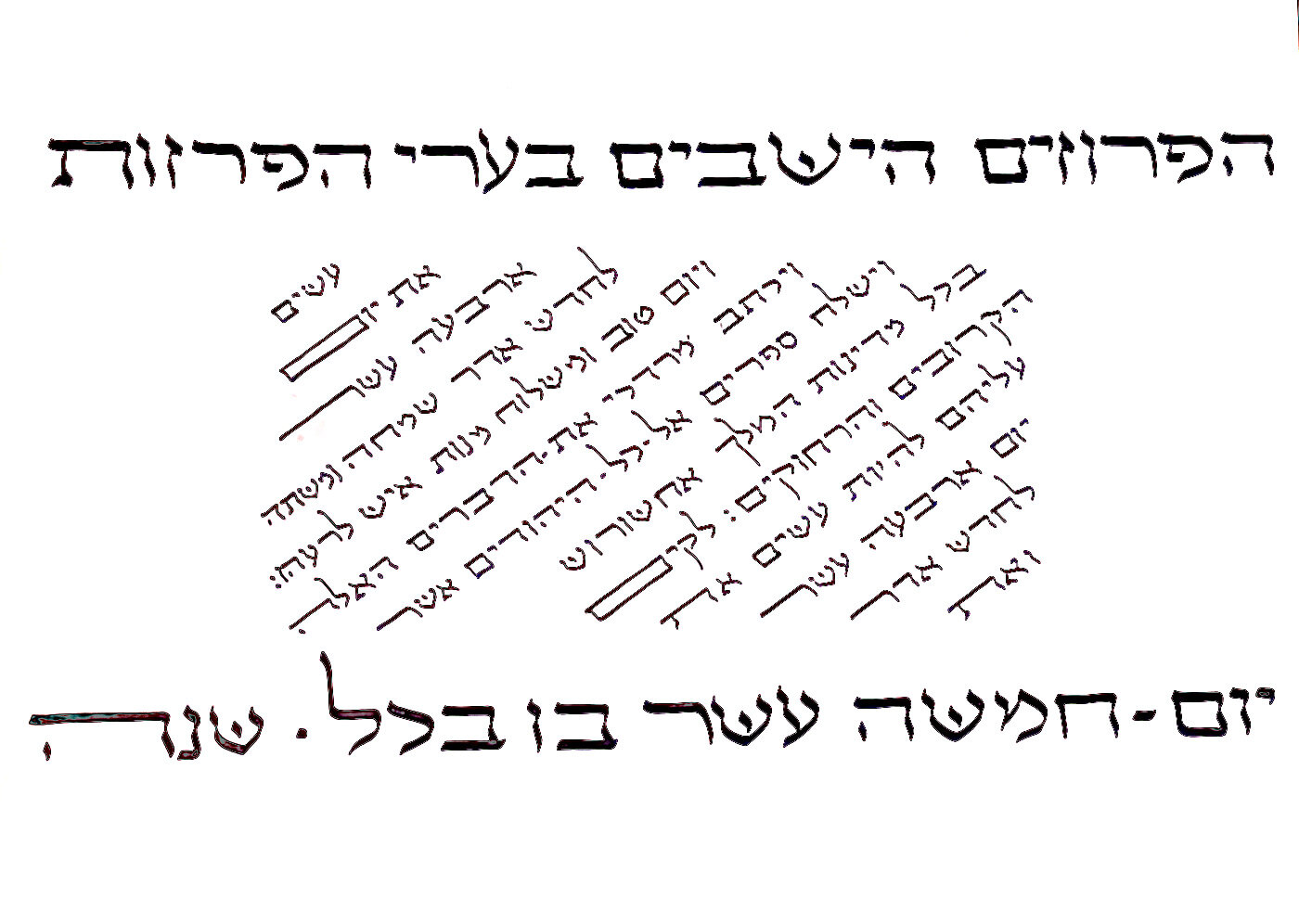
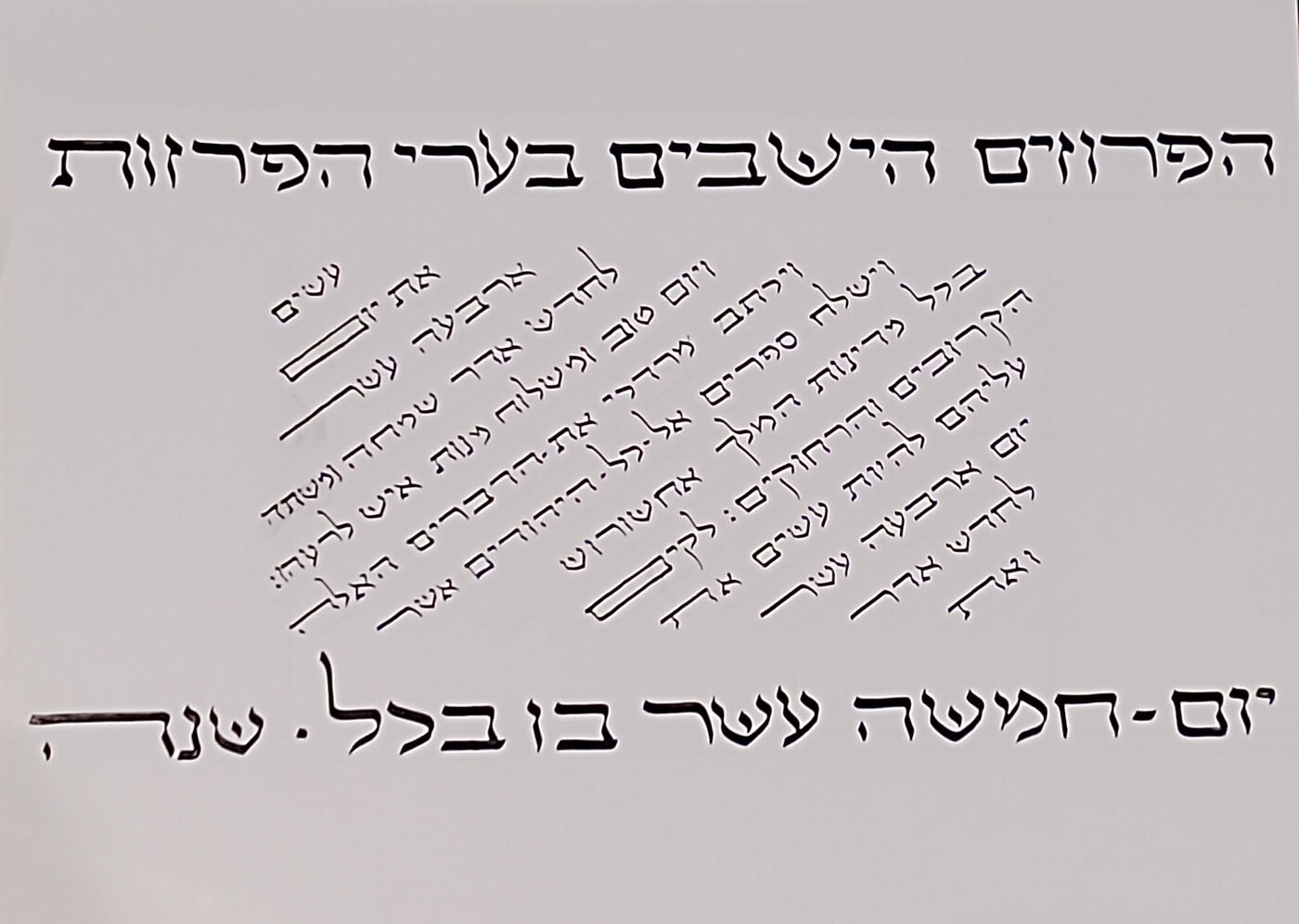
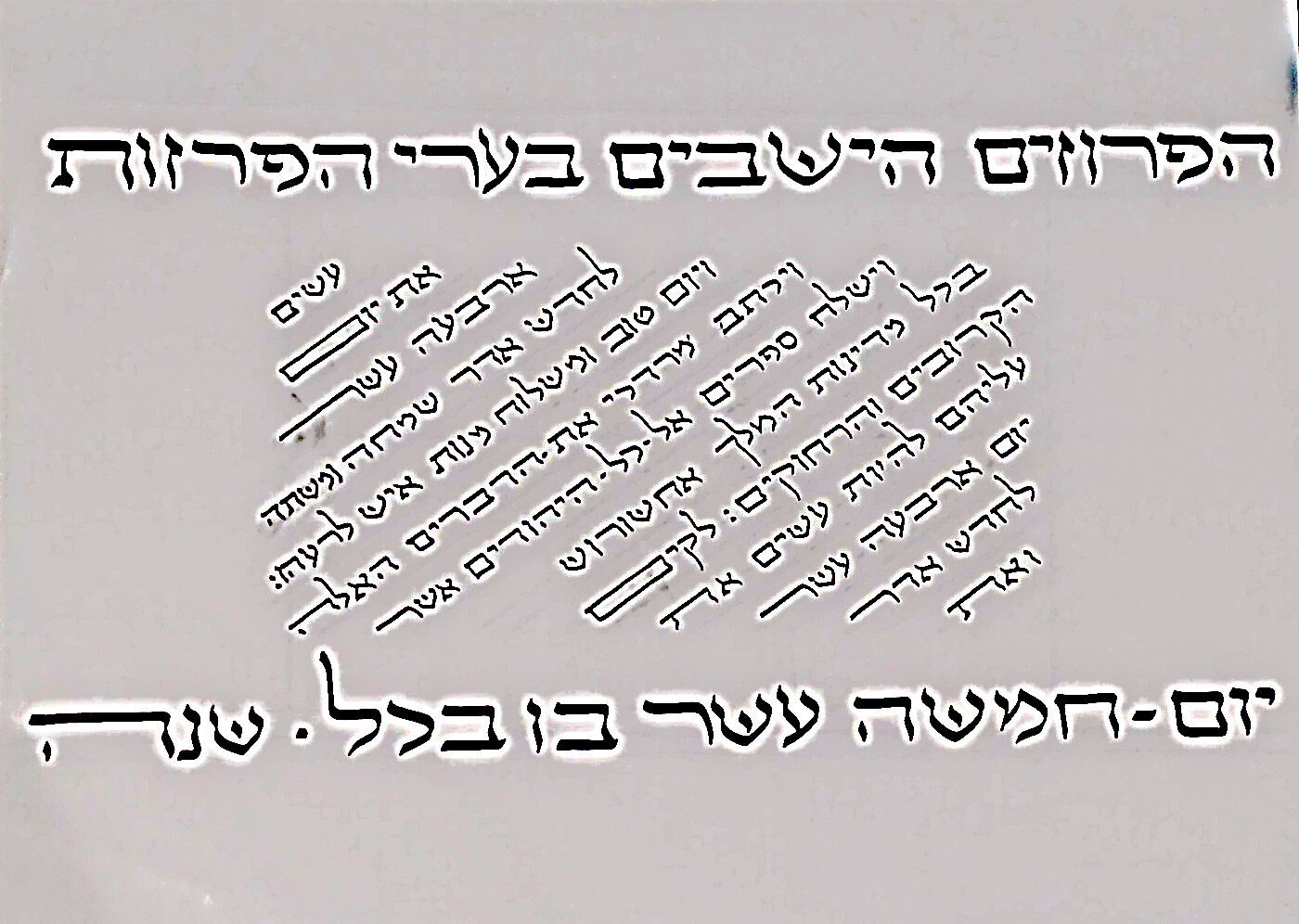
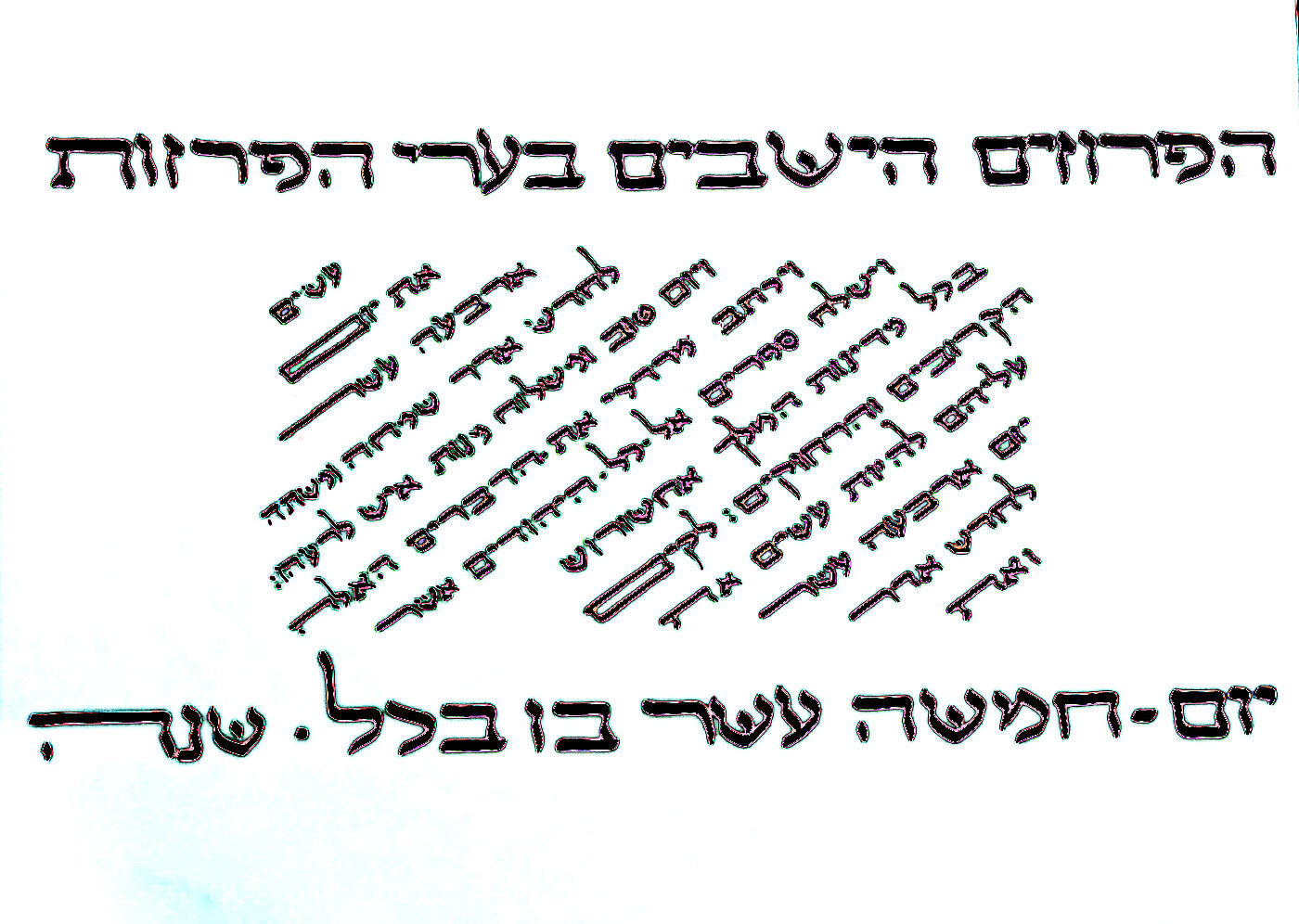
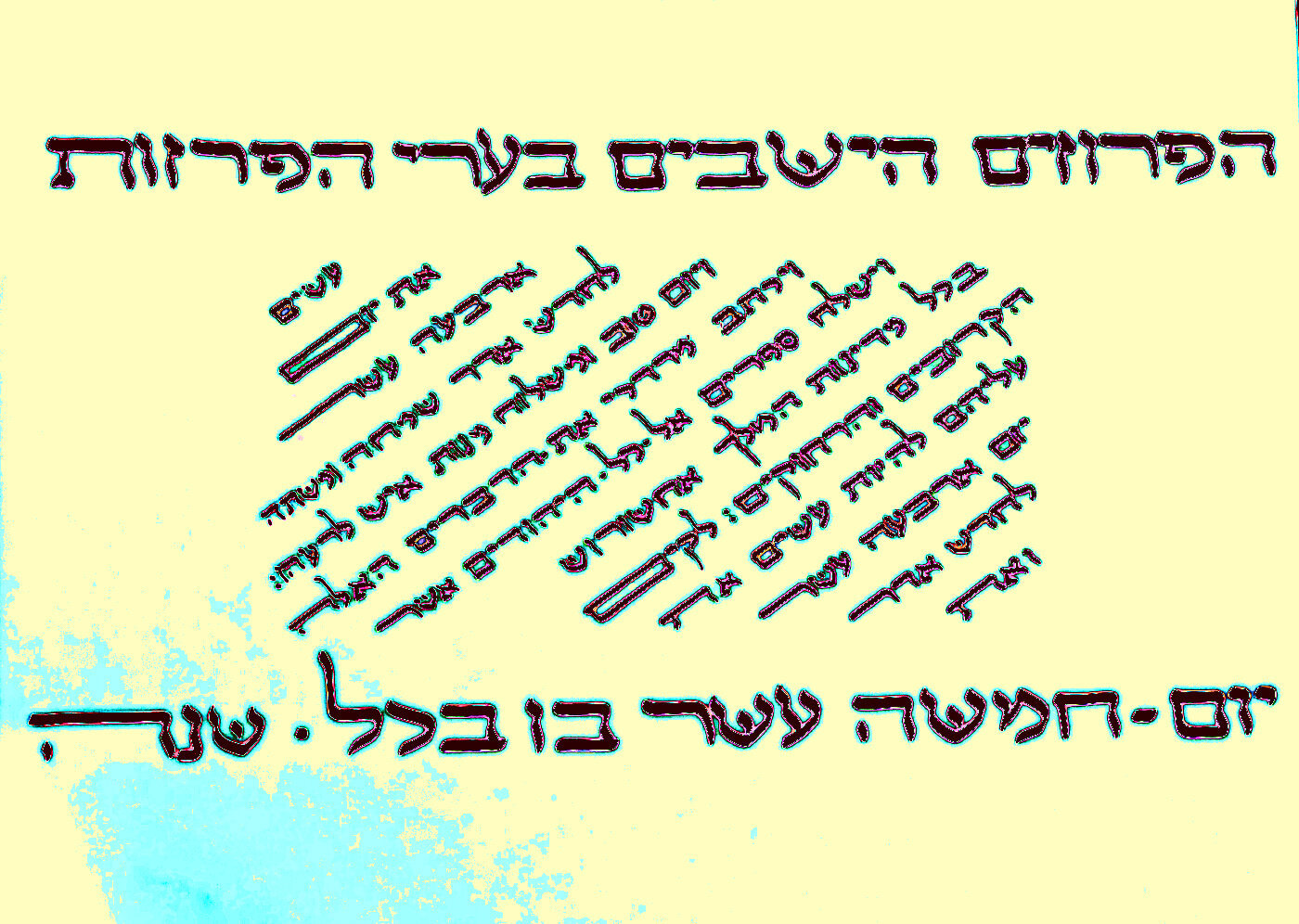
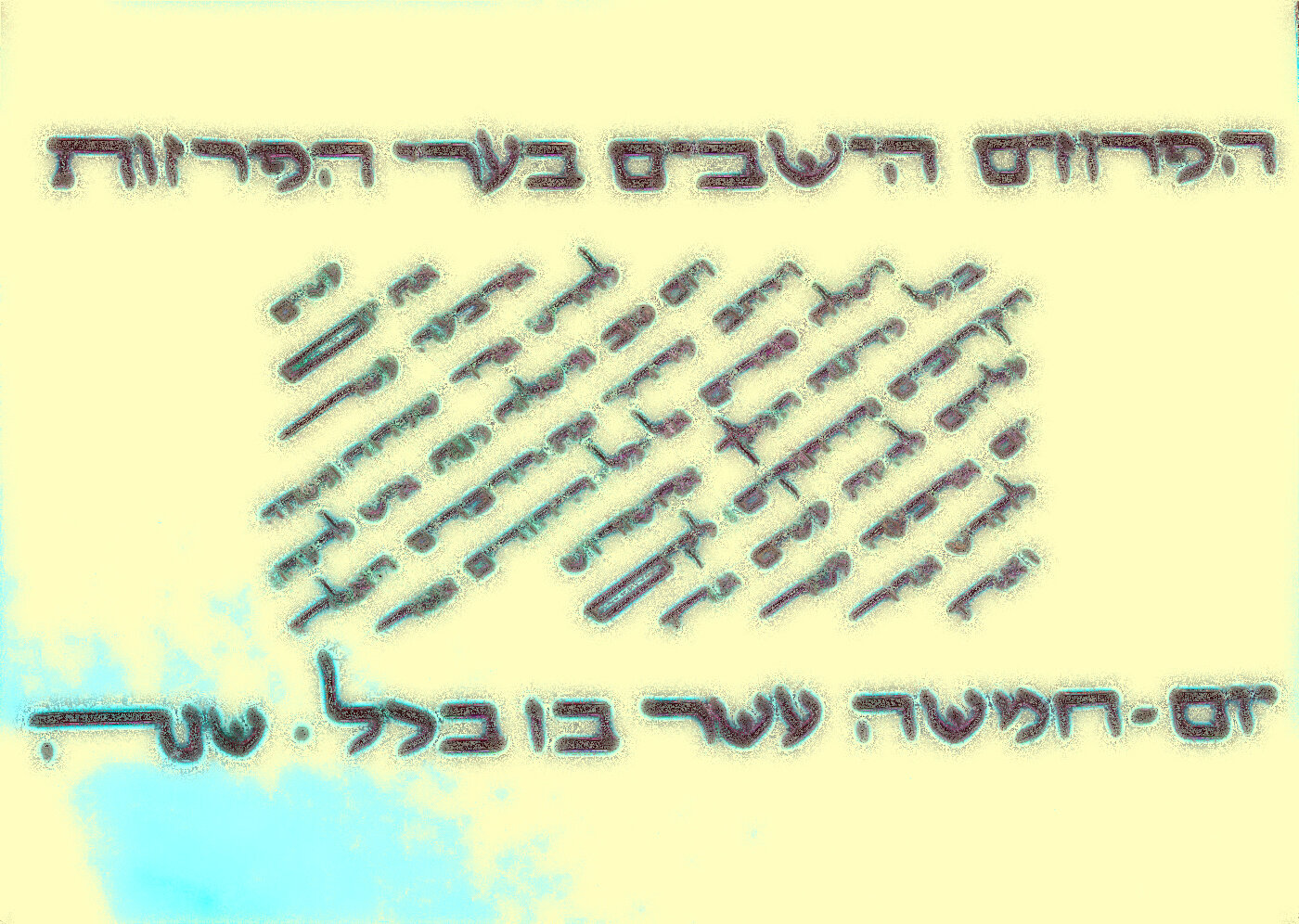

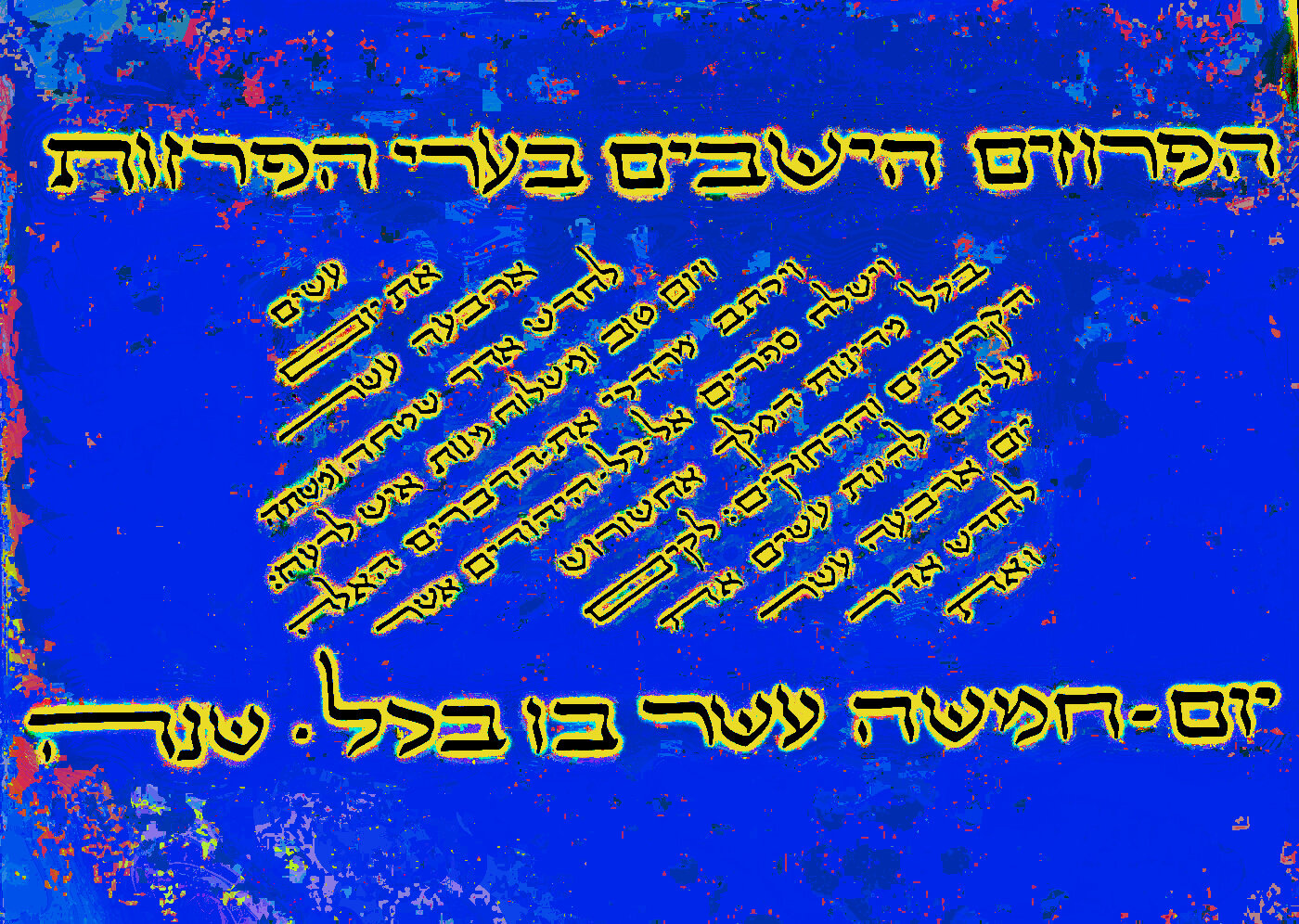
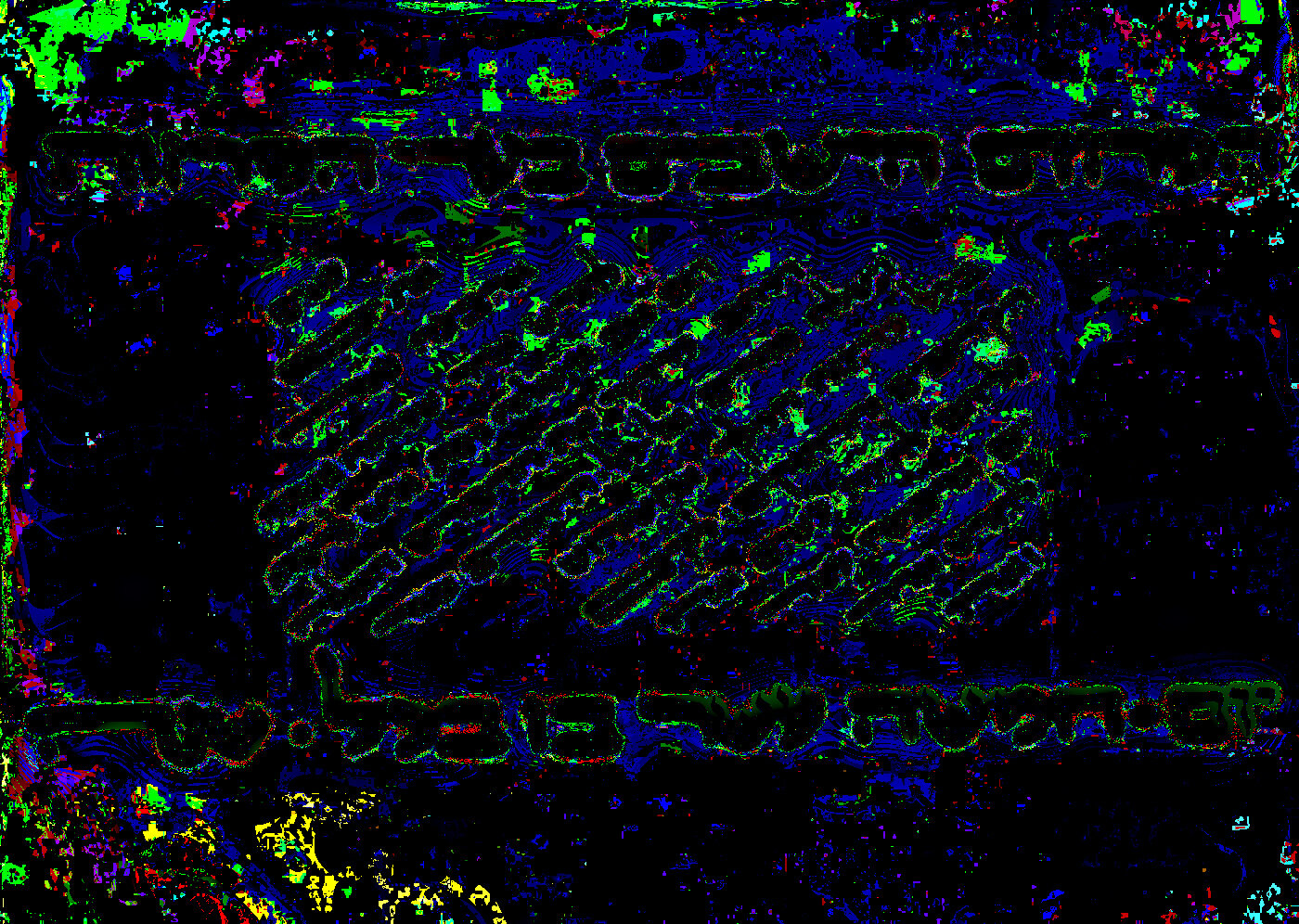
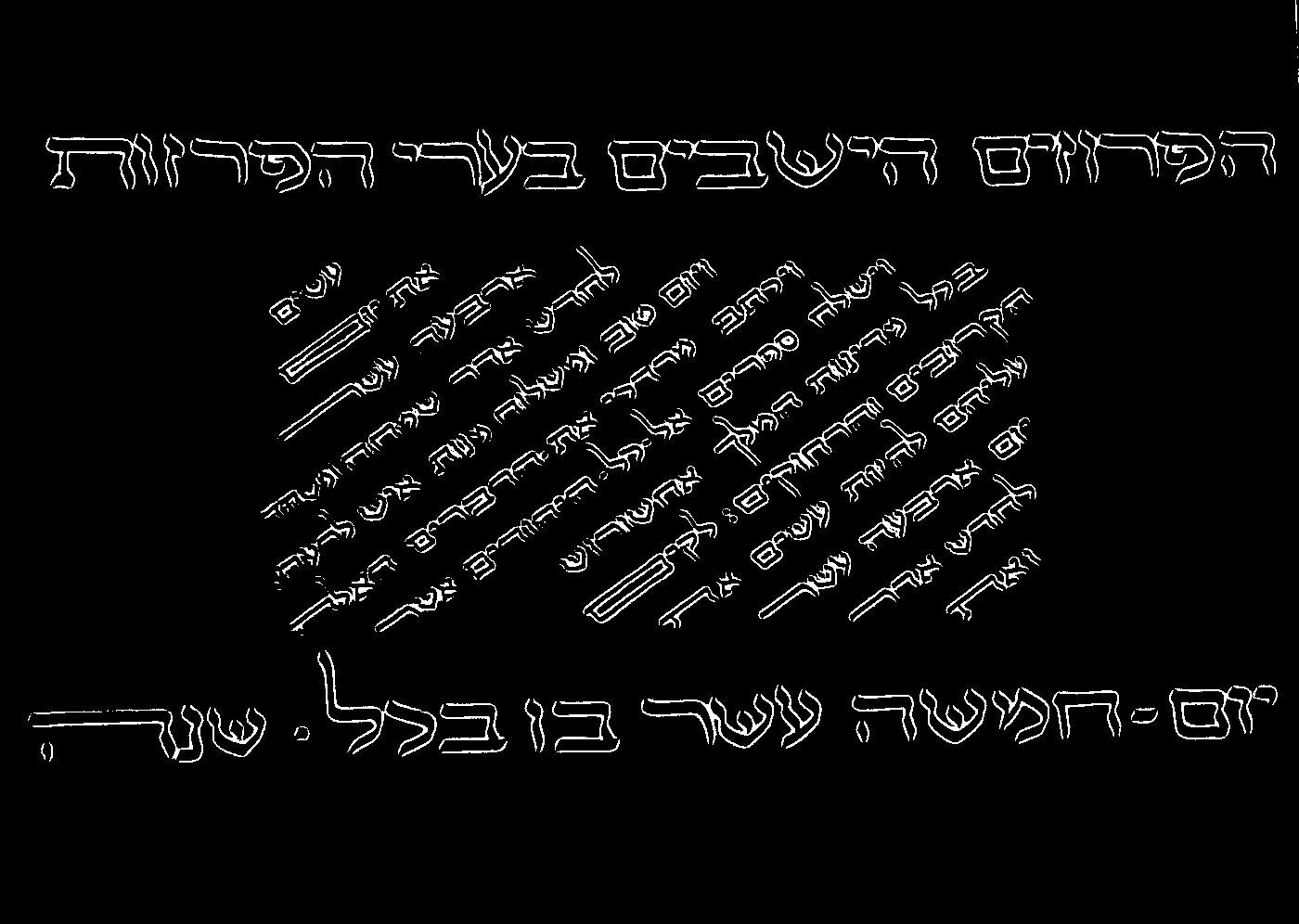
Eternal Jew's Rescue of Batkol
Here’s a new scene from The Atternen Juez Talen, translated out of MetaEnglish poetry into standard prose.
These events take place in the hills outside of Genoa, where Saadya, the Eternal Jew and his wife Batkol have settled. The year is about 1420 CE.
While I be bent to a draftin' desk, pourin' thru maps ...
Batkol set out on a different route. Leavin' such chaos and madness to me, she discovered that herbs and cures from extracts, infusions, oils and salves be well-developed in Liguria's hills....
So off she gone a second time, out to see them sorcerous dames, me absorbed in work, and yet concerned for her wanderin' alone. And my worries increased day by day, til after a week my mind won't bend to interpretin' sketches and decipherin' scrawl.
After mornin’ prayers I'm sittin' at the bench, and I thrown up my hands.
"I gotta find my wife, now gone over a week. That ain't right. I'm worried sick."
Out the door and up the road I hustles. I remembers a town up the river where she first gone to learn about healers in the hills. Walkin' all night, I arrived the next day, and begun askin' about women that heal. Well, men, they don't know a pimple from a pox. But women, soon as they hear me ask where that healer dwelt, they clams right up, all suspicious and evil eyes.
So nothin' for it. I'm up the road to a further hamlet. There I tells some juicy yarns about my wife. I exaggerates just a teeny bit, sayin', a wonder healer she be, with many a potion to soothe the soul. There's chitter and chatter a-plenty now. That gone on for a day or some, when a miserable crone come beggin' me to brang some potions for her sickly girl.
"I'll send my wife in a fortnight or so."
says I, and her shoulder sags like a roof on a rotten hut; she's all dismayed.
"That won't do, oh no, not at all. I needs them remedies right away. Guess I must go to that sorcerer,"
says she, and I mumbles,
"Suit yourself."
But soft and secret I watch her close. The very next morn she's out the door and up the road and down some trail and onto paths only animals use, and come to that witch.
I expected to find Batkol inside, when I knocked and gone in. And there, that witch starts screamin' at me, and pulls a knife, howlin' the while like some wild and injured animal --
What the hell was Batkol doin' there amongst such souls untouched by God? --
Thankfully, my walkin' stick kept that hyena woman at bay while I drags Batkol down the trail a ways, til she collapsed. I carried her -- fragile as a dried out stick of birch -- til I couldn't hear them howls no more. Then I built a litter to lay her on and drag her nice and comfortable thru them hills and hamlets and towns. Many a gasp and askance look we drawn, but nary an offer of help -- like I been some brute that beat my wife -- til we come to the outskirts of Genoa, where I hired a wagon for the cobbled streets.
Just sayin' #3: LGBQT and biblical texts
Dr. Greg Barker, an exceptional teacher, posted an article on his teaching/coaching website concerning a Jewish organization with many queer members. Empathetically, he posed the question, “Which teachings in Judaism could be used to support the inclusion of the LBGTQ+ community?“
This is a subject that has received much attention by Jews, so I will not be offering any dramatically new insights here, but perhaps this post can stand as a brief summary of how Jews have opened their eyes, their minds, and their texts to a more accurate and expansive understanding of the norms of human sexuality.
Let me state first and foremost that, for the vast majority of Jews in the US and Western Europe, the issue of total acceptance of the LGBTQ+ community has already been fairly thoroughly resolved. That community is widely welcomed in most non-Orthodox shuls (synagogues), and even in some Orthodox shuls. As for Israel, I’m not informed enough to know whether “vast majority” also applies there, or just “majority.”
As for the specific issue that Dr. Barker poses, let me mention just a few verses and teachings.
As noted in the helpful article at the My Jewish Learning site, here, a common response to Leviticus 18:22 & 20:13 (the primary but not exclusive verses that have been used to vilify queer sex) has been with the often repeated demand that 'there must be one law for the home-born and the stranger alike,' with 'stranger ' often being replaced by (or understood to mean) 'weak and outcast' or 'orphan and widow'. Quoting the My Jewish Learning article:
This verse is one of the most problematic in the entire Torah; its meaning seems to be quite obvious, and yet it is extremely difficult for many Jews to take at face value. Could the Torah — which has at its core the message that Israel must not despise or abuse the weak, helpless, or outnumbered in its midst — really be declaring that loving relationships between two consenting adults is abhorrent, even worthy of the death penalty?
To that end, Torah provides us with another text to challenge our narrow understanding of human sexuality. In Genesis 1:27 we read:
And God created man in His image, in the image of God He created him; male and female He created them.
This verse can be read quite literally as declaring the androgyny of humans, countering any homophobic inclination readers may have.
Judaism rejects a fundamentalist understanding of Bible. The Talmudic sages, who lived 1000-1500 years after the Torah was composed, said that every verse of Torah has 70 (or, at least 70) viable interpretations. These sages, with their expanded vision of Torah and Jewish practice, formulated and instituted the 2nd great reformation of Judaism. (FYI, the biblical Prophets instituted the first great reformation, and we are living now amidst the 3rd great reformation which began with the Enlightenment.) So if we look at Leviticus 18:22 (which is comparable to Leviticus 20:13, but without adding the death penalty) it’s translation is very reliably rendered:
Do not lie with a male as one lies with a woman; it is an abhorrence....
We can read this verse quite simply and honestly as NOT prohibiting males from having sex together, but simply saying they shouldn't do it the same way men have sex with women. I'll leave further explication to your imagination. Nor does the text say ANYTHING about lesbian sex. This kind of reading of these verses is in no way contorted. The Torah has NO problem with stating its intentions clearly. "Thou shalt not murder." If Torah wanted to preclude any kind of non-heterosexual intercourse, it could have very easily done so. BUT IT DIDN'T. Not anywhere.
Now, I'm not saying that traditional Judaism didn't use these and similar verses to promote a homophobic agenda and to produce homophobic constraints on behavior. I'm simply saying the TEXT is open. Human minds and hearts are often not open; but that's a different problem entirely, at least in my view.
Finally, as the My Jewish Learning site (and many others) note, the Hebrew term translated as "abhorrent" or "aberrant" (etc) is "to-ayvah," which is a term that is used almost exclusively to refer to Canaanite religious practices that were forbidden because they were abusive or otherwise unacceptable. So it's likely that the text would have been understood in ancient Israelite times (~1000BCE to ~300BCE, when Biblical Hebrew was the spoken language — and thus, its implications well understood) differently than it came be understood in rabbinic times (post ~200CE, when Aramaic and other languages were spoken, and Hebrew was a learned language). This later, Rabbinic reading, is the understanding we have inherited. Originally, this verse may have been prohibiting sex as a cultic (religious) act, or it may have been prohibiting non-consensual male-male sex. (Again, there is no mention/prohibition of lesbian sex anywhere in Torah, or Bible, to the best of my knowledge.) Thus, if this is true, verse 18:22 quoted above might be more accurately translated as:
Do not have sex in a public, religious setting; it is an abhorrence....
or:
Do not force yourself sexually on another person; it is an abhorrence…
To sum up, by understanding that Torah is (and always was) a multivalent text, we can recognize at least 4 ways that the text allows us to dismantle homophobic interpretations:
1. It supersedes them with ethical values that are more pertinent and more elevated.
2. It uses terminology that is specifically and intentionally vague to allow multiple understandings.
3. It offers contradictory statements to open the text to a wider understanding.
4. It limits the applicability of the texts to unacceptable Canaanite practices.
No doubt, the astute and ethical reader of Torah will be able to find still other ways of expanding our practice of respect, justice, and moral responsibility. And here’s one final thought. This is NOT a matter of compassion. Compassion is a looking down on others; it is about pity and/or empathy for those who are less than us. LGBTQ people are not less than heterosexuals, and gay/lesbian sexuality, tho less common, is not aberrant in any way. Thus, I speak of expanding respect, not compassion.
Just sayin’.
The Limited Nature of Language
I’m working on a short essay that will be the tenth in my series, “Essential Notes on Linguistics”. Here’s a short excerpt:
[We must come to understand that] our senses are crudely finite, and our languages are crudely finite. In ‘reflecting’ their distinct worlds -- the physical world and the world of thought -- both sense and language are reflecting but the tip of the iceberg. Indeed, we would be more accurate to say we observe but a mere atom of the iceberg’s tip. And yet we imagine our sensual experience to be nearly complete and all-encompassing, and we imagine our language captures the whole of a thought, or at least the better part of the whole.
It is not so. Our languages, like our senses, are grossly limited in the fineness of their resolution. Consider: if we say someone is ‘kind,’ does the hearer (or even the sayer) know anything of the nature of that kindness, what generated it, its sincerity, its depth, how enduring it is in the actor, what positive and negative results it will or may generate in the receiver, what feedbacks will or may follow in its wake?
Our languages, like our senses, are also grossly limited in the range of their ‘apertures.’ We have but five senses and can, at best, barely imagine a 6th or 7th sense. None of us can even begin to imagine what kind of experience we might have with 10,000 senses! The same is true of language. A word is more a ‘closing off’ than an ‘opening up.’ It is more a wall than a window. Grammar is even more of a wall. If you think I’m exaggerating, describe the 4th dimension. Describe a wave as a particle or a particle as a wave. Physicists have been working on that one for the better part of a century now, to no avail.
Cambodian Mountains - a series
From my collection entitled ‘8 Miles High’, here’s a series of transformations of a photo taken from the plane as we approached Phnom Penh.
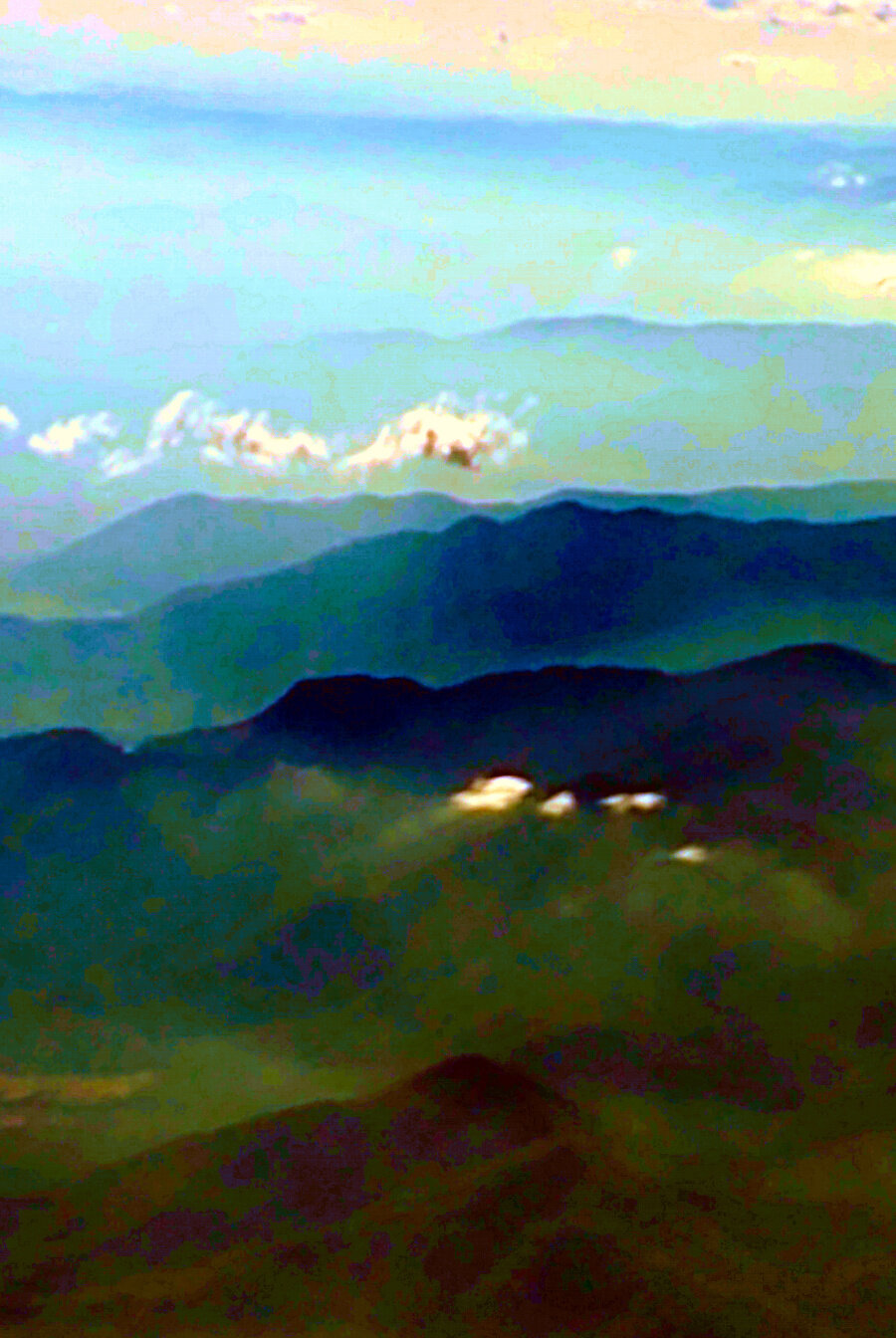
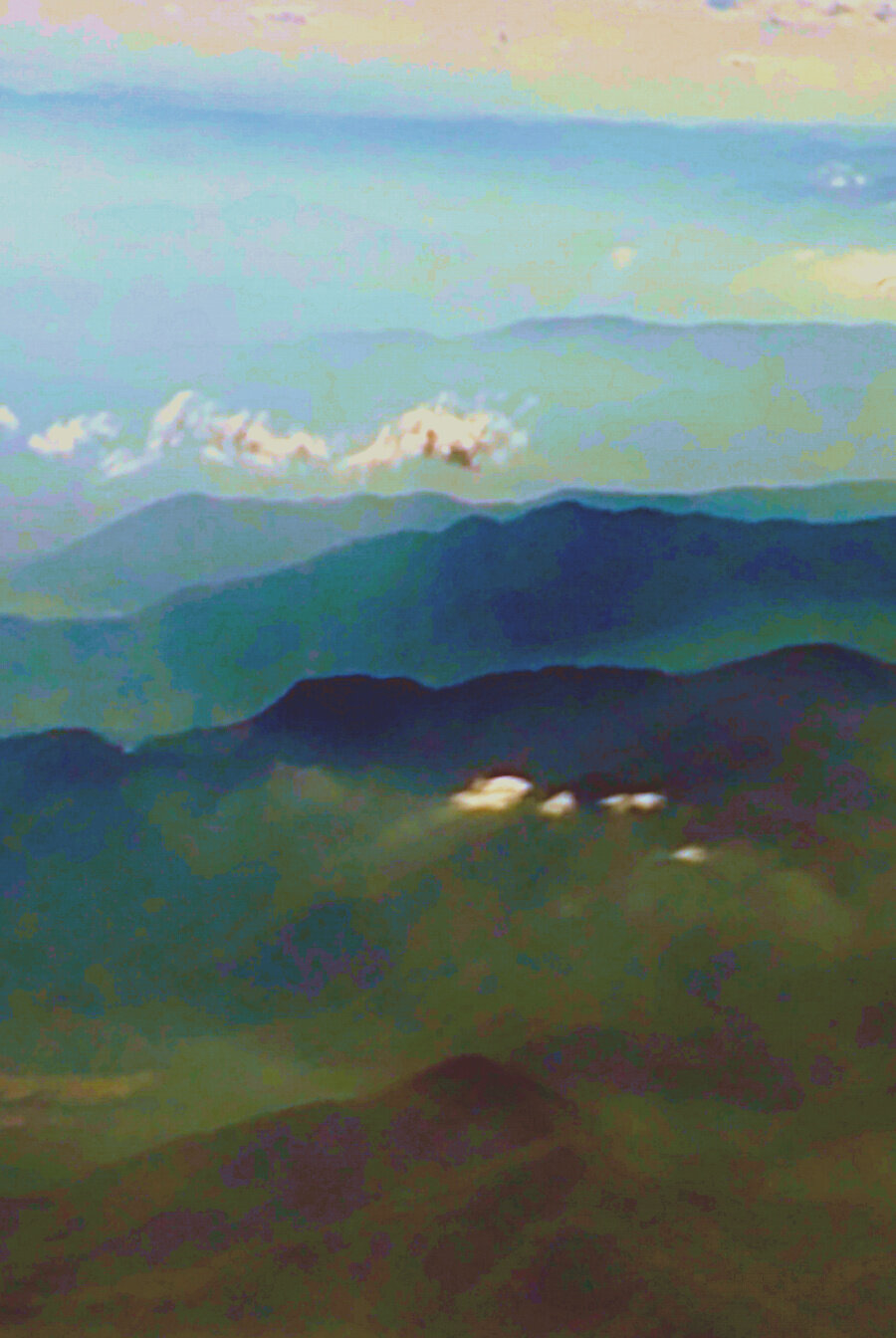
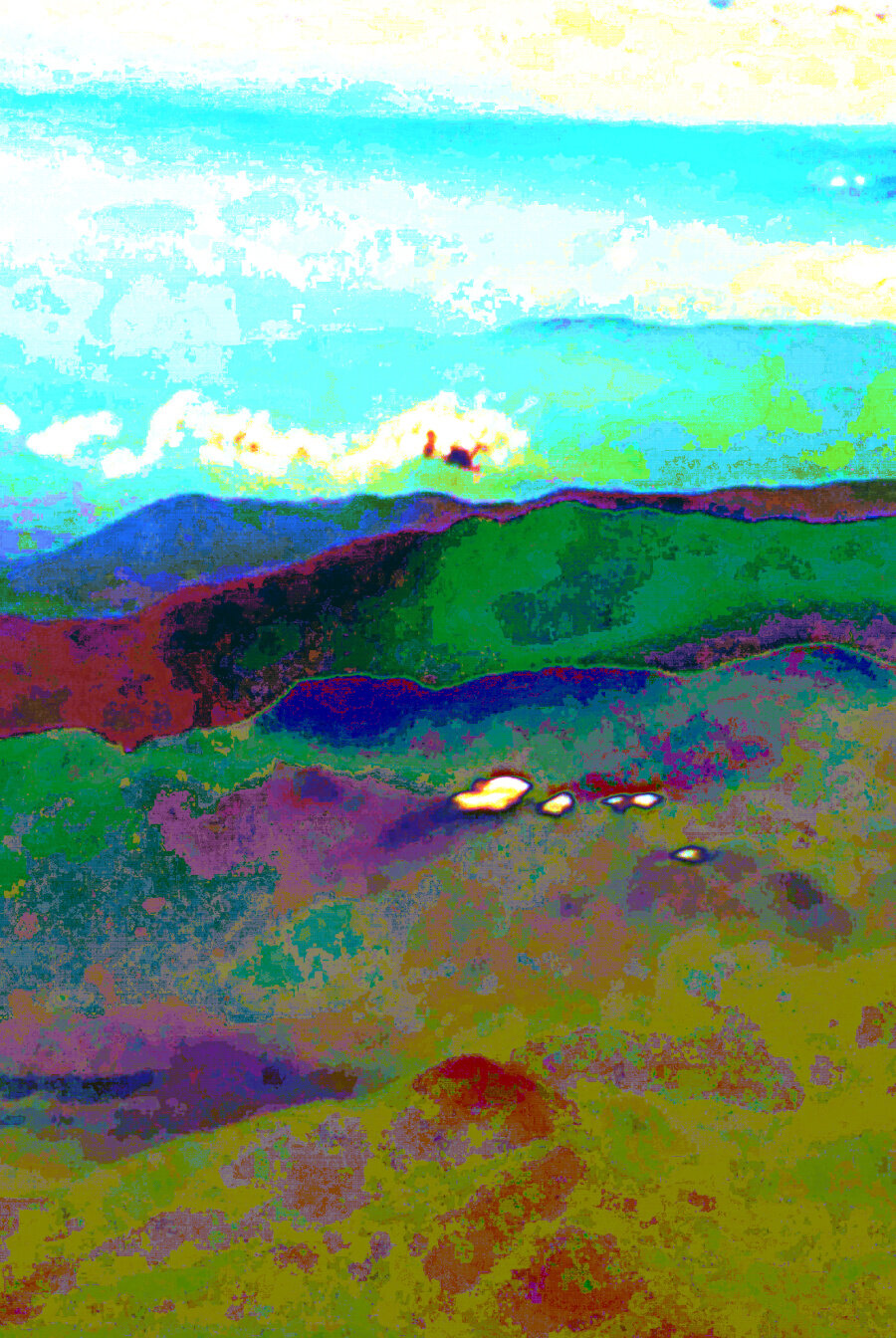
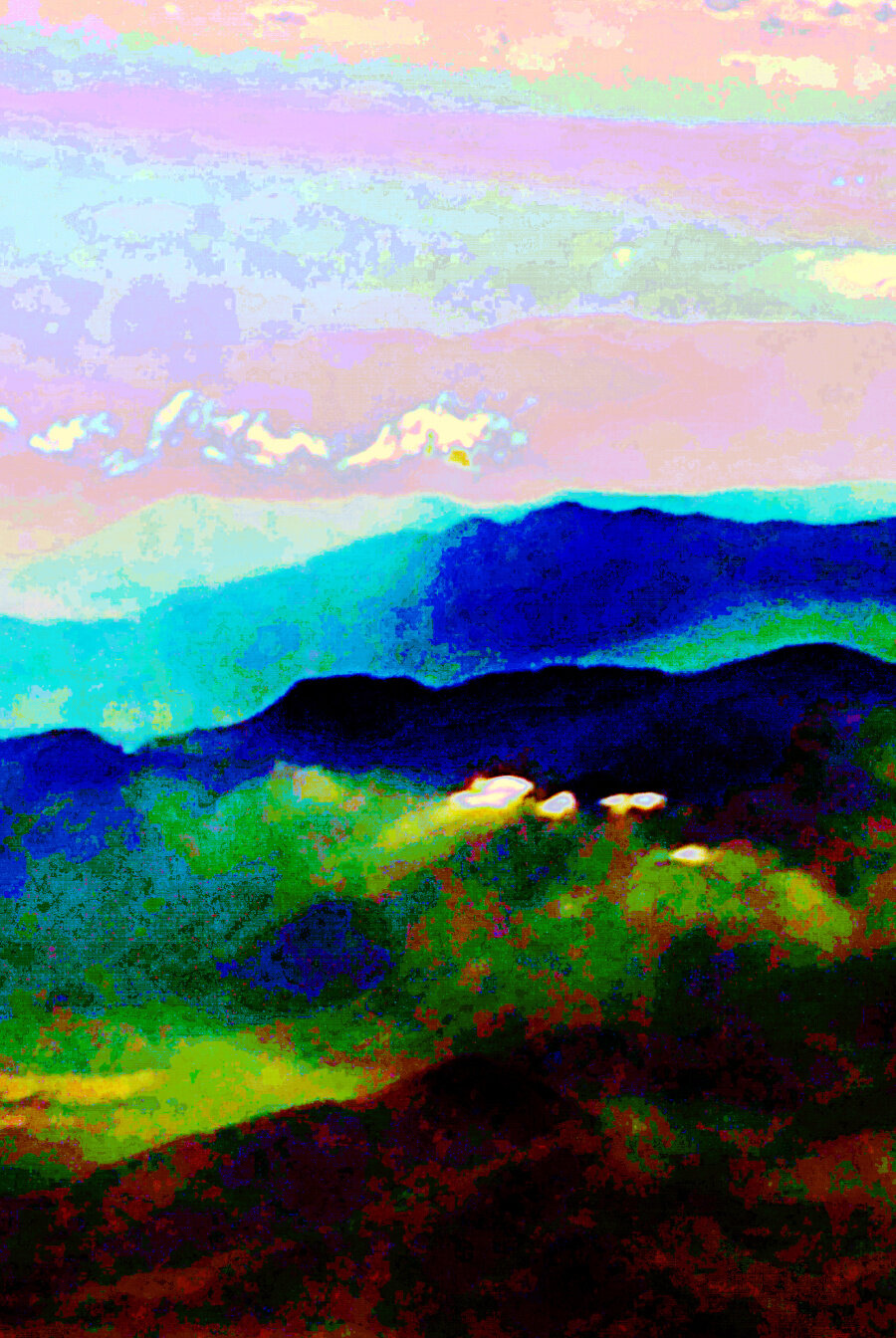
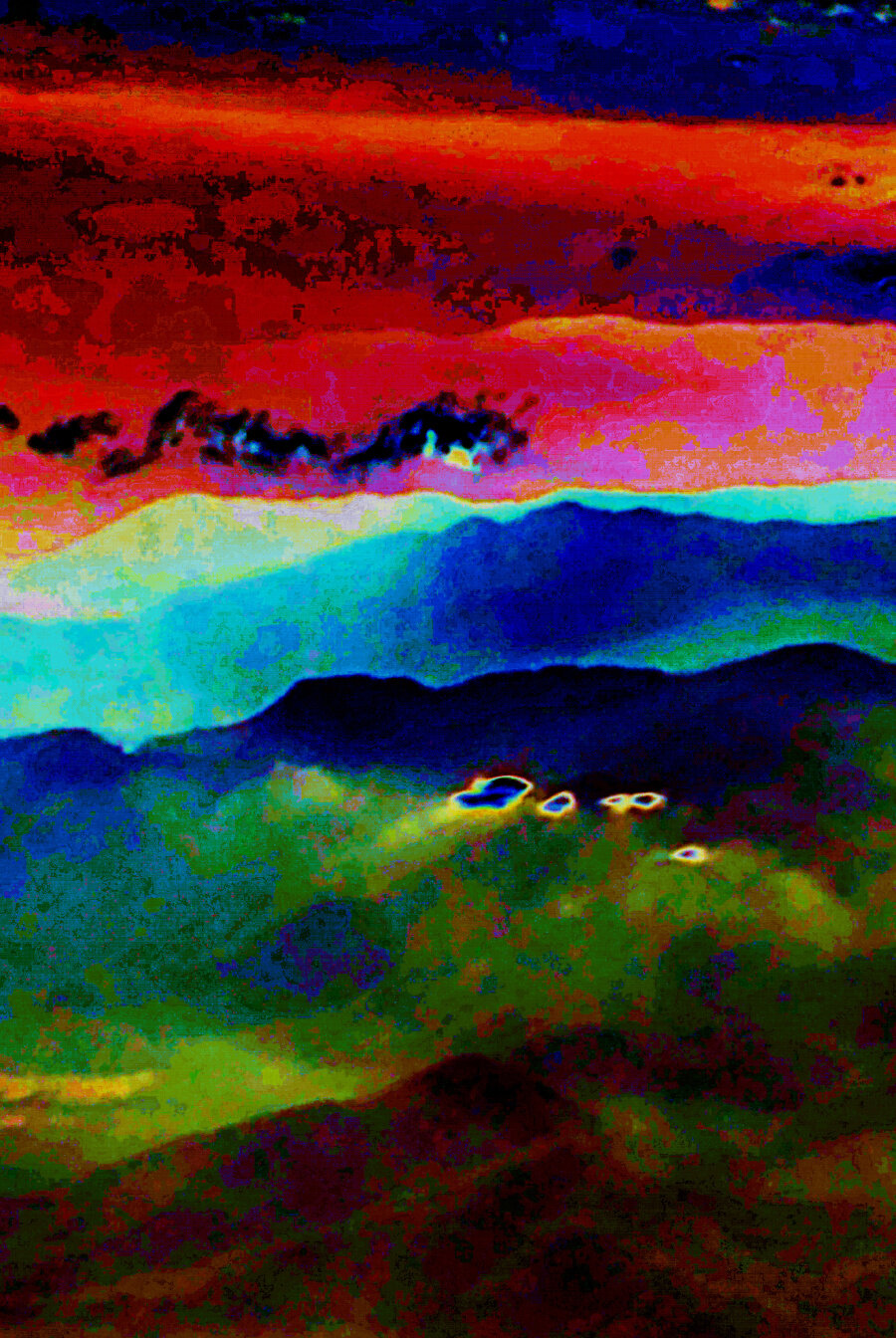
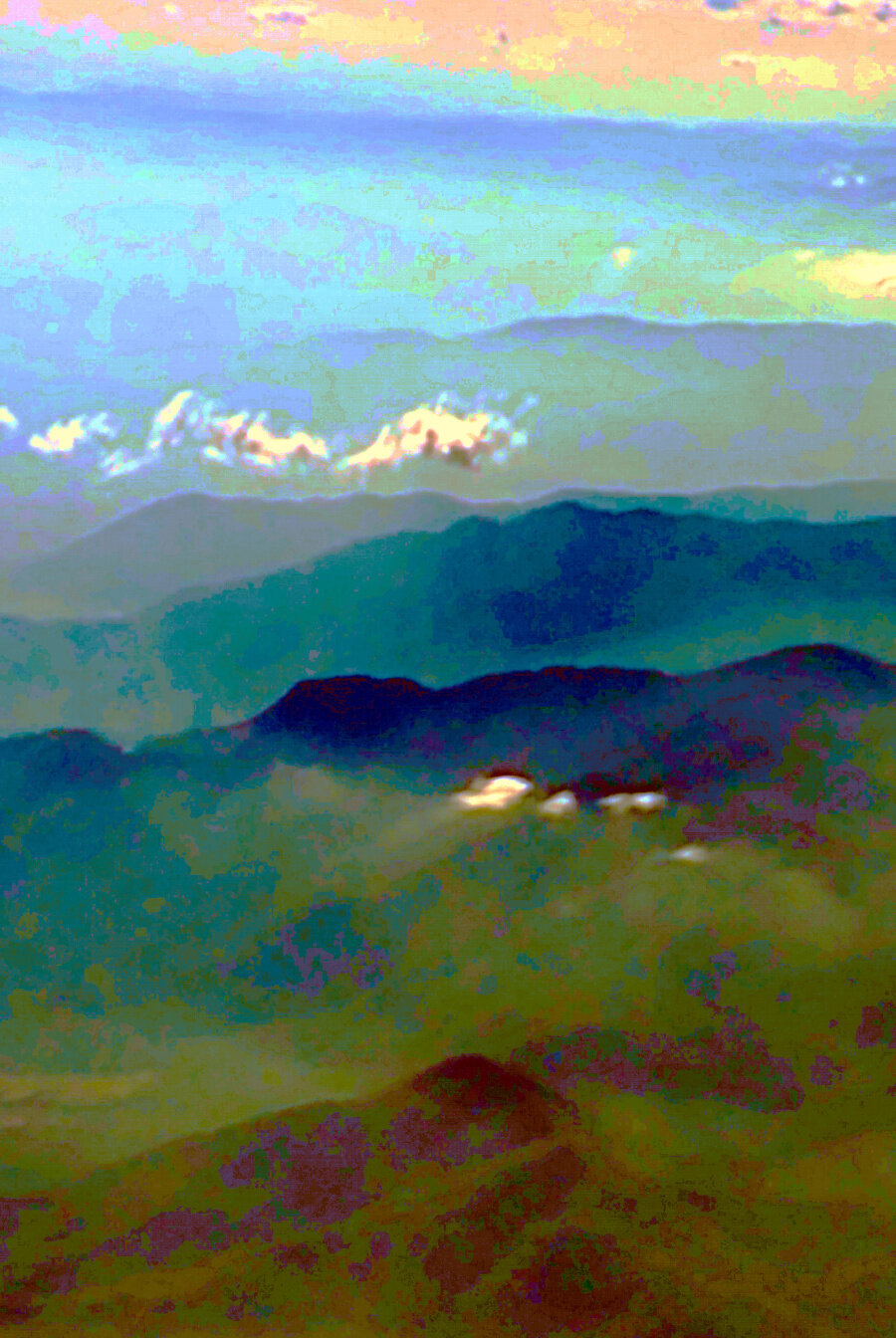
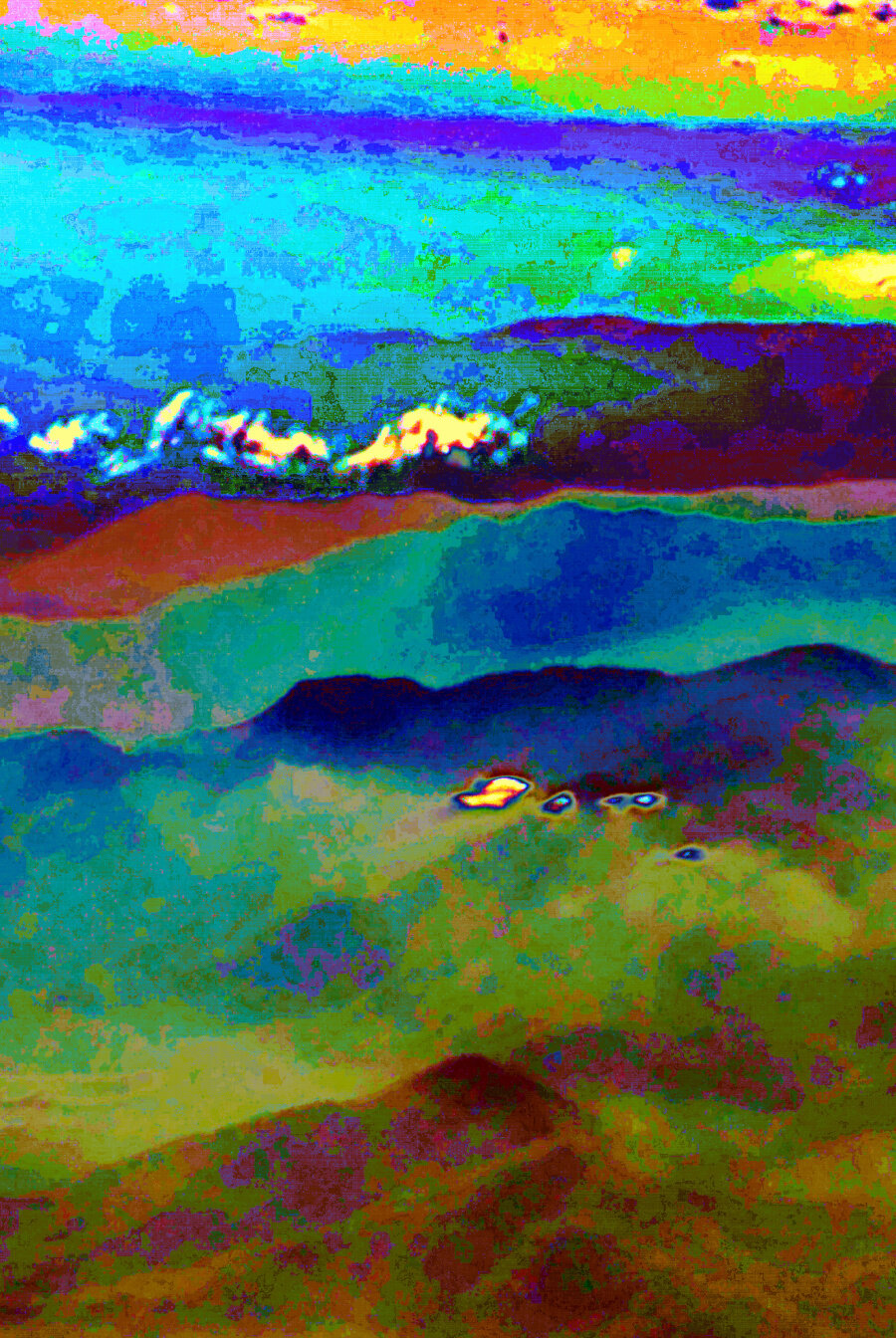
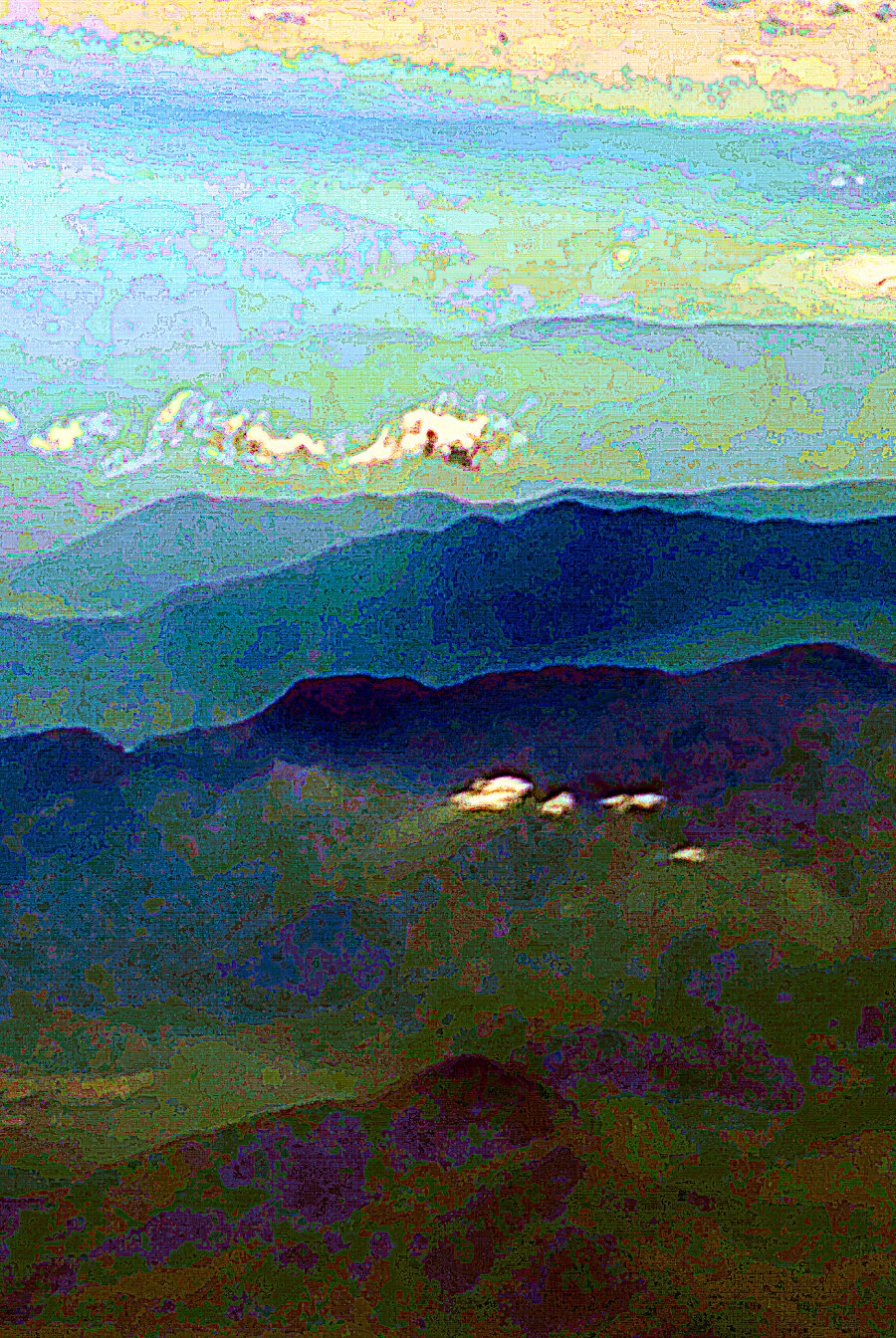
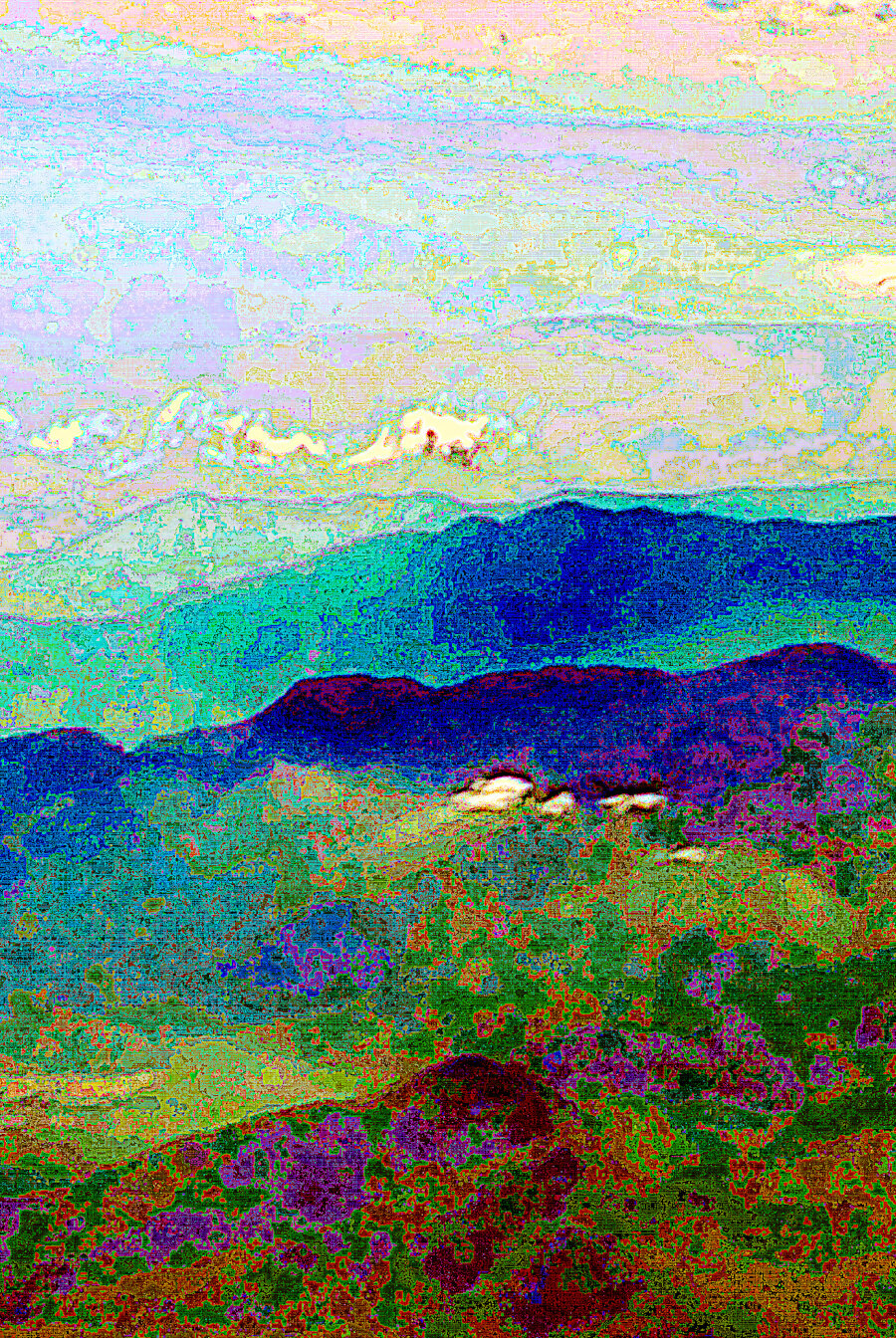
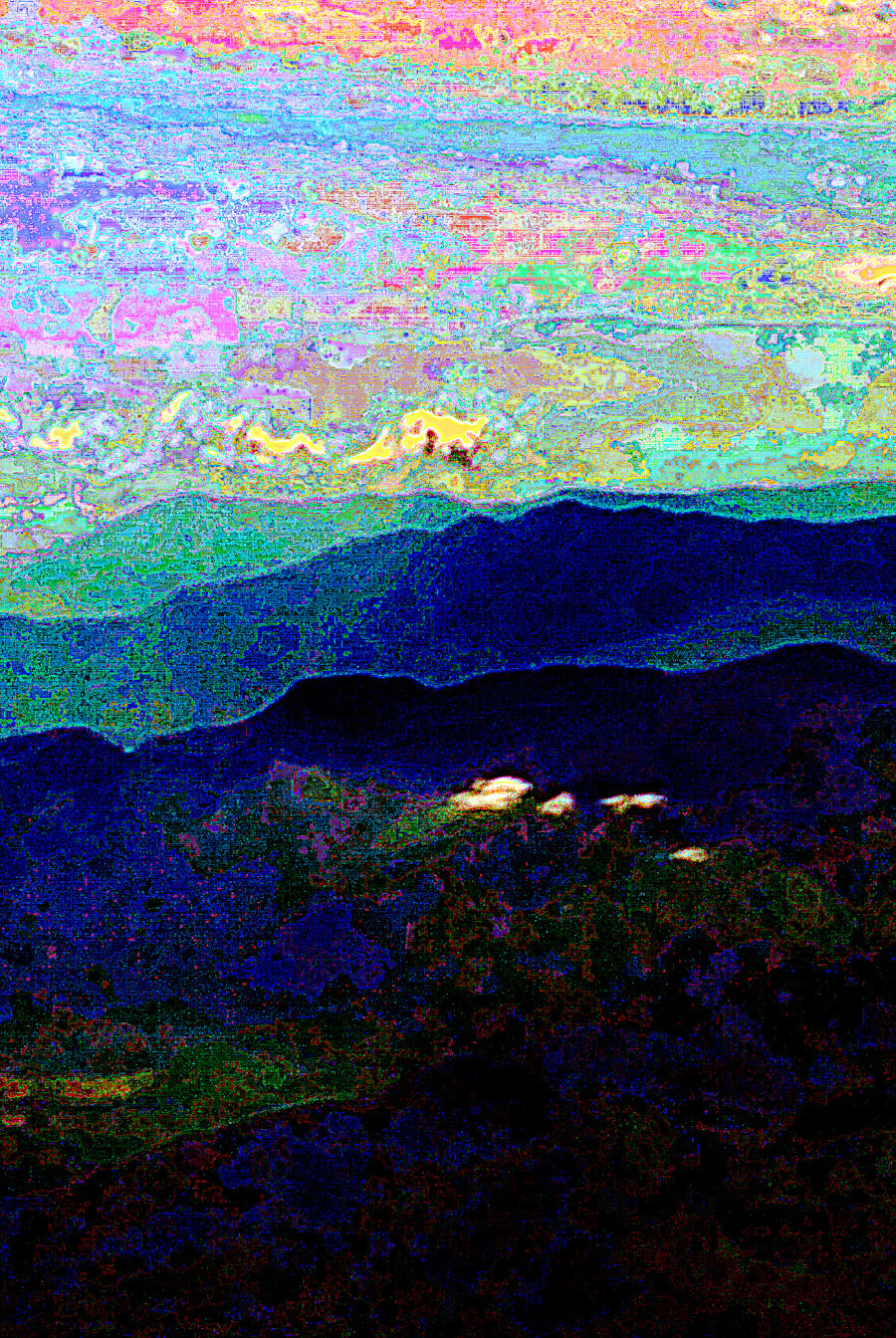
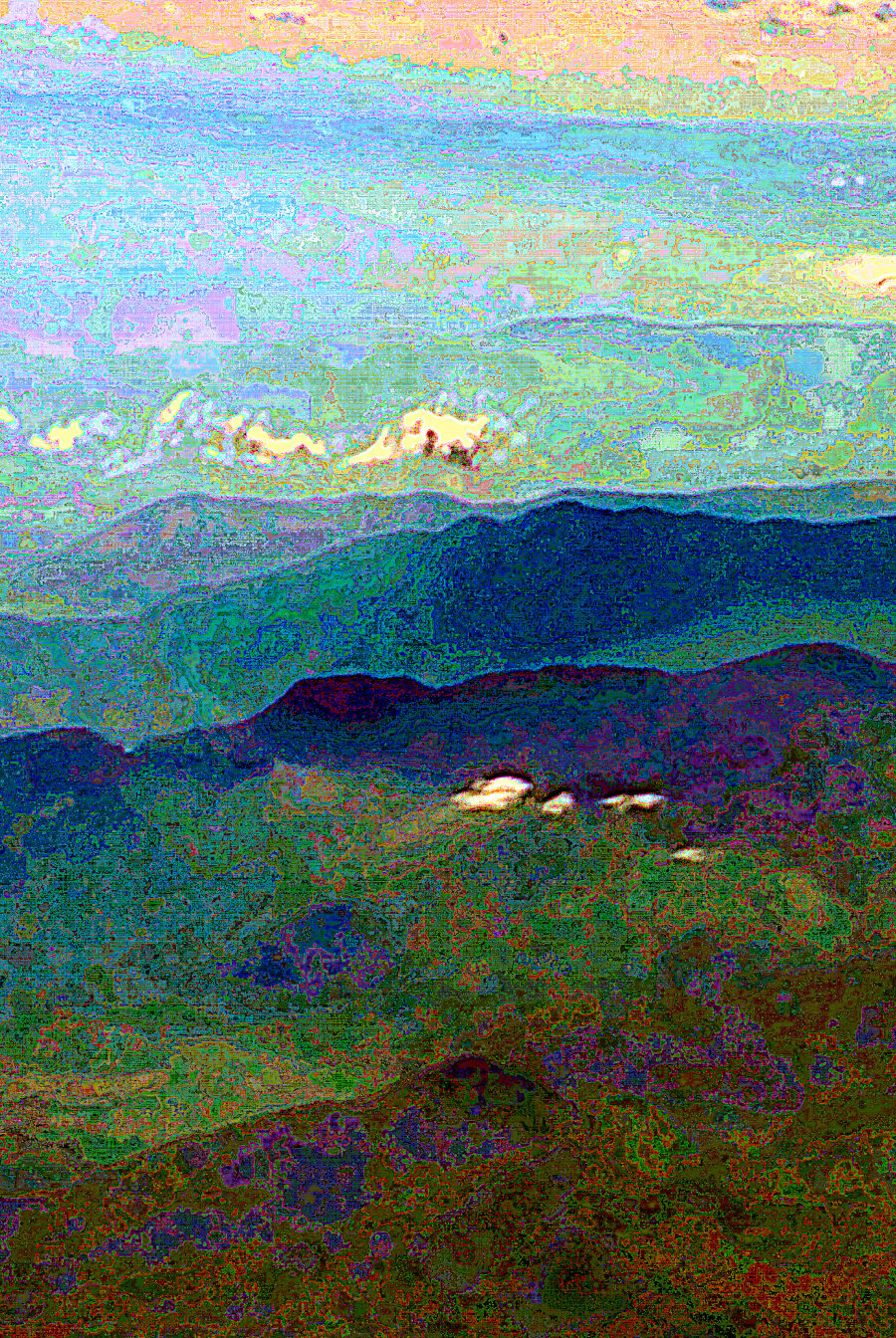
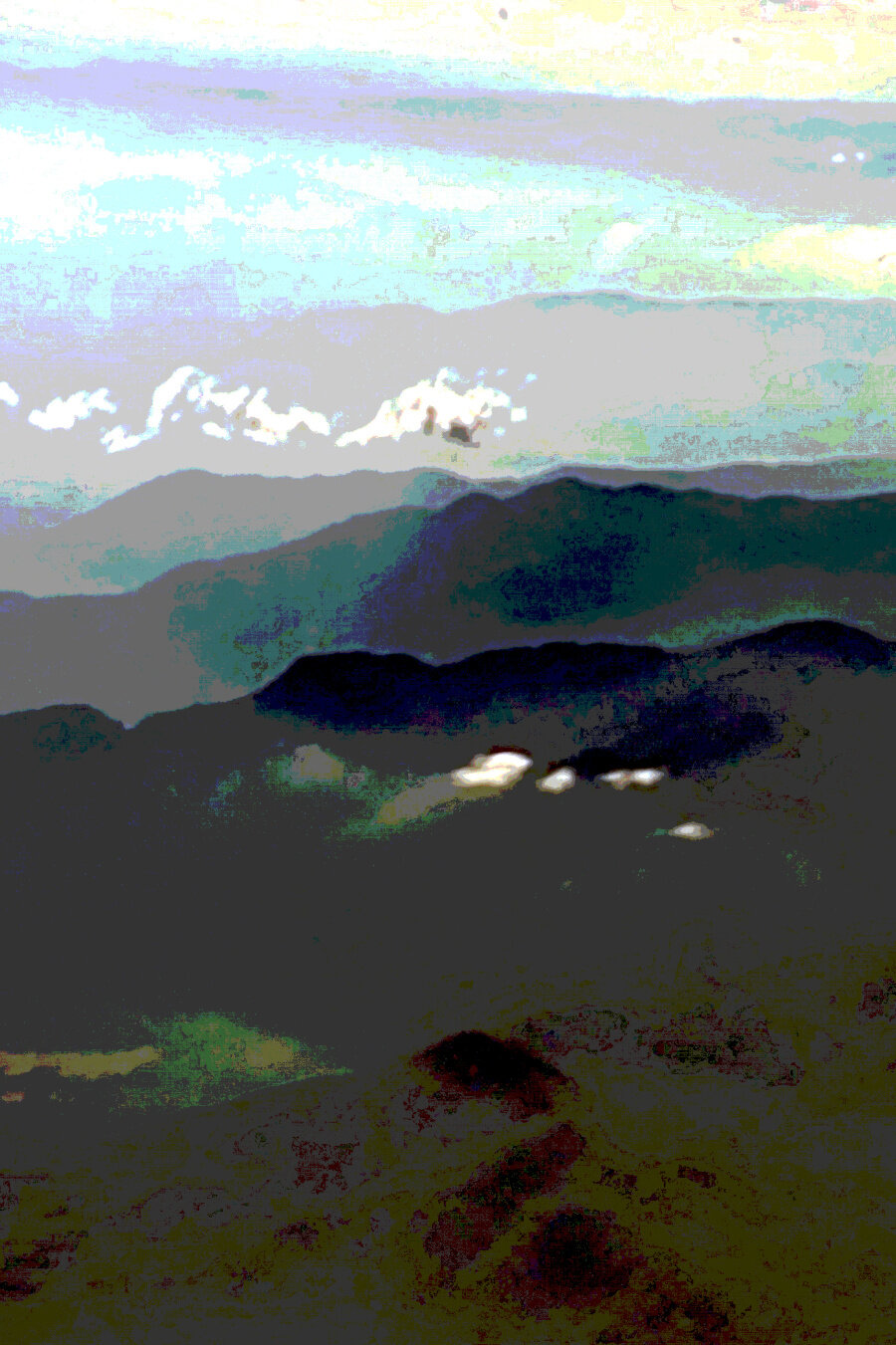
Megillat Esther: 20 illuminations
Josh and I began work on the Megillah in early January, 2017. Since then I’ve kept a fairly careful log of my illumination work. Last week I crossed the 500 hour mark at about the same time as completing my 20th illumination. Here’s a group portrait:
